 08/06/2010 14:22 08/06/2010 14:22 |
|
| | | OFFLINE | | Post: 20.351
Post: 2.991 | Registrato il: 28/08/2005
Registrato il: 20/01/2009 | Administratore | Utente Veteran | |
|


 Please see preceding page for items posted earlier today, 6/8/10.
Please see preceding page for items posted earlier today, 6/8/10.
 June 8, Tuesday, 10th Week of Ordinary Time
June 8, Tuesday, 10th Week of Ordinary Time
 ST WILLIAM OF YORK (England, born late 11th-cent, d 1174), Monk and Bishop
ST WILLIAM OF YORK (England, born late 11th-cent, d 1174), Monk and Bishop
William Fitzherbert was born into a powerful family - an uncle was second in line for the English throne - and was first named Archbishop
of York in 1140, a nomination contested by some of the local clergy who accused him of simony, sins against chastity, and being an
instrument of the royal court. Pope Innocent II had these investigated and eventually confirmed him. William immediately undertook
reforms in the clergy, but when he went to Rome to get his pallium as Archbishop, new opposition arose, particularly from the Cistercians
in England, who had the support of their superior general at the time, Bernard of Clairvaux. A new Pope, Eugenius III, a Cistercian
Himself and great friend of Bernard, upheld his fellow Cistercians and William retired to a monastery in Winchester where he lived a
life of piety and penance. The next Pope, Anastasius IV. restituted William as Archbishop of York. His return to York was triumphal.
During the procession, the bridge across the Ouse River collapsed but miraculously no one died. Unfortunately, two months after his
return, William died. It was thought poison had been placed in the wine he used at Mass. After his death, many miracles were attributed
to him, and a sweet smell emanated from his tomb. Pope Honorius II had the miracles investigated and canonized him in 1226.
Readings for today's Mass:
www.usccb.org/nab/readings/060810.shtml
OR for 6/7-6/8:
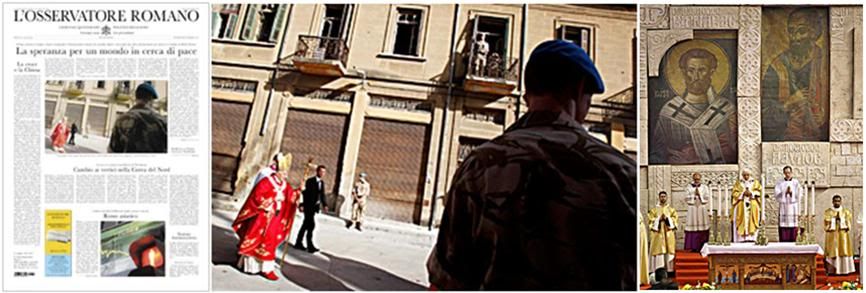

The Pope ends Cyprus visit by consigning the working agenda for the coming Synodal assembly on the Middle East,
urging international efforts to resolve tensions in the Middle East:
'Hope for a world in search of peace'
This double issue devotes six other pages to reportage of the second half of the Cyprus visit. The Page 1 article is accompanied by an editorial on the Pope's homily centered on the significance of the Cross for Christians. Other Page 1 stories: North Korea's Kim Jong-Il replaces his top ministers; and Asian markets plunge with news of Hungary's financial crisis. In the inside pages, a story about the funeral service for the slain Mons. Luigi Padovese held yesterday in Turkey by the Apostolic Nuncio.
No events scheduled for the Holy Father today.
[Modificato da TERESA BENEDETTA 08/06/2010 14:23] |
| |
|
| |
 08/06/2010 17:24 08/06/2010 17:24 |
|
| | | OFFLINE | | Post: 20.352
Post: 2.992 | Registrato il: 28/08/2005
Registrato il: 20/01/2009 | Administratore | Utente Veteran | |
|

 FINAL WEEK OF
FINAL WEEK OF
THE YEAR FOR PRIESTS
This is a signal week for all Catholic priests, as the Year for Priests comes to a close - a special year decreed by Pope Benedict XVI in his desire to renew the priesthood worldwide. It came after 45 years of a qualitative change in the training and orthodoxy of priests that followed Vatican II and its widespread misinterpretation that was promptly assimilated throughout the Church.
[Personally, I think this promptness was because the liberal interpretation is so obviously the easier way to follow, since it indulges personal wishes over the Way of the Cross that sanctified Tradition teaches is man's path on earth.
If Christ could make the ultimate sacrifice, why can't priests, who after all chose to follow Christ into priesthood, not make the far smaller sacrifices of day-to-day life as a priest, not just arising from chastity and poverty but from obedience - subjecting one's will to the Church and ultimately to God?]
The Holy Father, who has always been recognized as a model priest and genuninely holy man even during his quarter-century as a university professor, has given some of his most personal discourses and homilies as Pope on the subject of the priesthood in an obvious desire to remind all priests what it truly means to be a priest.
The Year for Priests was an inspired initiative, and it will always be the greatest irony that Chapter 2 of the Worldwide Media Scandal over Abusive Priests (Chapter 1 came eight years before, with the US scandals) came midway through the year.
That Benedict XVI decreed a Year for Priests before the recent media fanfaronnade shows how deeply concerned he is about the spiritual state of priests in the Universal Church. He did not need pressure from anyone, least of all the media, to act in a visible worldwide manner on that concern.
And he made the Catholic world aware as never before of St. Jean-Marie Vianney, whom he proposed as inspiration and human model for all priests.
Here is the program this week:
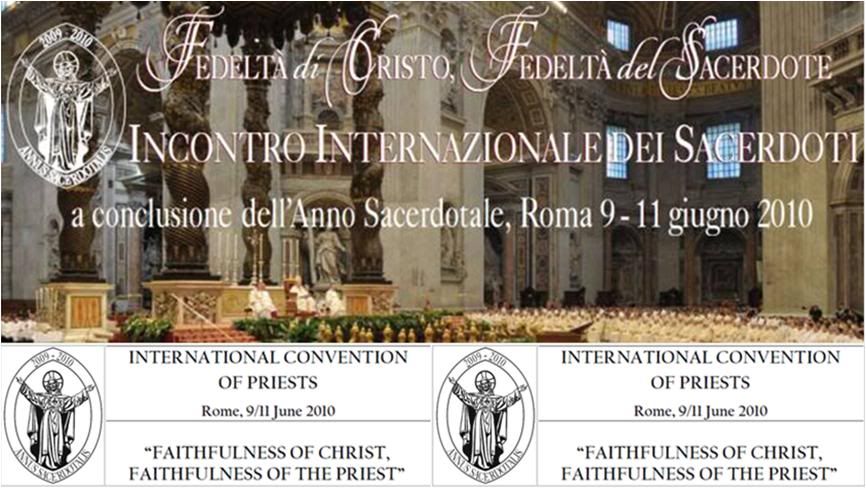
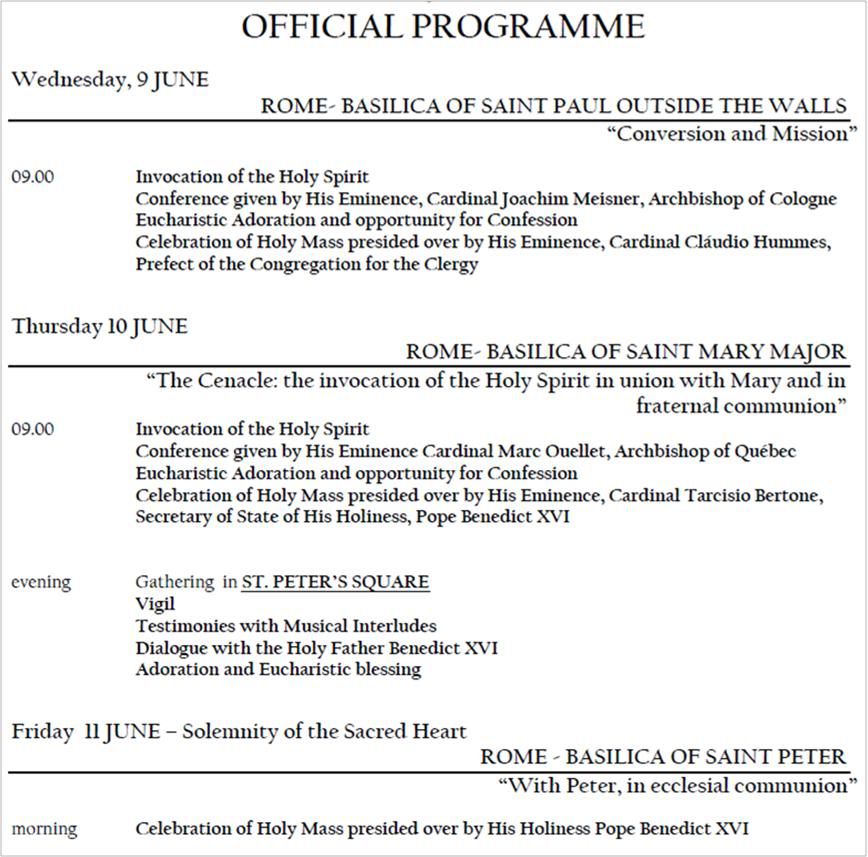 Even as the Year for Priests formally comes to an end, may it be a year for priests every year in terms of prayers and support from the faithful, and in terms of genuine commitment and recommitment to Christ on the part of priests and bishops.
Very apropos is this editorial from the June-July issue of Homiletic and Pastoral Review.
The holiness of priests
Even as the Year for Priests formally comes to an end, may it be a year for priests every year in terms of prayers and support from the faithful, and in terms of genuine commitment and recommitment to Christ on the part of priests and bishops.
Very apropos is this editorial from the June-July issue of Homiletic and Pastoral Review.
The holiness of priests
Editorial
by KENNETH BAKER, S.J.
Emeritus Editor

June/July 2010
Recently I was re-reading Archbishop Fulton J. Sheen’s book Those Mysterious Priests(1974), published five years before his death on December 9, 1979. In Chapter 7 he talks about how the priest continues the Incarnation of God by sharing in the three offices of Christ—to teach, to sanctify and to lead.
He makes the same point that Pope Benedict XVI made last March when he announced the current “Year for Priests.” He says, and offers reasons to prove, that the effectiveness of the Catholic priest is directly related to and depends on his personal holiness.
The Pope said that the first reason for the special year for priests is to encourage them to strive for holiness and spiritual perfection because the effectiveness of their ministry depends on that.
It should be quite obvious that the holier the priest is, the more he will be able to help others to grow in the knowledge and love of Jesus Christ. This follows logically from the simple and profound fundamental principle that “No one can give what he does not have” (Latin: Nemo dat quod non habet).
We learned that in first-year philosophy. It was true then and it is true now and always will be true. If a priest is not burning with love for Christ, he may be a good administrator or teacher but he will not inspire others to strive for holiness. [All dissident and liberal priests who are always patting themselves on the back for 'standing up to Rome' should ask themselves whether they have striven for holiness or for selfish vainglory!]
Sheen says that the priest as an ambassador for Christ, as an instrument of Christ, is sent into the world to convert it to faith in him and the living God. But the priest cannot preach Christ and give him to others if he is not dwelling already in the heart of the priest.
Saints and martyrs in the history of the Church are good examples of this. A few who come to mind are St. Pius X, Pope Pius XII, Blessed Pope John XXIII, John Paul II, Fr. Patrick Peyton (the “Rosary priest”) and Archbishop Fulton J. Sheen, to mention just a few.
They were effective because they were burning with love of Jesus Christ and, like St. Paul, they preached Christ crucified. They also preached that we worship Jesus in the liturgy and in our prayers because he is God incarnate.
[But unlike St. Paul, dissident priests when they do remember to preach about Christ and not about political action, do not preach 'Christ crucified' at all - they preach the 'Christ-political activist' they have created in their minds to justify their political activism. In this sense, they are misusing religion and Christ just as badly as Islamist fundamentalists do.]
Pope Benedict, when he declared the “Year for Priests” last March, said that God is the treasure people seek from the priest. He must bring God to them and through the Gospel show them that Jesus is God and the answer to their deepest desires.
The vast majority of the faithful do not seek direction from priests in matters of politics, economics and the environment. Priests are not expected to be experts in secular affairs. Catholics expect their priests to radiate Christ — to teach them how to know and love God and to give them some guidance in living according to God’s holy will. [Orthodox Catholics do, but liberal Catholics appear to consider priests above all, or even exclusively, as fellow political activists who can help them push their ultimately anti-Church agenda.]
Sheen says something similar in the book mentioned above. On page 87 he writes: “He (i.e., the priest) will inspire others only inasmuch as he is consecrated or made holy in the truth. Ardeat orator qui vult accendere plebem”. Thus, if the priest is not burning with love for God, he will not move others to love God.
Jesus tells us in the great Sermon on the Mount, “Be perfect as your heavenly Father is perfect” (Matt. 5:48). The advice is directed to all Christians, but especially to priests.
In order to properly strive for perfection the priest must be a man of prayer; he must love Jesus and spend time with him before the Blessed Sacrament. It is for this reason that Archbishop Sheen constantly urged priests to spend a Holy Hour each day before the Blessed Sacrament. Sheen did that for over fifty years. That is probably the reason for his great effectiveness as preacher.
A good model for all priests is St. John Vianney, the Curé of Ars, who spent most of his time every day in church either praying or administering the sacraments.
Like St. John, the priest must dedicate himself to the service of others by preaching, offering Mass, hearing confessions, counseling and helping those in need.
Priests who do that gradually increase in holiness and become very effective ambassadors for Christ, like St. Paul, the Curé of Ars, John Paul II and Benedict XVI.
[Modificato da TERESA BENEDETTA 08/06/2010 23:26] |
| |
 08/06/2010 18:50 08/06/2010 18:50 |
|
| | | OFFLINE | | Post: 20.353
Post: 2.993 | Registrato il: 28/08/2005
Registrato il: 20/01/2009 | Administratore | Utente Veteran | |
|

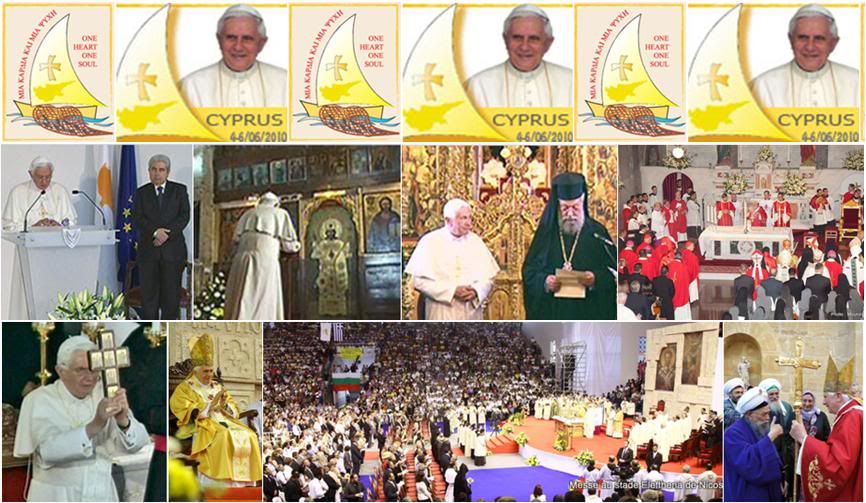
 There's a ton of commentary in the Italian media about the Pope's visit to Cyprus, which attracted little attention in the Anglophone media. For instance, the New York Times sent its Rome correspondent along on the papal flight but she only filed one story from Cyprus; the London Times did not carry any story on it; the UK Daily Telegraph, the Washington Post and the Los Angeles Times all made do with the AP stories filed after the Mass at which the Synodal agenda was presented - but only because it had to do with the Middle East. And the blogosphere has generally ignored the event, as well.
There's a ton of commentary in the Italian media about the Pope's visit to Cyprus, which attracted little attention in the Anglophone media. For instance, the New York Times sent its Rome correspondent along on the papal flight but she only filed one story from Cyprus; the London Times did not carry any story on it; the UK Daily Telegraph, the Washington Post and the Los Angeles Times all made do with the AP stories filed after the Mass at which the Synodal agenda was presented - but only because it had to do with the Middle East. And the blogosphere has generally ignored the event, as well.
Say what you will about the Italian newspapers and their general anti-Church position, they consider the Pope's apostolic visits in Italy and abroad as major events. Until I can translate a couple of the best commentaries, here is one in English from the host country itself:
Papal visit a huge success, but
it won’t help the Cyprus problem
Editorial

Published on June 8, 2010
State authorities must be congratulated for the impeccable organisation for the Pope’s visit. Everything went according to schedule and there were no embarrassing glitches – if there were, these were very promptly dealt with – while the tiny number of people protesting about the visit was not allowed to cause any disruption.
A huge security operation, involving more than a thousand policemen assisted by UNFICYP, was under way from Friday, when Pope Benedict XVI arrived in Paphos, until his departure on Sunday. Police ensured all public gatherings were orderly and the crowd control measures proved very effective.
Media predictions that large groups of anti-Catholic protestors would disrupt proceedings proved wildly exaggerated. Half a dozen had gathered outside a Paphos church the Pope’s convoy passed on Friday and about 20 protestors holding placards, labelling the Pope a heretic, stood across the road from Eleftheria Stadium where he held a Sunday morning mass.
This was the sum total of the people who bothered to protest about the visit. Archbishop Chrysostomos also ensured that certain senior clerics, who had objected to the visit, were on their best behaviour.
Despite media-generated fears, the Pope was given a warm and friendly welcome, and there were plenty of people of the Orthodox faith who turned up at the public gatherings to see him.
Inevitably, there were attempts to score points on the Cyprus problem, with the government spokesman saying yesterday the Pontiff had shown great interest in the destruction of churches in the north. Would the Vatican help to protect these churches, asked a journalist at yesterday’s briefing, but the spokesman avoided giving a straight answer.
As was expected, the Pope spoke about the need for reconciliation and the re-unification of the country as this the only way “to build a better and more secure future for your children”. Reconciliation, through Muslims and Christians working together would set a fine example to other parts of the world, he pointed out.
He also expressed his gratitude to the President, the government and the state authorities “for everything they had done to make the visit unforgettable and very successful”.
The government should be pleased for these kind words of thanks and put the Cyprus problem aside. Nothing changed because the visit brought attention to the island’s division as the spokesman claimed.
The real benefit of the visit for Cyprus was that it showed that the authorities were capable of handling a high-profile visit, with major security demands efficiently and professionally.
It also gave Cyprus exposure all over the world. This may help the tourism industry, but it will not make the slightest bit of difference on the Cyprus problem as some have naively claimed. [Nor was it expected to, least of all by the Pope, who is surely practical enough to have no illusions about the immediate effect of anything he has to say about world problems, but perseveres nonetheless in saying what needs to be said, as often as he can, because if he does not, then who will?]
Let me translate the OR editorial and commentary first, if only for the record, since as usual, the Pope is better served with his own words in full text and context, and not merely paraphrased or choppily cited:
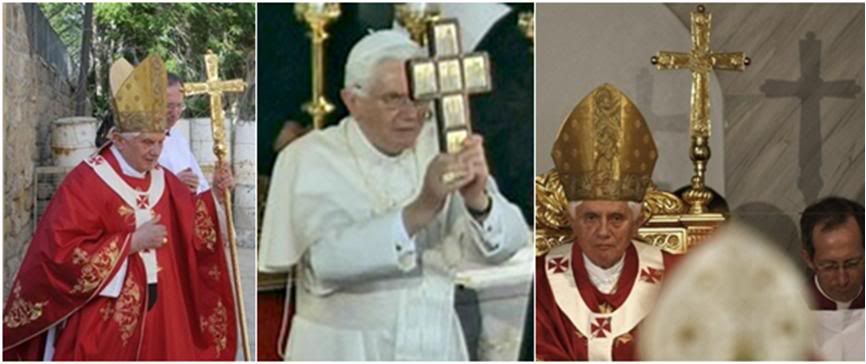 The Cross and the Church
The Cross and the Church
Editorial
by Giovanni Maria Vian
Translated from
the 6/7-6/8 issue of

Benedict XVI's visit to Cyprus was a memorable success, as the Pope himself said in bidding farewell to the host nation. As always, the words were carefully chosen and do not refer only to its external success of teh visit, which is undeniable, but above all, to its more profound significance.
The sixteenth international trip of this Pontificate - which had been presented explicitly as a continuation of his visit to the Holy Land last year - was important, above all, for the Mediterranean's third largest island itself, which is observing the Golden Jubilee of its independence but continues to suffer from an unnatural division.
A division underscored by the very location of the Apostolic Nunciature in Nicosia, where the Pope stayed, and which is located in the buffer zone under UN peacekeeping forces in the heart of a divided capital.
But the importance of the visit, to an Orthodox country, was historical for furthering the rapprochement with an authoritative and venerable sister Church which, under the leadership of Archbishop Chrysostomos II, has taken the ecumenical path decisively.
This is an internal development among the Christian confessions which is also an indication for the future of the region - the troubled and often bloodied Near and Middle East, where the only realistic prospect for a real and lasting peace is a constructive trialog among Christians, Muslims and Jews.
It is a positive sign in the face of the continual eruption of violence arising from seemingly insurmountable conflicts - and even in the shadow of a horrible event like the assassination in Turkey of Mons. Luigi Padovese, courageous witness to Christ's truth and peace.
It is the mystery of the Cross that Benedict XVI spoke about in his homily at the Holy Cross Church in Nicosia, reminding the faithful that first of all, man cannot save himself from the consequences of his own sins. And that the Cross is not so much a sign of suffering and failure, as it was originally intended [by those whod devised the punishment] but the most eloquent symbol which the world needs today.
And that, precisely because it expresses Christ's victory over every evil, including the 'last enemy', death - and that therefore, he is the true hope who will never disappoint.
The Pope, in his gently forceful way, said that in the Middle East today, this hope is radiated by every Christian who embraces the Cross and trusts in its mysterious power, by not abandoning, despite difficulties and growing persecution, the places where the Church was born and flourished in its early centuries.
According to a tradition that goes back to the Apostles, Catholics and Christians - and whoever has at heart the rights of man, starting with his freedom of conscience, religion and worship - should never forget their brothers who live in that part of the world.
It is to them and their beleaguered local Churches that the coming special Assembly of the Bishops' Synod is dedicated, whose working agenda was handed by the Pope to the leaders of these Churches gathered around him inCyprus.
The text confirms the realism of the Church and its readiness to build societies where peaceful coexistence is truly possible again. Thanks to the mystery of the Cross, sign of the hope Christ bears and to which the Church bears witness to the world.
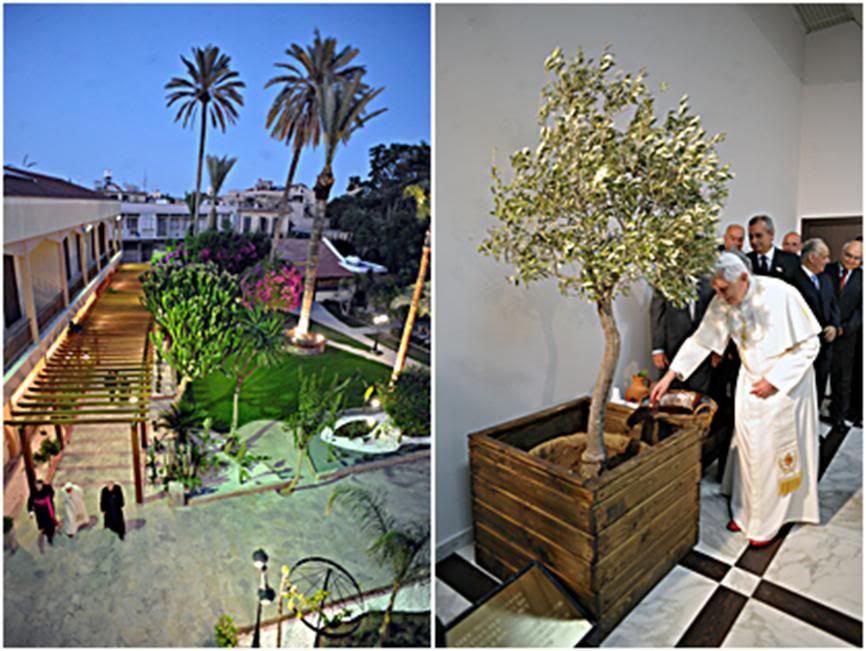 Left, the Holy Father in the garden of the Franciscan convent housing the Apostolic Nunciature in Cyprus; right, with the olive tree that the government of Cyprus will plant to commemorate his visit.
The lead story on Page 1 of the OR today:
'Hope for a world in search of peace'
Left, the Holy Father in the garden of the Franciscan convent housing the Apostolic Nunciature in Cyprus; right, with the olive tree that the government of Cyprus will plant to commemorate his visit.
The lead story on Page 1 of the OR today:
'Hope for a world in search of peace'
The Pope ends his visit to Cyprus, consigning
the working agenda for the coming Synodal assembly on the Middle East,
and urges international efforts to resolve tensions in the region
By Mario Ponzi
Translated from
the 6/7-6/8 issue of


The 'sad division' of Cyprus is a symbol of the tensions and conflicts which continue to tragically tear apart the Middle East. It was visible to the Pope during his three days on the island.
He experienced it himself during his stay at the Apostolic Nunciature located in the buffer zone of Nicosia under the control of United Nations peacekeeping forces. And he heard it first hand from refugees who had fled the Turkish-occupied northern region of the island.
Thus, when he bid Cyprus farewell, on Sunday afternoon, June 6, he evoked this 'sad division' expressly, voicing his fervent hope for 'a better and more secure future' for Cyprus, one founded on truth, reconciliation and mutual respect among all Cypriots, whether of Greek or Turkish descent.
A statement that re-echoed what he said earlier in the day at the Mass in Eleftheria stadium, when he denounced the suffering of Christians in the Middle East and called again for 'urgent and concerted international effort (to find) just and lasting solutions" to the conflicts that continually inflame the Middle East - "before such conflicts lead to further bloodshed".
Clear and explicit words that accompanied the Pope's consignment of the Instrumentum laboris for the Special Assembly for the Middle East of the Bishops' Synod this October at the Vatican, to prelates of the Churches of the region and other organizations involved in preparing for the assembly.
A text prepared by, among others, Mons. Luigi Padovese, the Apostolic Vicar in Anatolia, who was assassinated Thursday morning on the eve of the Pope's departure for Cyprus. The Pope remembered him with moving words to the Eleftheria congregation, asking them to see his death as "a clear reminder that all Christians are called on to be, in every circumstance, courageous witnesses to all that is good, noble and just".
The value of Christian witness in situations of difficulty and suffering was also underscored by the Pope in his homily to the priests, religious and laymen who attended the Mass on Saturday afternoon at the Church of the Holy Cross, sharing with them an inspired and profound meditation on the meaning of the Cross.
It is not, he said, "an instrument of torture, suffering and defeat", nor "a private symbol of devotion" or 'a badge of membership of a certain group within society".
Its meaning "has nothing to do with the forced imposition of a creed or philosophy". Rather, "it is the most eloquent symbol of hope that the world has ever seen".
In the Cross, he said, the poor, the oppressed, the sick, the marginalized, find the certainty that God "raises up the humble, gives strength to the weak, causes divisions to be overcome and defeats hate with love" - and that is why "the world needs the Cross".
Without it, "the world would be without hope, torture and brutality would remain unchecked, the weak would continue to be exploited, and greed would have the last word".
Only the Cross can put an end "to the vicious cycle of violence" and transform "the reality of sin and death into their opposites".
The following is a very well-meaning article but it makes quite a few statements that I find questionable.
Media reacts positively
to Pope's Cyprus trip
By Jesús Colina

VATICAN CITY, JUNE 8, 2010 (Zenit.org).- Benedict XVI's recent trip to Cyprus, which ended Sunday, was covered positively by media reports that picked up on his teachings and spread it worldwide.
While on this 16th international apostolic pilgrimage of his pontificate, the Pope made clear his position and commitment in favor of Christian unity, dialogue with Islam, and peace and reconciliation on the international scene.
The Mass over which he presided on Sunday in Nicosia was one of the most popular meetings in that country's history, and a significant event for the Church in Cyprus, as more than 10,000 Catholics participated.
The interest of the media was also evident, and news of the presentation of the Instrumentum laboris (working document) for the Synod of Bishops for the Middle East appeared on the front Web page of most European newspapers on Sunday. The majority of these articles had a positive tone. [This is rather disingenuous, as it was the only story about the trip that most of them carried - using news service reports - and again, only because of the political tie-up to the Middle East. Which the news agencies twisted to make it appear that the apparent blame laid on Israel for the problems of the Palestinians - articulated in the document which is based on suggestions from the Middle Eastern prelates, among whom, for instance, the Latin Patriarch of Jerusalem, a Palestinian, has never made any secret of his partisanship - was Pope Benedict's or the Holy See's official position!
The agenda set forth in the Instrumentum laboris is just that - an agenda, and if some of the Middle Eastern prelates want to air their views on the Israeli-Palestinian conflict, then the Vatican can hardly forbid them to do so. What matters eventualyl is what the Pope himself will say in his Post-Synodal Exhortation summarizing the substantive conclusions of the Synodal Assembly. ]
Jesuit Father Federico Lombardi, director of the Vatican press office, explained how Benedict XVI, in his last three trips to Malta, Portugal and Cyprus, has decisively changed the negative perception in the media regarding the sexual abuse crisis. [In the media? This time, the statement is naive. I don't recall reading such a statement from Fr. Lombardi, though!]
"What is striking," Lombardi said, "is that in just over a month and a half we have had three trips of the Pope abroad, all crowned with great success, in regard to the objectives that could be expected." [Now that is more correct!]
In Cyprus this success was seen first of all, as Father Lombardi acknowledged, in the ecumenical field, strenghtening relations with the Orthodox Church, which represents the majority religion on Cyprus.
"The embrace of peace during the Mass on Sunday between the Pope and [Orthodox Archbishop] Chrysostom II is the symbol of this meeting, which marks one more step in the long path of ecumenism, with a Church, Cyprus, which despite being numerically small, is very significant in the ecumenical movement, especially in the Orthodox realm, and very rich in initiatives," Fr. :ombardi said in a statement to newsmen before the Pope left Cyprus for Rome.
The success was even more marked because, before the visit, local media gave ample play to Orthodox voices critical of dialogue with the Catholic Church.
Giovanni Maria Vian, editor of L'Osservatore Romano, observed in an editorial: "The scope of the trip, in an Orthodox country, is historic because of the further rapprochement with an authoritative and venerable sister Church, which under the leadership of Archbishop Chrysostom II has committed itself decisively to the ecumenical path."
Progress in the dialogue with Islam is another of the decisive achievements of Benedict XVI's trip to Cyprus. [I think that is an over-statement. It was not so much progress - since he had no formal meetings with an Muslim leaders in Cyprus - as a reiteration of Benedict XVI's clear and unequivocal attitude of respect toward Islam, even before Regensburg. His brief meeting with the 89-year-old Cypriot Sufi leader was a beautifully illustrative vignette of this - as well as the sincere good will on the part of many Muslims, as represented by Sheik Nazim.]
His visit refutes those who attempt to present the Pope as an "enemy" of Islam, based on the controversy sparked by a phrase taken out of context during the Pontiff's address in Regensburg in September 2006.
The Holy Father held a press conference aboard the Papal plane as he traveled from Rome to Paphos, in which he expressed his willingness to "dialogue with Muslim brothers, who are brothers, despite the differences." His words made the front page in Mideast newspapers, as well as in the rest of the world.
Again, upon leaving the island, in his farewell in the Larnaca International Airport, Benedict XVI expressed his "hope and prayer that, together, Christians and Muslims will become a leaven for peace and reconciliation among Cypriots and serve as an example to other countries."
In a moving gesture, the Pontiff met with and embraced an elderly Sufi leader, Shaykh Nazim al-Qubrusi al-Haqqani, near the apostolic nunciature, which again received good press coverage. [In the Muslim media, perhaps, but it hardly got any notice in the Anglophone media - as unexpected and humanly compelling as it was!]
Because of the current conflict between Turkey and Cyprus since the island's division in 1974, the Pope was unable to meet with some of the top authorities of northern Cyprus. [No! It had nothing to do with Turkey. It was simply that the Pope was visiting Cyprus on the invitation of the official and legitimate Republic of Cyprus - which was geographically reduced by the 1974 Turksih invasion of northern Turkey to the largely Greek Cypriot part of the island. It would have been terribly improper - and a blatant breach of protocol - to arrange to meet your host's 'enemy' under the circumstances! The Pope has visited Turkey itself, and Turkey and the Turkish Cypriots know the Church supports reconciliation without favoring one side over the other.]
In general, international leaders have avoided Cyprus due to a fear of upsetting relations with Turkey and Greece, given the division the island has endured since 1974.
Benedict XVI, who visited Turkey in 2006, did not hesitate to visit Cyprus, despite difficult circumstances following the death of Turkish citizens who were part of the Gaza Freedom Flotilla, which sought to break through the Israeli blockade on May 31. [The incident did not directly impact the Holy See at all nor its relations to Turkey in any way - so why would it have had any bearing on the Pope's trip?]
As well, on the eve of the Papal trip, Bishop Luigi Padovese, president of the Turkish bishops' conference, who was to meet with the Pope in Cyprus, was murdered by his driver. Yet, after hearing this news, Father Lombardi affirmed that the Holy Father would stick to his plan without altering his itinerary. [To begin with, it was unreasonable for anyone to think that the murder of Mons. Padovese, as tragic as it was, would have changed plans that all sides had been working on for almost a year. The late bishop himself would have been appalled that anyone could possibly think that at all!]
The Vatican spokesman recalled: "The authorities, both political as well as religious, energetically presented their expectations, their problems linked to the situation of the divided island, and the risk of losing the Christian cultural patrimony. They did so with much clarity, taking advantage of the opportunity of having such an important guest."
He noted that "the Pope responded with great balance and clarity, supporting the fundamental principles of coexistence: respect for the rights of the human person and the right to return to places of origin, to communicate with those they have had to leave behind, the right to religious liberty, to the liberty of conscience, to the liberty of worship."
Vian commented on an address the Pontiff gave to civil authorities and the diplomatic corps in Cyprus, noting that he "launched to the international community a new and intense appeal to reason, with an objective that can be understood and accepted by all, beyond any division: to serve the common good."
The media's reaction to Benedict XVI's Cyprus trip was generally positive, as it was after his visits to Portugal and Malta.
Now, the next stage of this itinerary will take place in September, when the Pope visits Great Britain.
[Modificato da TERESA BENEDETTA 09/06/2010 13:26] |
| |
 09/06/2010 00:16 09/06/2010 00:16 |
|
| | | OFFLINE | | Post: 20.354
Post: 2.994 | Registrato il: 28/08/2005
Registrato il: 20/01/2009 | Administratore | Utente Veteran | |
|
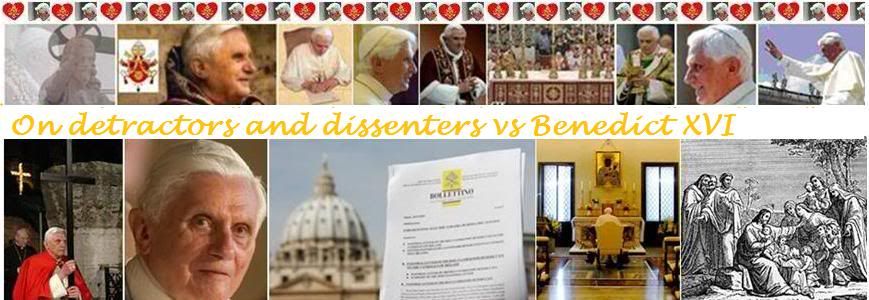 Another response to the latest anti-Church, anti-Benedict screed in TIME... But Greg Erlandson, president and publisher of Our Sunday Visitor Publishing, is well-armed and ready as he has just co-authored the newly released "Pope Benedict XVI and the Sexual Abuse Crisis: Working for Reform and Renewal" (2010, Our Sunday Visitor).
Why Time magazine misses the point:
Another response to the latest anti-Church, anti-Benedict screed in TIME... But Greg Erlandson, president and publisher of Our Sunday Visitor Publishing, is well-armed and ready as he has just co-authored the newly released "Pope Benedict XVI and the Sexual Abuse Crisis: Working for Reform and Renewal" (2010, Our Sunday Visitor).
Why Time magazine misses the point:
Benedict XVI's pontificate is marked
by reform and renewal
By Gregory Erlandson

HUNGTINGTON, Indiana, JUNE 8, 2010 (Zenit.org).- It would probably be too much to ask that Time magazine run a cover story on the bold statements and concrete actions that Benedict XVI has taken to address the clergy sexual abuse crisis.
No self-respecting journalistic enterprise wants to be separated from the pack when it comes to covering a controversial news story, which means it must always follow the herd, even when the evidence points elsewhere.
But the Time magazine June 7 cover story is a particularly frustrating example of a media enterprise playing to prejudices with half-truths even to the point of severely misrepresenting the story. {But it's not the first such offense by TIME! Israely, after an initial first year of covering Benedict XVI positively, suddenly and unaccountably turned on him with a vengeance and has honed his remorselessly blatant blend of distortion, misrepresentation and half truths to malicious perfection in his idea of 'killing' - character assasination - by a thousand cuts.]
"Why Being Pope Means Never having To Say You’re Sorry: The Sex Abuse Scandal and the Limits of Atonement" is the provocative headline splashed across the most recent Time cover, which also features an image of the back of Benedict XVI's mitered head.
Lest we have any doubts where this is heading, the lead sentence of the story manages to drag in the Inquisition: "How do you atone for something terrible, like the Inquisition?"
The gist of the story is that as Cardinal Joseph Ratzinger, prefect of the Congregation for the Doctrine of the Faith, he wasn't so up to apologizing for the Inquisition, and he isn’t really doing enough to apologize for the clergy sexual abuse crisis, either.
Time magazine wants the Pope to offer a personal mea culpa, particularly for his handling of a case in Germany when he was archbishop of Munich, and more generally for the fact that he "was very much part of a system that had badly under-estimated and in some cases enabled the rot of clergy abuse that spread through the Church in the past half-century."
The story, written by Jeff Israely (reporting from Rome) and Howard Chua-Eoan, while appearing to be about the sexual abuse crisis, is really a subtly [ [Oh please! Nothing could have been less subtle and more obvious! Hatchet jobs - actual or figurative - are never subtle.] written assault on the papacy itself, making the following case:
1. For the past two centuries, the Vatican has centralized power and authority over the Church, including the declaration of papal infallibility at the First Vatican Council.
2. This centralization is how it has managed to control its docile flock even as it has lost temporal power.
3. At stake in the sexual abuse crisis is the prestige and power of the papacy and the Church’s own authority.
4. There needs to be some sort of acceptance of personal guilt on the part of Pope Benedict for his actions, despite all he has done to address the crisis.
5. Such an admission of guilt and apology would call into question, however, the "theological impregnability of the papacy" and hasten other changes in the Church that will diminish its size and authority.
The provocative headline of the article -- "Why Being Pope Means Never Having To Say You’re Sorry" -- makes more sense in this narrative because it yokes the claim of infallibility to the current crisis, making the papacy the center of the abuse story.
The fact that the Pope has apologized repeatedly thus becomes irrelevant for Time magazine -- despite the obvious contradiction of the headline -- because [it considers] the apologies are just a public relations strategy to head off a greater challenge.
In laying out this political analysis of the last 200 years of Church history, the article also serves to bolster the case [No, it does not - there is nothing objective about it, simply a fabric woven of the most negative conjectures possible] of those lawyers seeking damages from the Vatican for sexual abuse cases that occurred in the United States. Since the Vatican was so centralized and domineering, the question of its liability for the handling of individual local cases becomes more plausible.
Thus, after recounting the many positive steps the Pope has taken, Time still concludes that he is hedging: "He assigned wrongdoing not to the Church but to its servants."
This, the magazine suggests, is to protect the Church from legal liability. "The consequences of sin are subject to divine salvation, but the consequences of crime lie within the purview of human judges and entail courts of law, prison, public humiliation and the loss of property."
Time quotes an Irish theologian: "This very centralized Church [tightly managed out of Rome] has only really been the case since the end of the 19th century." Here it ties everything back to the First Vatican Council and its statement on papal infallibility.
In keeping with the heavy editorializing of the entire story, it sums up Vatican I as a "stage-managed" council that used a "suspect majority of bishops" to approve infallibility, thus allowing the Roman Curia to become "ever more centralized and domineering."
While the article dismisses "a purportedly impromptu crowd of 150,000 people" who showed up to cheer the Pope one Sunday (although no one claims it was impromptu), it lauds plans for a "Reformation Day" in October being organized by victims of clergy sexual abuse to "pressure the Vatican to act" and to "take back" the Church.
The story gets so many details wrong, that defenders of Benedict XVI in some ways don't know where to start.
Infallibility has nothing to do with the story of sexual abuse. [In fact, it is not clear why Israely even brought up the issue at all, since he clearly says it applies to the Pope's dogmatic teaching. And nowhere in the Church's 2000-year history has any Pope ever taught that priests can indulge in sexual abuse of children and that bishops are dutybound to cover up for priests who offend in this way! Nor have they ordered it at all! So why is papal infallibility even invoked here?]]
The centralization of authority is more stereotype than truth, as witnessed by the diversity of Catholic voices, the independent actions of many bishops, the rise of the national bishops' conferences and on and on.
If anything, what is frustrating to many Catholics and puzzling to non-Catholics who hold a simplistic view of papal authority is that the Pope cannot just rule by arbitrary decree. (It is ironic that this same misunderstanding permeates the controversy surrounding Pope Pius XII and the struggle with Nazism.)
The real story is this: Benedict XVI is aware of the scale and the scope of the crisis worldwide.
- He has taken decisive actions (such as the removal of the founder of the Legion of Christ).
- He has intervened strongly in Ireland, with a remarkably honest and plain-spoken letter to the Irish Catholics, a visitation of top prelates to study the root causes of the crisis and how it was handled, the acceptance of several resignations by bishops, and a high-level meeting with Irish prelates at the Vatican.
- He has quite clearly led the way in encouraging local bishops’ conferences to address their scandals head on, and
- He has laid out the language for understanding the crisis: Endorsing the search for truth, calling for penance, not blaming the media or enemies outside the Church, but pointing to the enemies within.
Mistakes have been made. Grievous mistakes. Mistakes were made by bishops, by priests, by psychiatrists and police and judges and yes, even by well-intentioned and grief-stricken relatives. The cost of these mistakes is very high, and the Church will have to pay these costs.
But efforts to make Benedict XVI part of the problem rather than part of the solution would be an even bigger mistake, for it is he who is providing real leadership on this issue.
It is Benedict XVI who is refusing to circle the wagons and whounderstands the spiritual as well as the canonical and civil issues at stake. It is Benedict XVI who is championing the necessary reform and renewal that the scandals demand.
[Modificato da TERESA BENEDETTA 09/06/2010 00:17] |
| |
 09/06/2010 02:13 09/06/2010 02:13 |
|
| | | OFFLINE | | Post: 20.357
Post: 2.997 | Registrato il: 28/08/2005
Registrato il: 20/01/2009 | Administratore | Utente Veteran | |
|
 Four laymen among
Four laymen among
9 upcoming beatifications

VATICAN CITY, JUNE 8, 2010 (Zenit.org).- Benedict XVI approved nine beatifications to be held in the coming weeks, including those of two young laypeople: a 19-year-old Slovenian martyr, and an Italian girl who died at age 18.
The Office of Liturgical Celebrations of the Supreme Pontiff announced the rites of beatification approved by the Holy Father to be held over coming months.
This Saturday will be the first: that of Manuel Lozano Garrido, known as Lolo. This Spanish layman was a journalist and writer and he will be beatified in Linares, Spain.
Another layman will be raised to the altars the following day: Lojze Grozde of Slovenia. Born in 1923 but rejected by his mother because he was conceived out of wedlock, Grozde endured a difficult childhood before finding God through Catholic Action. He came to live an intense life of prayer, but in 1943 on a trip to visit relatives, he was detained and accused of spreading anti-Communist propaganda. He was tortured to death the night of his arrest. He will be beatified in Celje, Slovenia.
Also in June, Stephen Nehme (born Joseph), a Lebanese professed religious of the Order of Maronites, will be beatified. His ceremony will take place June 27 in Kfifan, Lebanon.
September will bring three beatifications:
-- Leopoldo Sánchez Márquez de Alpandeire (born Francisco), a Spanish professed layman of the Order of Friars Minor (Capuchins), on Sept. 12 in Granada, Spain.
-- María de la Inmaculada Concepción (born María Isabel Salvat y Romero), Spanish superior-general of Sisters of the Company of the Cross, on Sept. 18 in Seville, Spain.
-- Chiara Badano, an Italian lay woman, on Sept. 25 at the Shrine of Our Lady of Divine Love, Rome. Badano died of cancer at age 18; she will be the first member of the Focolare Movement to be beatified.
Three more beatifications approved by the Pope are:
-- Anna Maria Adorni, Italian founder of the Handmaidens of Blessed Mary Immaculate and of the Institute of the Good Shepherd of Parma, on Oct. 3 in Parma, Italy.
-- Szilard Bogdanffy, Romanian bishop and martyr, on Oct. 30 in Oradea Mare, Romania.
-- Maria Barbara of the Blessed Trinity (born Barbara Maix), Austrian founder of the Sisters of the Immaculate Heart of Mary, on Nov. 9 in Porto Alegre, Brazil.
Last Sunday, Fr. Jerzy Popieluszko, of Poland's Solidarity movement, who was killed by Communist secret police, was beatified in Warsaw.
[The new Blesseds were in the list of miscellaneous decrees regarding causes of sainthood that were signed by Benedict XVI and announced by the Vatican last December 21. The list had included the recognition of the 'heroic virtues' of Pope Pius XII and of John Paul II, now called 'Venerable.
Earlier approved was the beatification of Cardinal John Henry Newman, whom the Pope himself will beatify when he visits the United Kingdom in September.]
[Modificato da TERESA BENEDETTA 09/06/2010 02:14] |
| |
 09/06/2010 04:04 09/06/2010 04:04 |
|
| | | OFFLINE | | Post: 20.358
Post: 2.998 | Registrato il: 28/08/2005
Registrato il: 20/01/2009 | Administratore | Utente Veteran | |
|
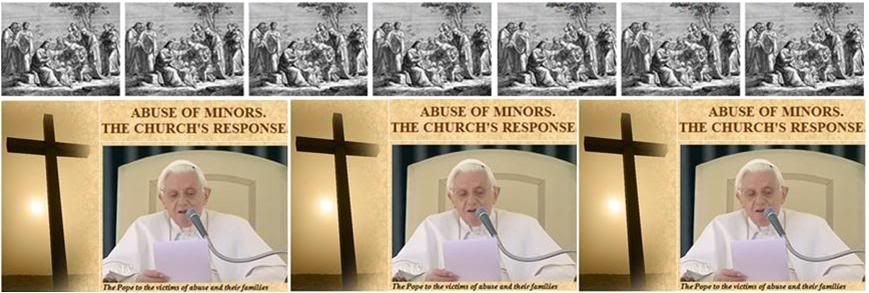 Thanks to Lella's blog,
Thanks to Lella's blog,

an 'unscheduled' commentary from Bruno Mastroianni.
Body blows from the media have failed
to knock down a resolute Benedict XVI
by Bruno Mastroianni
Translated from

June 2010
What appears to many as a crisis is proving to be an opportunity for Benedict XVI. The climate created by the scandal over sexual abuse of minors by priests is, in fact, facilitating the task of the Pope in bringing to light some results in terms of Church response.
First of all, in his relationship with bishops. For too long, some members of the episcopate, especially in Europe, have appeared unconcerned about each bishop's duty to act "in communion with the Roman Pontiff".
Now, after the failings of some of them have come under public scrutiny, they seem to be interested in a show of unity, entrusting themselves to the sure leadership of the one person who, now more than ever, seems capable of keeping the Church's course intact. [For the first time, I find a critical flaw in Mastroianni's arguments. How can he say this after the self-serving, self-aggrandizing shenanigans of someone like Schoenborn????]
The crisis also has its effects on the relationship between the Catholic hierarchy and the world.
In Corriere della Sera, in late April, Ernesto Galli Della Loggia correctly wrote about a 'lay-oriented turn' taken by Benedict XVI. However, I would say that rather than a turning point, it is a process that has been taking place for some time.
A process that began in Papa Wojtyla's Pontificate, in which the Church is becoming less clerical [I suppose he means clergy-centered] and more intent on its mission to bring God to the world.
The new norms for the disposition of sex abuse cases against priests - approved by John Paul II, with implementing instructions by then Cardinal Ratzinger - were within this purview: To remedy messes which, often, were due to errors of judgment by the local bishop (a relative handful of them, but enough to cause scandal) who confused the bishop's duty to be the spiritual head of his diocese, with being the 'head' in every respect.
As different commentators have noted, including non-Catholic ones, the crisis is allowing the Church to show what it's made of! What other institution these days - when there seems to be no other commandment but to perpetrate oneself and own interests - could have the courage to do what is right without compromises, facing the problem head on, even while risking its own good name?
Which leads us to ask why the festering boil of pedophilia ruptured today in a way that it never really did years ago, when the US scandals emerged. At the time, despite the widespread reportage, newsmen were far gentler and accommodating. [ [Perhaps in Europe, but certainly not in the USA, where the outrage was immense against the Church, although media hostility against the Pope was certainly muted!]
And yet, between then and today, things were no worse, in terms of the abuses committed and the cover-up by some bishops.
There is one great difference. The Church under Benedict XVI is taking decisive steps along that path which can make her more authentic and resolute in responding to the challenges of the world today.
But do check out if anyone is taking note of this at all!
"Yes, there are," wisecracks one of Lella's followers. "Remember those 'four cats' that a RAI commentator said were all who are out there listening to Benedict XVI? They're still there! Along with millions of the faithful..."
[Modificato da TERESA BENEDETTA 09/06/2010 13:27] |
| |
 09/06/2010 14:32 09/06/2010 14:32 |
|
| | | OFFLINE | | Post: 20.359
Post: 2.999 | Registrato il: 28/08/2005
Registrato il: 20/01/2009 | Administratore | Utente Veteran | |
|
 June 9, Wednesday, 10th Week in Ordinary Time
June 9, Wednesday, 10th Week in Ordinary Time
 ST. EPHREM OF SYRIA [306-373), Deacon, Preacher, Theologian, Writer, Poet, Composer of Hymns, Doctor of the Church
ST. EPHREM OF SYRIA [306-373), Deacon, Preacher, Theologian, Writer, Poet, Composer of Hymns, Doctor of the Church
Benedict XVI dedicated his catechesis on Nov. 29, 7007
www.vatican.va/holy_father/benedict_xvi/audiences/2007/documents/hf_ben-xvi_aud_20071128...
to this extraordinary man who was born to a Christian family in what is now Syria, but was not baptized till he was 18. He became a famous teacher in his native city, which he fled when it was taken over by the Persians. He settled in Edessa (in present-day Iraq) where he was ordained a deacon and established a theological school. His prolific writings were based on his knowledge of Scriptures and deep insight into the Christian mysteries and humanity. Besides his prose writings, he was a great religious poet and composed hymns as a means of catechesis as well as against the heresies of the day. One of the first to introduce song into Church worship, he became known as 'the harp of the Holy Spirit' for his exquisite hymns. Although he never became a priest, he lived poor and chaste all his life. He is said to have visited St. Basil the Great (330-379), with whose theology he had much in common. He died of the plague which he caught while caring for victims in Edessa. Benedict XV declared him a Doctor of the Church in 1920.
Readings for today's Mass:
www.usccb.org/nab/saints/todaysaint.shtml
OR today.
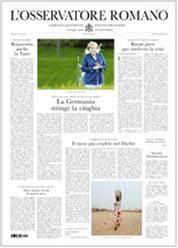
No papal stories in this issue. Page 1 news:
Germany to cut public spending by 80 billion
euros over the next four years; even NATO
mustcut its budget; environmentalists predict
it will take at least half a century to clear
the effects of the massive oil leak in the Gulf
of Mexico; and 600 civilians killed in May by
continuing warfare in Darfur. In a front-page
commentary, Ettore Gotti Tedeschi explains
how good priests can help to resolve the
financial crisis by inculcating in the faithful
a sense of responsibility for the consequences
of every human action.
THE POPE'S DAY
General Audience today - The Holy Father reported on his recent apostolic visit to Cyprus.
Later, he gave a private audience to
- Mons. Gerhard Mueller, Bishop of Regensburg
[Modificato da TERESA BENEDETTA 10/06/2010 00:45] |
| |
 09/06/2010 15:54 09/06/2010 15:54 |
|
| | | OFFLINE | | Post: 20.360
Post: 3.000 | Registrato il: 28/08/2005
Registrato il: 20/01/2009 | Administratore | Utente Master | |
|


 Sandro Magister anticipates the Pope's report on the Cyprus trip with his own commentary today.
In a Church of martyrs,
Sandro Magister anticipates the Pope's report on the Cyprus trip with his own commentary today.
In a Church of martyrs,
the patience of Benedict
In Cyprus, the Pope saw up close the drama of the Christians of the East.
Ecumenism is flourishing, but where Islam reigns, there is no freedom of conscience or religion.
The latest victim is Bishop Luigi Padovese, decapitated like Saint John.

ROME, June 9, 2010 – On the first visit ever made by a Pope to the island of Cyprus – evangelized in apostolic times, and afterward a terrain of demarcation and conflict between Christianity and Islam – the media emphasized its geopolitical aspects, which were modest [and really, quite secondary on this trip!].
In particular, some parts of the working agenda for discussions discussed next October at the Special Synodal Assembly for the Middle East which was made public Sunday in Nicosia. [NB: The Pope had nothing to do with the agenda, which was based on suggestions made by bishops, especially the leaders of the Middle Eastern Churches.]
But the most direct way to understand the meaning of this trip in the mind of its author is to listen to the voice of Benedict XVI himself.
Papa Ratzinger generally reveals his thinking about each of his trips on two pre-arranged occasions. With his replies to journalists on the papal flight toward his destination, as he did on Friday, June 4, enroute to Paphos, and a report of the trip at the General Audience that follows it (today, for Cyprus).
And then, of course, in the discourses that the Pope gives during the visit. Especially the passages where his own personal imprint is most evident.
From all of this, it can be gathered that for Benedict XVI, the focal points of the trip to Cyprus were ecumenism and Islam.
ECUMENISM
The population of Cyprus is overwhelmingly Orthodox. And its Church is one of the most ancient and noble in Orthodox Christendom.
Benedict XVI and Archbishop Chrysostomos II have a relationship of personal friendship and respect that found its highest symbolic expression in the embrace between the two during the Mass celebrated by the Pope in Nicosia on Sunday, June 6, with almost the entire small Catholic community of the island present.
In his farewell message to the people of Cyprus, the Holy Father associated this embrace with the "prophetic" one in 1964 between Paul VI and Patriarch Athenagoras of Constantinople. Indeed, since then, the ecumenical journey with the Orthodox has seen unprecedented progress with the current Pope.
On the flight to Cyprus, Benedict XVI explained that there are three elements that are bringing the Church of Rome and the Eastern Churches "closer and closer together."
The first is Sacred Scripture, read not as a text that everyone interprets as he sees fit, but as a book that "emerged among the people of God, that lives in this common subject and remains present and real only here."
The second is the tradition of which the Catholic Church and the Orthodox Churches are the bearers, a tradition that not only interprets the Scripture but has its sacramentally instituted guides and witnesses in the bishops.
And the third element is the "rule of faith" ( regula fidei) - the cumulative doctrine established by the ancient councils, which "is the summation of what is contained in the Scripture and opens the door to its interpretation."
It is evident, however, that if these three elements bring the Catholic Church closer to the Orthodox Churches, they distance both from Protestantism.
The proximity between Catholicism and Orthodoxy has become so strong that the two sides have arrived at discussing the main question that divides them, the primacy of the Bishop of Rome.
It was in Paphos last October, that the Mixed International Commission for Theological Dialog between the Catholic and Orthodox Churches was hosted by Chrysostomos II for its biennial session. And for the first time since they started meeting in 1980, they agreed to examine the role of the Papacy (and therefore, the priamcy of the Bishop of Rome) in the undivided Church, before the Great Schism of 1054.
The commission will meet again next Sept. 20-27 in Vienna to resume this discussion.
In the orthodox world, the archbishop of Cyprus, Chrysostomos II, is one of the main players in the current 'springtime of ecumenism', along with The Ecumenical Patriarch, Bartholomew I of Constantinople; the Metropolitan of Pergamon (Greece), Ioannis Zizioulas; and for the Russian Church, the Patriarch of Moscow, Kirill I, and his number-2 man, Metropolitan Hilarion of Volokolamsk.
The visit to Rome in June 2007 by Chrysostomos II been one of the most ecumenically fruitful of recent years.
The objection to the Pope's visit expressed before the trip by some of the Orthodox bishops of Cyprus, supported by some u;tra-traditionalists of the Greek Church [like the monks of Mt. Athos], gained no real traction.
ISLAM
As for the second focal point of Benedict XVI's visit to Cyprus, the encounter of Pope Benedict XVI with a Muslim Sufi leader from Turkish-occupied Cyprus is emblematic.
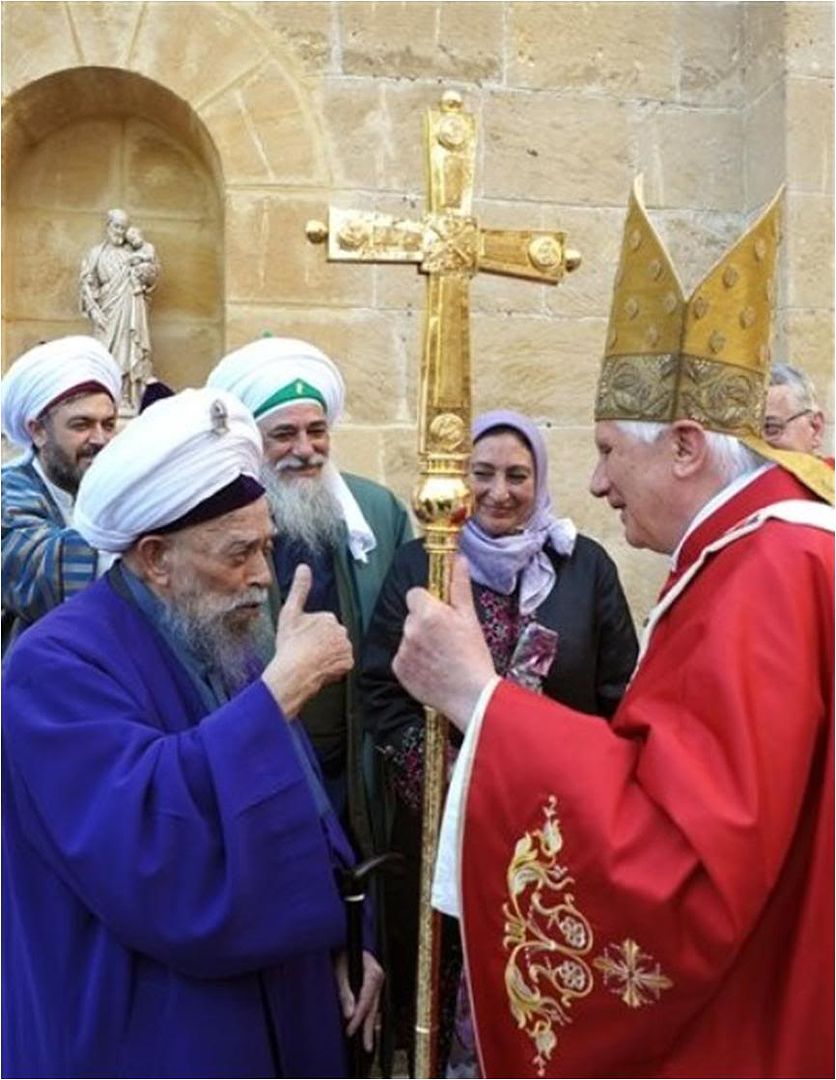
It took place on Saturday, June 5, while Benedict was on his way to say Mass at the Catholic Church of the Holy Cross – located right on the dividing line between the Greek and Turkish parts of Nicosia. [By prior arrangement with the Pope's staff and security] Benedict XVI was approached by the 89-year-old Sheikh Mohammed Nazim Abil Al-Haqqani. They greeted one another, and promised to pray for each other. They exchanged little gifts: Muslim prayer beads, a plaque with words of peace in Arabic, a pontifical medallion.
There had been speculation about a possible meeting with the Mufti of Cyprus, the highest Muslim authority on the island. Instead, there was this actual encounter with a Sufi master, an exponent of Islamic mysticism, "a form of Islam that 'presumably through Christian influence stresses the love of God for man and of man for God', instead of an inaccessible God 'among whose 99 names that of Father is missing'."
The words just quoted are from Bishop Luigi Padovese, apostolic vicar for Anatolia and president of the Catholic episcopal conference of Turkey, who was killed in Iskenderun on June 3, the eve of the Pope's trip to Cyprus, where Padovese would have taken part as one of the bishops of the Middle East.
Benedict XVI carefully kept his trip from being constrained by this tragic event. Vatican diplomacy, extremely attentive to preventing any friction with Turkey and with Islam in general, did its part to convince the Pope to immediately and preemptively rule out the idea that this was a "political or religious" murder.
But this submissive and counterproductive version – contradicted more and more each day by the facts, as reported from the start by Avvenire, the newspaper of the Italian bishops, and by AsiaNews - did not keep the Pope from speaking truthfully to Islam in generla.
He spoke of the 'sad reality' in Cyprus - which to Cypriots means Turkish occupation of northern Cyprus, with the expulsion of Christians inhabitants and systematic destruction of the churches.
Welcoming the Pope as a guest, Archbishop Chrysostomos II decried all this in strong words [as he always does]. At the end of his visit, Benedict XVI said:
Having stayed these past nights in the Apostolic Nunciature, which happens to be in the United Nations buffer zone, I have seen for myself something of the sad division of the island, as well as learning of the loss of a significant part of a cultural heritage which belongs to all humanity.
I have also listened to Cypriots from the north who wish to return in peace to their homes and places of worship, and I have been deeply moved by their pleas.
The Pope responded to this acknowledged state of affairs not by offering political or strategic advice, but above all by urging "active" patience, as in everything that has to do with the incessant explosions of violence in the Middle East. During the flight to Cyprus, he said:
We almost have to imitate God, his patience. After all the cases of violence, not to lose patience, not to lose courage, not to lose the forbearance of starting over; to create the dispositions of the heart in order to begin ever anew, in the certainty that we can move forward, that we can arrive at peace, that the solution is not violence, but the patience of the good.
In Nicosia, speaking to the diplomatic coprs and through them to the governments of the region, the Pope proposed the political wisdom of Plato, of Aristotle, of the Stoics, because "for them, and for the great Islamic and Christian philosophers who followed in their footsteps, the practice of virtue consisted in acting in accordance with right reason, in the pursuit of all that is true, good and beautiful," starting with that "natural law proper to our common humanity."
Benedict XVI knows very well that the "great Islamic philosophers" open to Greek culture are from centuries long past, and that after Averroes, that openness ended. But by recalling this historical precedent, the Pope once again indicated that Islam also needs an
'enlightened' revolution such as Christian thought experienced following the era of secular Enlightenment.
In Regensburg, he had explained how this enterprise is extremely arduous, but he has continued to urge the Muslim world to fuse faith with "logos," and therefore with freedom of conscience and religion, still non-existent in Islamic countries - as Bishop Padovese also knew well and expressedin terms very similar to the Pope's,
Against this backdrop, the Pope's meeting with the Sufi master – a figure at the margin of the dominant Islamic movements – symbolized the encounter with an "other" Islam, with Muslims who are not enemies but "brothers in spite of the differences."
THE CROSS
But it wasn't only ecumenism and Islam on the agenda of the Pope's trip. [Of course! The main purpose of the apostolic visit after all is to 'confirm his brothers in the faith'.]
Surprisingly, Benedict XVI dedicated his most intense meditation to the Cross of Jesus, preaching in a church dedicated to the Holy Cross. [Why 'surprisingly'? Since it was an afternoon Mass that did not have to follow the prescribed liturgy of the day, what better topic for his homily than the great mystery for which the Franciscan church is named? Especially in Cyprus, which was always a way station to and from the Crusades, named precisely so because they were wars fought to re-establish the religion of the Cross in the Holy Land after centuries of Islamic conquest.]
To all who suffer, he said, the cross "offers them hope that God can transform their suffering into joy, their death into life." The cross does what no earthly power can do. "And if, in accordance with what we have deserved, we should have some share in Christ’s sufferings, let us rejoice because we will enjoy a much greater gladness when his glory is revealed."
It takes courage to say these things to people enduring the unjust occupation of their homes and land, the destruction of the signs of their faith, in a Middle East where the only state which allows religious freedom to Christians is Israel [a couple of the tiny Arab emirates, too!]
But the cross is the 'happy scandal' of the Christian faith. It is the triumphant banner that Pope Benedict raises and offers to the world.
|
| |
 09/06/2010 16:19 09/06/2010 16:19 |
|
| | | OFFLINE | | Post: 20.361
Post: 3.001 | Registrato il: 28/08/2005
Registrato il: 20/01/2009 | Administratore | Utente Master | |
|


 Damian Thompson has been blogging almost daily about the apparent inadequacies of preparations for the Pope's visit on the part of all concerned, but after his extensive backgrounder in the Spectator, it's best to hear next what the concerned parties themselves have to say. Here's one from the Church side, and it's rather depressing!
Church organizer admits
Damian Thompson has been blogging almost daily about the apparent inadequacies of preparations for the Pope's visit on the part of all concerned, but after his extensive backgrounder in the Spectator, it's best to hear next what the concerned parties themselves have to say. Here's one from the Church side, and it's rather depressing!
Church organizer admits
there's still 'lots to do':
Even the program has not been finalized!
ny Martin Beckford
Religious Affairs Correspondent

June 9, 2010
The organiser of the Pope’s historic visit to Britain has admitted “lots of things” still need to be done.
With three months to go, Mgr Andrew Summersgill disclosed that the exact itinerary is yet to be agreed between the Vatican and the Government, and that an “awful lot of work” remains to be completed on arranging security and traffic management.
He also suggested that many Roman Catholics who had hoped to attend one of Benedict XVI’s public appearances – and contributed towards the costs through church collections – may have to settle for a glimpse of his entourage from the roadside.
It comes following reports that the Church’s costs of hosting the first-ever papal state visit to England and Scotland have doubled to £14 million while key events could be scaled down.
The Government is to appoint Lord Patten, a Catholic and experienced diplomat, to act as a “bridge” between civil servants and Church officials organising the three-day tour in September following a series of setbacks.
In the latest of a series of progress updates, published 99 days before the Pope’s arrival in Scotland, Mgr Summersgill said: “The Papal Visit planning is carrying on, it is quite a complex organisation to put together. It involves different partners. So it involves the Holy See, it involves the Bishops’ Conference, it involves the local authorities where the Pope will be going, and it involves above all the Government, because the Pope’s coming at the invitation of the Government and specifically at the invitation of The Queen. And that, quite naturally I think, means that we are not in a position to be able to be much more clear than I know people would like us to be."
But he admitted: “Lots of things need to be done. First of all we need to have an agreed itinerary between the Government and the Holy See. And there are plans being made for three quite detailed planning visits that need to take place over the next few weeks, with people coming from the Holy See to look at what is being proposed and to finalise and agree those arrangements.
“There’s an awful lot of work to be done in terms of the security arrangements, particularly in terms of the traffic management planning that needs to take place around some of the larger gatherings, and also some of the smaller parts of the Visit that involve the Pope.
“And also there are agreements to be entered into with broadcasters, so that as much of the Visit as is possible, all of it really, will be available to be broadcast both here and around the world.”
Amid concern among some Catholics at the scarcity of tickets to planned open-air Masses in Glasgow, London and the Midlands, he said that tickets will be allocated to dioceses and then distributed among parishes.
The Papal Visit Co-Ordinator went on: “There are some parts of the programme which are clearly times and places where Pope Benedict will be visible where he will be on his way somewhere, and it’s expected that people would hopefully like to come along and see him. I’m sure they would, even if it doesn’t mean attending something.”
It would have been nice to hear a word from Archbishop Vincent Nichols, not just from Summergill, about whose credentials to be the organizer for the Church Thompson has expressed great misgivings!
But while the Church of England and Wales is apparently floundering in its preparations, the other papal host, the Church of Scotland, does have good news:
Scottish bishops confirm
Papal outdoor Mass in Glasgow
by Allan Mackie

June 9, 2010
The Pope will celebrate Mass before a crowd of worshippers at Glasgow's Bellahouston Park in September, it has been confirmed.
It will be Pope Benedict XVI's first visit to Scotland, and the first papal visit since predecessor John Paul II's pastoral trip in 1982.
He attracted massive crowds to Bellahouston Park and Murrayfield Stadium in Edinburgh during the stay.
The venue for the Catholic ceremony was confirmed following a meeting between Glasgow City Council and the Bishops' Conference of Scotland.
The Bishops' Conference of Scotland said:
"The Catholic Church welcomes the confirmation given by Glasgow City Council that Bellahouston Park will be available and suitable for the visit of Pope Benedict.
"The park provides a wonderful venue for what will be a tremendous event, it is a place that has a great resonance for Scottish Catholics, many of whom remember fondly the wonderful day in 1982 when Pope John Paul II said mass there."
The bishops expect that more than half of the 185,000 Catholics who attend Sunday services across Scotland will be able to attend the mass on September 16. [That's setting the bar rather low! Initial estimates were for at least 200,000, which allows the high probability that even rare Massgoers will atend a Mass said by the Pope, and that the faithful will not just come from Scotland but from other parts of the British islesand even Ireland!]
Parishes - there are 450 in Scotland - will receive a pro-rata allocation of places based on their mass attendance figures.
Thousands more are expected to line the route of the Pope's motorcade through Edinburgh earlier in the day.
The bishops also said they welcomed the appointment of Lord Chris Patten, the former governor of Hong Kong, to oversee the visit of Pope Benedict.
Meanwhile, the Free Presbyterian Church of Scotland said they found it "offensive" that the UK Government was hosting the Pope as a head of state. [But he is a head of state - and he was invited by the UK Government to visit as a head of state.]
NB: The story was carried by many Scottish newspapers affiliated with The Scotsman, among which was

but the Scotsman itself gives the story a byline.
[Modificato da TERESA BENEDETTA 09/06/2010 16:54] |
| |
 09/06/2010 18:16 09/06/2010 18:16 |
|
| | | OFFLINE | | Post: 20.362
Post: 3.002 | Registrato il: 28/08/2005
Registrato il: 20/01/2009 | Administratore | Utente Master | |
|

 GENERAL AUDIENCE TODAY
GENERAL AUDIENCE TODAY
The Holy Father availed of today's General Audience, the first since he returned from Cyprus, to make his customary report on his most recent apostolic visit abroad, the 16th of his Pontificate.
Here is how he synthesized his report in English:
In my Apostolic Journey to Cyprus this past week, I walked in the footsteps of Saints Paul and Barnabas, who first brought the Gospel to that island, and visited the small but lively Catholic communities of the island.
I thank the Authorities for their warm hospitality, and I particularly thank the Holy Synod of the Orthodox Church of Cyprus and His Beatitude Archbishop Chrysostomos the Second for their fraternal welcome.
In my celebrations with the Maronite and Latin Catholic communities I witnessed their strong faith and traditions, and the vitality of their educational and charitable institutions.
In Cyprus and throughout the Middle East, Christians are called to overcome divisions and to persevere in their witness to the Gospel in those lands.
At Sunday Mass in Nicosia I consigned the working document for the forthcoming Special Assembly for the Middle East of the Synod of Bishops.
Let us pray that the Synod will strengthen those ancient Christian communities in communion and hope, and help them to build a future of peace throughout the Middle East.
The Pope apparently rode into St. Peter's Square bareheaded, but donned the wide-brimmed saturno for his circuit through the crowd after the audience.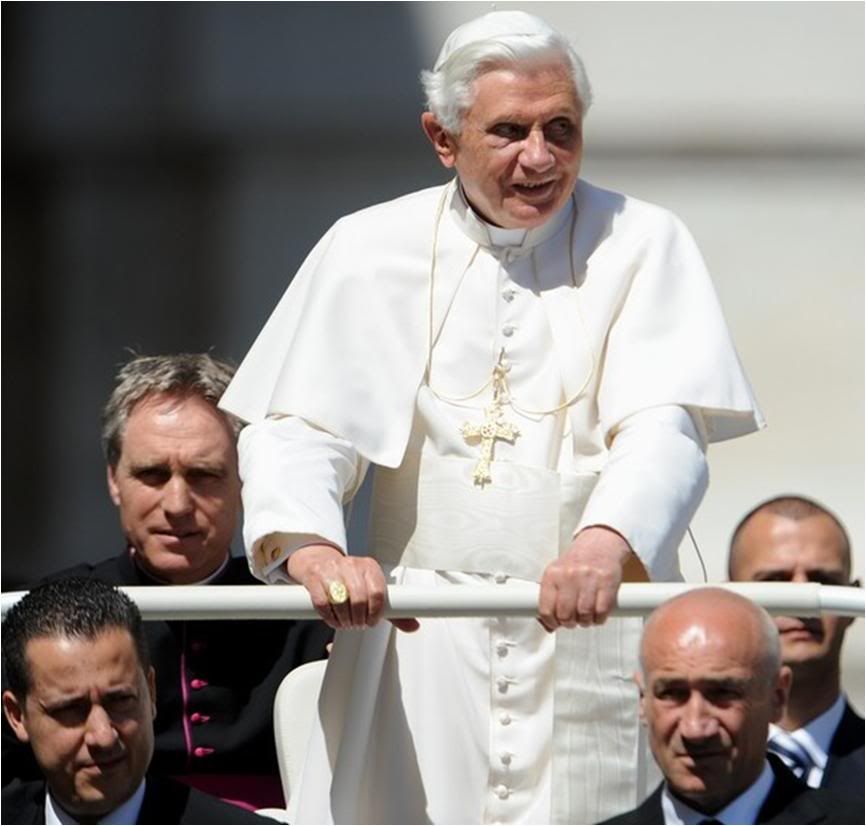
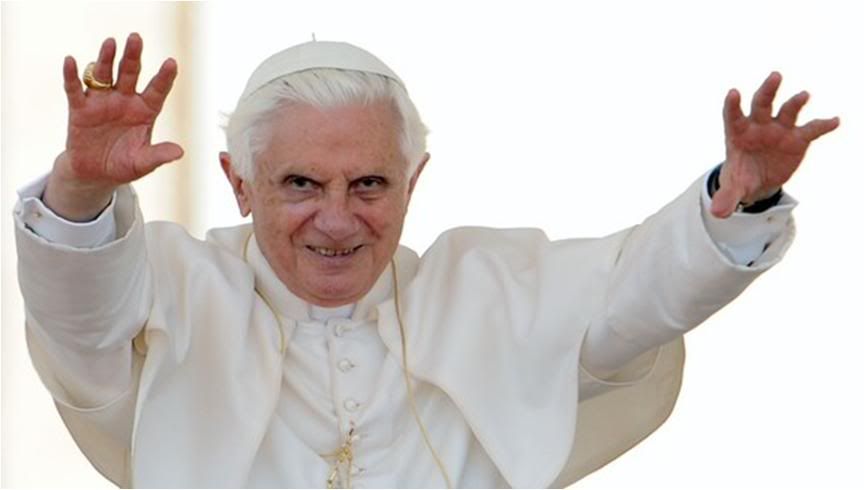
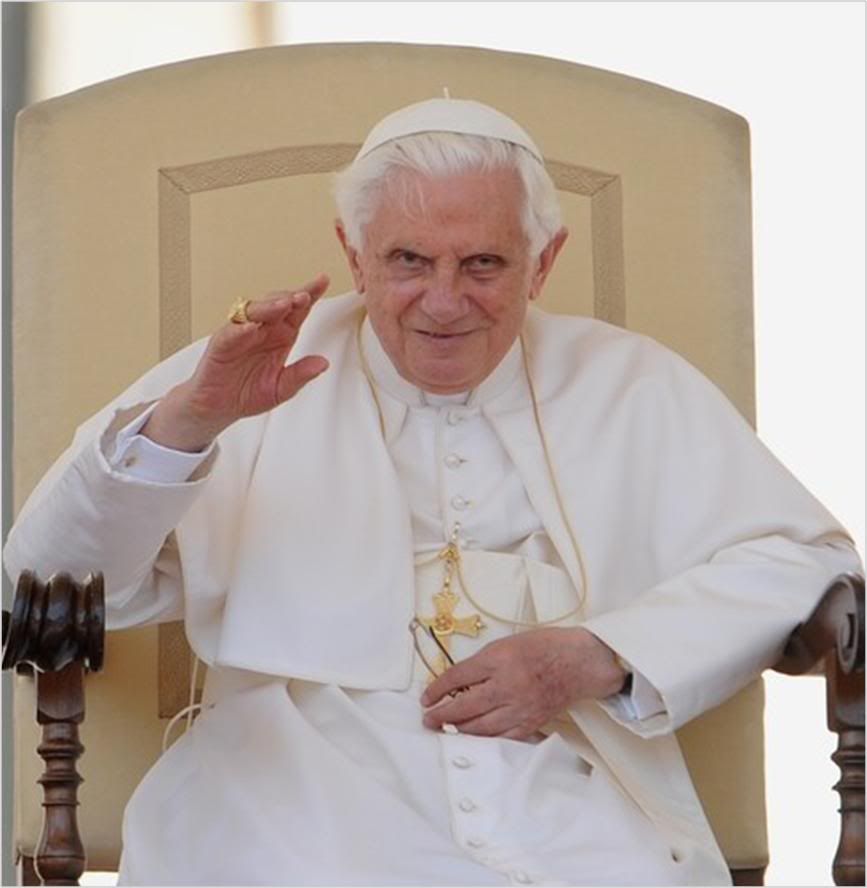 Pope on Cyprus:
Pope on Cyprus:
'A very successful visit'

09 Jun 10 (RV) - Wearing a bright red wide brimmed hat, familiarly known in Rome as a ‘Capello Romano’ Pope Benedict XVI was shaded from the sizzling morning sun as he weaved his way around the throngs of pilgrims and visitors to St Peter’s Square, cheerfully waving to them from the back of his Pope-mobile after today's General Audience.
Many of those present in the sweltering heat this Wednesday for the Pope’s Audience were wearing clerical collars, just some of the 9,700 accredited priests who have answered the Holy Father’s call to come celebrate the close of the Year for Priests with him on Friday.
But on Wednesday the Pope’s thoughts still drew him towards the East and the Christian communities of the Holy Land as he retraced the steps of his recent voyage to Cyprus:
“In my Apostolic Journey to Cyprus this past week, I walked in the footsteps of Saints Paul and Barnabas, who first brought the Gospel to that island, and visited the small but lively Catholic communities of the island”.
In comments in Italian the Pope revealed that his visit was successful because it had achieved its three main goals, “strengthen the faith of Catholic communities”, “encourage them to pursue the path towards full unity among Christians, especially with our Orthodox brethren”, and “embrace all peoples in the Middle East and bless them in the name of the Lord, asking God for the gift of peace”.
Retracing the steps of the journey, the Pope recalled the city of Paphos and the church of Agia Kiriaki Chrysopolitissa, where"with the Orthodox Archbishop Chrysostomos II and representatives of the Armenian, Lutheran and Anglican Communities”, “we renewed our mutual fraternal and irreversible commitment to ecumenism".
Pope Benedict XVI thanked the Holy Synod of the Orthodox Church of Cyprus Archbishop Chrysostomos II, saying they proved that "rootedness in tradition does not prevent the Orthodox community from being firmly committed to ecumenical dialogue together with the Catholic community”.
The Pope recalled “In my celebrations with the Maronite and Latin Catholic communities I witnessed their strong faith and traditions, and the vitality of their educational and charitable institutions”. He said “In Cyprus and throughout the Middle East, Christians are called to overcome divisions and to persevere in their witness to the Gospel in those lands!”.
But the clear highlight of the trip confided the Pope, was " the delivery of the Synod’s Instrumentum laboris at Mass in Nicosia. Where, he recalled, "we prayed for the soul of the late Bishop. Luigi Padovese", whose"sudden and tragic death has left us saddened and dismayed".
Pope Benedict XVI concluded his audience reflections by looking forward to the October Synod for the Middle East, which he said, “will be accompanied by the prayerful affection of the entire Church, in whose heart the Middle East occupies a special place”. The Pope augured that the gathering will also draw the attention of other global protagonists, “especially among those in public life” that they may ceaselessly “work so the region can overcome situations of conflict and suffering that still afflict it and finally find peace in justice”.
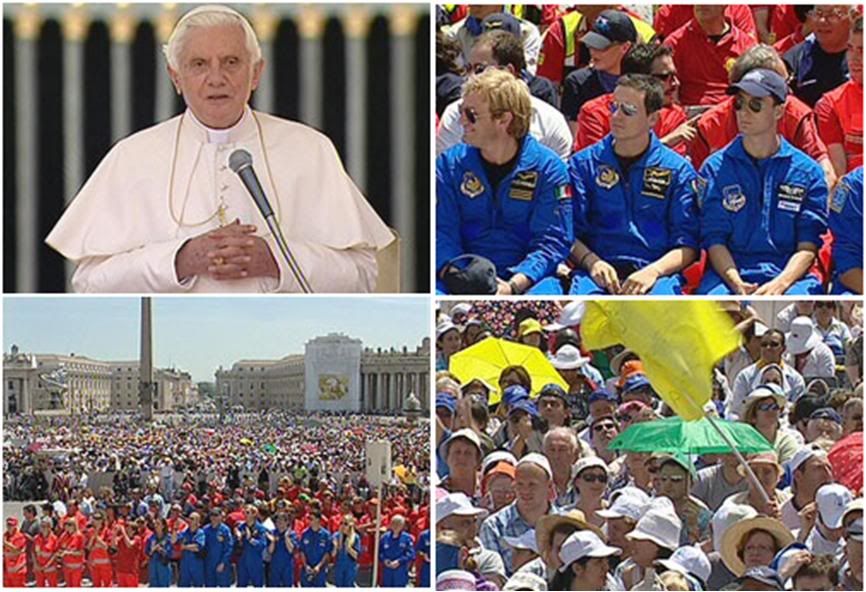
Here is a full translation of the Holy Father's words:
Dear brothers and sisters!
Today, I wish to dwell on my apostolic trip to Cyprus, which in many aspects, was in continuity with previous trips to the Holy Land and Malta.
Thanks to God, this pastoral visit went very well, happily achieving its objectives. It was in itself a historical event, since never before had a Bishop of Rome visited that blessed land, which had seen the apostolic work of St. Paul and St. Barnabas, and which is traditionally considered part of the Holy Land.
In the footsteps of the Apostle of the Gentiles, I went as a pilgrim of the Gospel, above all to confirm the faith of the Catholic communities, a small but lively minority on the island, encouraging them to follow the path of full unity among Christians, especially with our Orthodox brothers.
At the same time, I wished to embrace ideally all the peoples of the Middle East and bless them in the name of the Lord, invoking God for the gift of peace.
I experienced a heartfelt welcome everywhere, and I gladly take this occasion to express again my sincere thanks, first of all, to the Maronite Archbishop of Cyprus, Mons Yousuf Soueif, and His Beatitude Fouad Twal [Latin Patriarch of Jerusalem, who has ecclesiastical jurisdiction over the Church of Cyprus], along with their co-workers, renewing to each of them my appreciation for their apostolic activity.
My sincere gratitude also goes to the Holy synod of the Orthodox Church of Cyprus, especially to His Beatitude Chrysostomos II, Archbishop of New Justinian and all Cyprus, whom I had the joy of embracing fraternally; as well as to the President of the Republic, and all the civilian authorities and those who in various ways, so praiseworthily did all they could for the success of my pastoral visit.
It began on June 4 in the ancient city of Paphos, where I felt myself enveloped in a near-perceptible synthesis of 2000 years of Christianity. The archeological remains present there are the sign of an ancient and glorious spiritual heritage which even today still has a strong impact on the life of the nation.
A moving ecumenical service was held near the church of St Ciriaca Chrysopolitissa, an Orthodox place of worship that is also open to Catholics and Anglicans, located within the archaeological site,
With the Orthodox Archbishop Chrysostomos II and representatives of the Armenian, Lutheran and Anglican communities, we renewed fraternally our reciprocal and irreversible commitment to ecumenism.
I manifested these same sentiments subsequently to His Beatitude Chrysostomos II in our cordial meeting at his residence, during which I also appreciated how much the Orthodox Church of Cyprus is linked to the destinies of her people. Cypriots keep a devoted and grateful memory of Archbishop Makarios III, considered the father and benefactor of the nation, to whom I rendered homage with a brief visit to his monument.
Its rootedness in tradition has not kept the Orthodox community from being decisively involved in the ecumenical dialog together with the Catholic community - both inspired by the sincere desire to restore full and visible communion among the Churches of the East and the West.
On June 5, in Nicosia, capital of the island, I began the second day of the visit with a call on the President of the Republic who welcomed me with great courtesy.
In my meeting with the civilian authorities of Cyprus and with the diplomatic corps, I reiterated the importance of basing legislation on the ethical principles of natural law, in order to promote moral truth in public life. It was an appeal to reason, based on ethical principles that have demanding implications for today's society, which often no longer acknowledges the cultural tradition on which it is based.
The Liturgy of the Word, celebrated at the St. Maron elementary school, represented one of the most evocative moments of the meeting with the Catholic community of Cyprus, in both its Latin and Maronite components. It allowed me to know first-hand the apostolic fervor of the Cypriot Catholics.
That fervor is expressed through educational and assistential activities with dozens of organisms placed at the service of the collective society and appreciated by the governing authorities as well as by the entire population. It was a joyous and festive occasion, animated by the enthusiasm of so many babies, children, and youth.
The aspect of commemoration was not missing, in which the soul of the Maronite Church was touchingly perceptible as it observes this year the 1600th death anniversary of her founder, St. Maron.
Particularly significant in this respect was the presence of Maronite Catholics who were originally residents of four villages on the island where Christians suffer and hope. To them, I expressed my paternal understanding of their aspirations and difficulties.
At the same celebration, I likewise admired the apostolic commitment of the Latin community, under the solicitous leadership of the Latin Patriarch of Jerusalem and the pastoral zeal of the Franciscan Friars of the Holy Land, who have placed themselves at the service of their communities with perseverance and generosity. Latin-rite Catholics, who are very active in charitable work, have given special attention to workers and the most needy.
I assured all of them - Latin-rite and Maronite Catholics - that I remember them in my prayers, encouraging them to bear witness to the Gospel through patient work and reciprocal trust among Christians and non-Christians, in order to construct a lasting peace and harmony among peoples.
I reiterated this call for trust and hope during the Holy Mass celebrated at the parish church of the Holy Cross, in the presence of priests, consecrated persons, deacons, catechists and representatives of lay movements on the island.
After a reflection on the mystery of the Cross, I addressed a heartfelt appeal to all the Catholics in the Middle East that, despite all the great trials and the difficulties that everyone is aware of, they must not yield to the temptation to emigrate, because their presence in the region is an irreplaceable sign of hope.
I assured them - especially the priests and religious - of the affectionate and intense dolidarity of the entire Church, as well as our incessant prayers that the Lord may help them and always be for them a living and calming presence.
Certainly, the culminating point of the apostolic visit was the consignment of the Instrumentum Laboris for the Special Assembly on the Middle East of the Bishops' Synod.
This took place on Sunday, June 6, at Nicosia's Sports Palace at the end of the solemn Eucharistic Celebration, concelebrated by the Patriarchs and Bishops of the various ecclesial communities of the Middle East.
The People of God participated in unison "amid loud cries of thanksgiving, with the multitude keeping festival", as the Psalm says (42,5). We experienced this concretely - thanks equally to the presence of so many immigrants who make up a significant part of the Catholic population in Cyprus, where they have integrated without difficulty.
Together, we prayed for the soul of the lamented Bishop Luigi Padovese, president of the Turkish bishops' conference, whose sudden and tragic death has left us in sorrow and dismay.
The theme of the Synodal assembly on the Middle East, which will take place in Rome next October, speaks of communion and being open to hope: "The Catholic Church in the Middle East: Witness and communion".
Indeed, this important event is a convocation of the Catholic Christians from the region, in all their diverse rites, but at the same time, as a renewed search for dialog and courage for the future.
Thus, it will have the prayerful affection of all the Church, in whose heart the Middle East has a special place because it was there where God made himself known to the fathers of our faith.
But it will not lack for attention from other subjects of world society, particularly the protagonists in public life, who are called on to work with constant commitment so that the region may overcome the situations of suffering and conflicts which continue to afflict it, in order to finally find peace with justice.
Before leaving Cyprus, I visited the Maronite Cathedral of Nicosia, in the presence of Cardinal Pierre Nasrallah Sfeir, Patriarch of Antioch of the Maronites.
I reiterated my closeness and fervent understanding to every community of the ancient Maronite Church dispersed over the island, to which Maronites have arrived in various eras, often sorely tried in their efforts to remain faithful to their particular Christian heritage, whose historical and artistic traditions constitute a cultural patrimony for all mankind.
Dear brothers and sisters, I came back to the Vatican with my heart full of gratitude to God and with feelings of sincere affection and esteem for the people of Cyprus, by whom I truly felt welcome and understood.
In the noble land of Cyprus, I saw the apostolic work of the diverse traditions of the one Church of Christ, and I could almost feel all those hearts beating as one - "One heart, one spirit", as the motto of the visit says.
The Catholic community of Cyprus, in its Maronite, Armenian and Latin articulations, has tried incessantly to be one heart and one spirit, both among themselves, and in their cordial and constructive relations with their brothers from the orthodox and other Christian confessions.
May the Cypriot people and other nations of the Middle East, with their governing officials and the representatives of different religions, build together a future of peace, friendship and fraternal collaboration.
And let us pray so that, with the intercession of the Most Blessed Mary, the Holy Spirit may make this apostolic visit fruitful, and inspire throughout the world the mission of the Church, instituted by Christ to announce to all peoples the Gospel of truth, of love, and of peace.
In his plurilingual greetings afterwards, he reminded the faithful that the year for Priests is coming to a close, and asked them to
Pray for your priests so that they may faithfully announce the Gospel in their ministry and celebrate the divine mysteries worthily.
To the Poles, he said:
Thank you for all the prayers for my visit to Cyprus. The new Polish Blessed, Fr. Jerzy Popieluszko, preached love and solidarity for those who are in need of material and spiritual support. I entrust to his protection all those who are suffering because of the recent floods and to those who have brought them help.
To the Italian faithful, he said:
A special greeting to the participants of the current Chapter General meeting of the Missionaries of Africa (White Fathers), whom I assure of remembrance in my prayers so that they may ever be obedient to the action of the Holy Spirit in continuing to work, in patience and hope, for the Kingdom of God, in Africa and in the world.
I greet the children of the First Communion from the Diocese of Castellaneta, accompanied by their Bishop, Mons. Pietro Fragnelli, and I hope that each of them will grow in friendship with Jesus in order to bear witness of him to other children their age.
The Feast of the Saced Heart of Jesus, which we will celebrate on Friday, will mark the end of the Year for Priests. Thousands of priests from all parts of the world have gathered in Rome to praise the Lord and to renew their commitment to him. I call on everyone to take part in this event with their prayers....
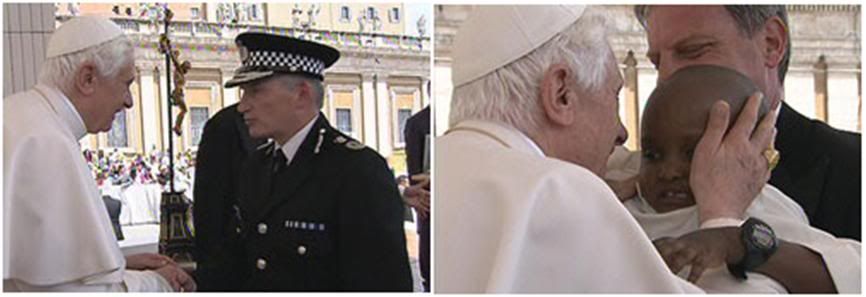
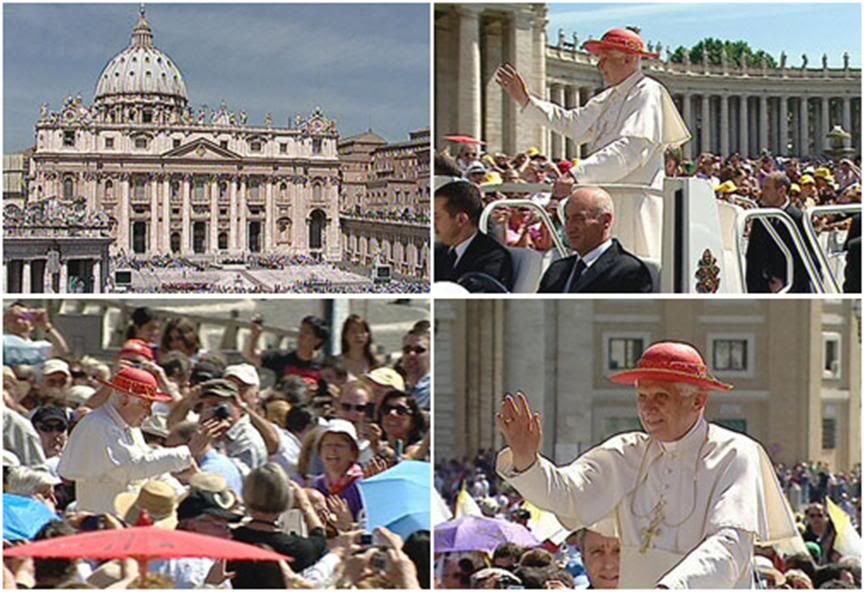 The newsphoto agencies went on a 'shooting' binge that is always brought on when the Pope wears the saturno - and these are just three samples of a virtual mini-gallery of these images:
The newsphoto agencies went on a 'shooting' binge that is always brought on when the Pope wears the saturno - and these are just three samples of a virtual mini-gallery of these images:
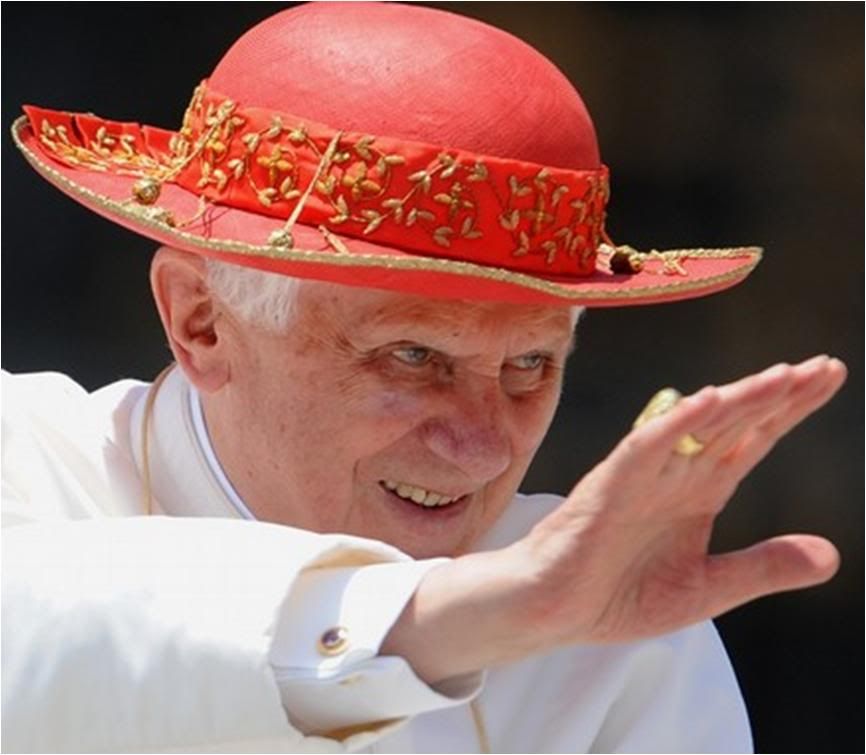
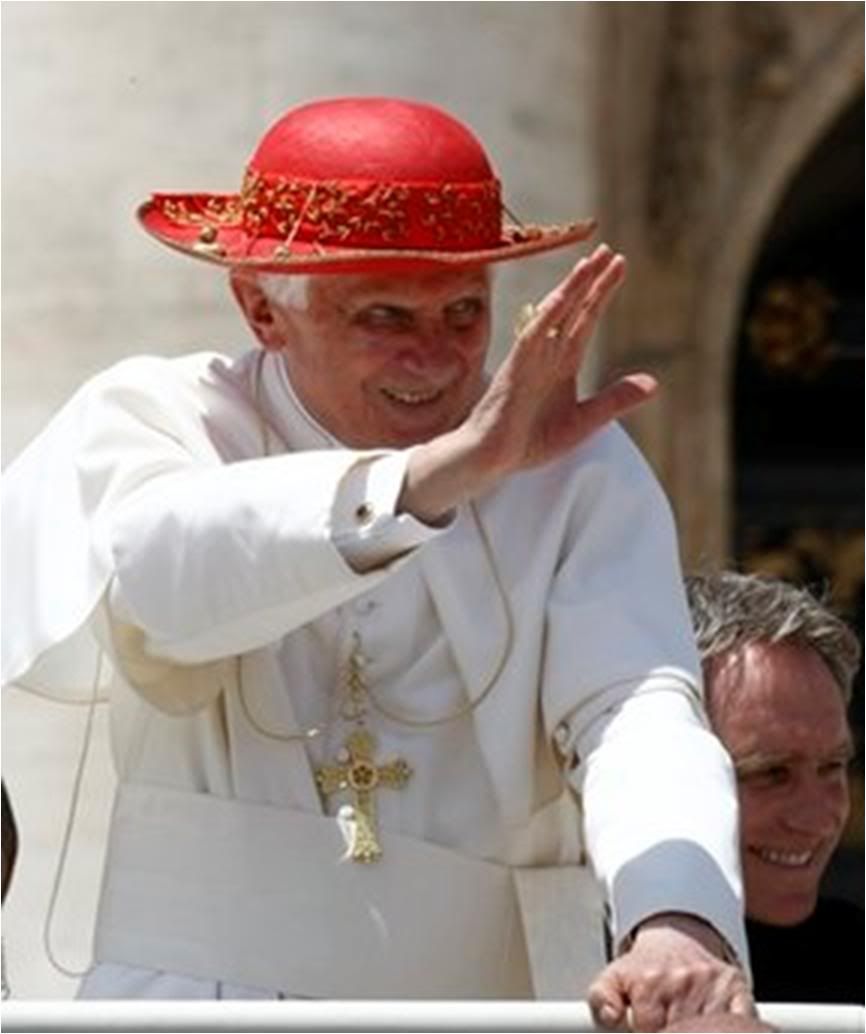
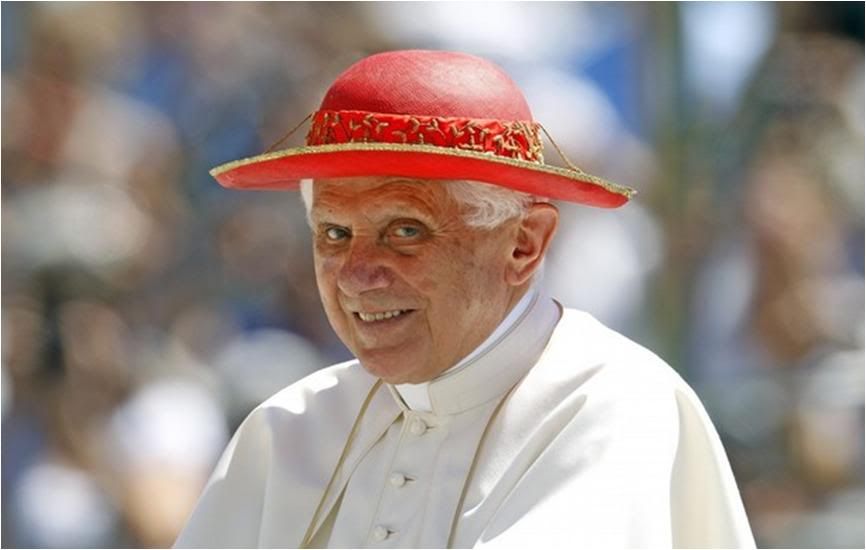 BTW, there's a picture of John XXIII wearing a white saturno - it would be nice to see B16 wear one, too, occasionally.
BTW, there's a picture of John XXIII wearing a white saturno - it would be nice to see B16 wear one, too, occasionally.
[Modificato da TERESA BENEDETTA 10/06/2010 14:23] |
| |
 09/06/2010 21:06 09/06/2010 21:06 |
|
| | | OFFLINE | | Post: 20.363
Post: 3.003 | Registrato il: 28/08/2005
Registrato il: 20/01/2009 | Administratore | Utente Master | |
|

 What Benedict XVI would like
What Benedict XVI would like
his ministers to be
by Bruno Mastroianni
Translated from

June 9, 2010
On Friday, June 11, the year for Priests comes to a close. It was a year decreed by Benedict XVI "in order to promote the aspirations of priests towards spiritual perfection on which the effectiveness of their ministry depends, above all", as he said in his letter decree.
What does Benedict XVI expect of priests? In recent catecheses, the holy Father spelled out a model of what a minister of the Church should be, based on the triple priestly mission to teach, to sanctify, and to lead.
To teach - not like a theology professor who dispenses lessons, but as one who shows the light that illuminates the sense of life and who can respond to fundamental questions.
To sanctify - not with any magical means for some specific purpose, but through the sacraments in which God gives us himself, forgives us, and makes us participate in his love.
To lead - not like someone who wants others to do things his way, but as one who sees in the authority of the Church a service for souls in order to lead them on the path of salvation.
While others are distracted by their preoccupation with a celibacy they find outmoded, with the crisis in vocations, and with priests who abuse minors, Benedict XVI has been far ahead of them in seeking to elevate the profile of the clergy in accordance with the one true mission that priests have - which is, to bring Christ to all men. [By their individual and personal examples of holiness, above all.]
For Papa Ratzinger - beyond simply arguing ecclesial sociology about whether the Church should change and 'update' some of its rules for priests - there is one fundamental and essential subject, one Person on whom we must be focused, because that is what it takes to fill up the seminaries and churches again.
Meanwhile, the news agencies - and their MSM subscriber/captive-clients around the world - choose to 'ignore' or downplay the 10,000 priests gathering in Rome to close the Year for Priests with the Successor of Peter, but on a handful of dissident Catholics advocating women priests (the only news agency photos I have seen so far show 3 people at most), with headlines in the past days like "Women's ordination advocates march on the Vatican" which changed today to something like AP's spin below - apparently, there are not enough protestors to make the word 'march' credible!
Sex abuse crisis gives
new momentum to dissidents

ROME, June 9 (AP) - The clerical sex-abuse crisis is energizing Roman Catholic dissidents who want to open up the priesthood to women and ditch celibacy requirements.
They marched on Rome on Tuesday even as Pope Benedict XVI called on priests to converge on the Vatican to cap a yearlong celebration of the priesthood. And in a sign of the deepening crisis, the faithful in traditionally Catholic Austria are at the forefront of demands for change. [Yeah, yeah, yeah! How many are there exactly who came to the Vatican???? And show us the photos!
AP would normally trumpet it from the rooftops if there were, say, 'thousands' who 'marched on Rome', but in this entire story - and in stories that publicized this 'march' in recent days - there is not one figure cited about any of the 'groups' cited.
But then, if they leave out numbers, and just use generalizations, the ordinary reader is misled to think the numbers must be significant enough to get written about! A simple trick to spin perceptions as the writer wants without actually telling a lie!
In Rome, church reformers demanded changes in the male-dominated church structure they say is responsible for covering up priestly sex abuse for decades, pressing their case on the eve of a three-day rally of the world's priests summoned by Benedict.
What was meant to be a year of celebration has turned into one marred by revelations of hundreds of new cases of clerical abuse and Vatican inaction to root out pedophile priests. [It has been, nonetheless, a year of celebration - for and by the Church, and all the 400,000 priests whose lives of daily unsung heroism are completely ignored in all the sanctimonious outrage over their erring brothers!]
Representatives from a half-dozen pro-women's ordination groups denounced Benedict's rally. [Fine! Half a dozen groups - but how many representatives came to Rome? And incidentally, what is their total membership? Dozens? Hundreds? Tens of thousands?
This is the same MSM that chose for days to play up some letter to the Pope written by 40 Italian women claiming to be priest's concubines, arguing that 'even priests need love'! DUH! If the love of Christ, whom they effectively 'marry' at ordination, does not answer their need for love, then they should not be priests at all to begin with. Or join a church that allows married priests. BTW, Italy has 40,000 Catholic priests at the moment, How's that for scale and perspective?]
"The worldwide shocking disclosures of sexual abuse in the Roman Catholic Church and its concealment for decades clearly shows the scandalous aberration that can be caused by a supervalued male priesthood with forced celibacy," said Angelica Fromm, a representative of We are Church, a reform group born after an infamous clerical abuse scandal in Austria.
We are Church is one of many reform groups calling for women's ordination and a relaxation of the church's celibacy requirement for priests.
[Obviously, I choose not to post some stories I consider to be of less than marginal interest - they usually concern groups and causes that are literally beyond the fringe of rational consideration - since there will always be an occasion eventually to make a passing reference to them without playing them up in any way, as with the concubines' letter.
Another similar fringe event that is already being heralded by the MSM is the supposed 'march' on the Vatican by victims of priest abuses. I thought that was supposed to be held this week as well.
As I commented shortly after the Papa-Day rally by Italy's lay movements, is someone like George Soros coughing up all the money it will take to bring even just a few hundred victims to Rome and house and feed them for 1-2 days? The initiators are a victim advocacy group in the USA - SNAP. When the Pope was in the USA, they talked a blue streak but never tried to mount a demonstration when they could easily have done on home ground. Why are they doing so now at the Vatican?
This is no longer about seeking justice - because the meritorious complaints have been and are getting justice in the courts and from the Church, whether voluntarily or by court order. No, the actions by these militant victims' groups and their advocates have become showcases for 'victimism', which deliberately exploits and inflames the victim's natural negative reactions to all he has experienced, while closing him off to the peace of mind that Christian forgiveness can bestow.
One looks in vain for any similar movement for and among, say, all the young children, boys and girls, who are the daily victims of sex and violence in the civilian world, and their families. And yet they have been violated just as terribly, and perhaps even worse. The difference, of course, is that these victims and ther families focus their rage on the individual offenders who have no institutional affiliation at all.
But Catholic priests belong to 'THE CHURCH' - and what secular or liberal exponent can resist taking on this prime target, knowing full well such a cause is sure to catch media attention and play out on the world scene?
P.S. I did find one report that mentions a number for the 'marchers' - 'half a dozen' - makes it more impressicve probably than just to say 'six'!
Vatican police ask women priest
campaigners to leave

Vatican City, June 8 (CNN) -- Activists campaigning for the Catholic Church to ordain women as priests were asked to leave the Vatican on Tuesday.
They argue that women in the priesthood could have helped lessen the impact of the child abuse scandal sweeping the church.
"We believe that if women had a say in the church, if there was more accountability and more transparency, that the men would have been held more accountable," said Erin Saiz Hanna, executive director of the U.S.-based Women's Ordination Conference.
The half-dozen campaigners had unfurled a banner and were handing out leaflets when Vatican police asked them to go.
They left peacefully, returning to Italian soil from the small patch in Rome controlled by the Roman Catholic Church. Vatican police regularly ask protesters to leave.
The activists were trying to draw attention to the church's refusal to allow women to be priests, bishops or deacons, they said.
One woman who was ordained in 2002 -- and was excommunicated as a result -- said the child abuse scandal was partly a result of the church's disrespect for women.
"If women and children were respected -- and that includes if they respected us enough to ordain us -- then that would set a different tone," said Mary Ann M. Schoettly.... [Yada, yada, yada... Did Priscilla and all the women disciples of Paul need to be ordained to carry out their apostolate???? Priesthood is not the only way to serve God. Go home, Ms. Schoettly, just live a productive life,, loving God and your neighbor as every Christian should - and lose your ego, as a first step!]
So there, I have duly noted the various sufferers from Church-derangement-syndrome, and leave them with the appropriate prayers that they may find spiritual healing and the gifts of the Holy Spirit.
NB: News reports and features on the closing days of the Year for Priests that are not directly related to the Holy Father are posted in the CHURCH&VATICAN thread, as are the updates on the late Mons. Padovese.

[Modificato da TERESA BENEDETTA 09/06/2010 23:27] |
| |
 10/06/2010 00:30 10/06/2010 00:30 |
|
| | | OFFLINE | | Post: 20.365
Post: 3.005 | Registrato il: 28/08/2005
Registrato il: 20/01/2009 | Administratore | Utente Master | |
|

 Ho-hum! How many times have we been through this before? The pendulum was on the upswing several weeks ago when Kirill I offered a concert in honor of Benedict XVI at the Vatican - and in the wamr-up to the event, his right-hand man, Metropolitan Hilarion, waxed optimistic about a Patriarch-Pope meeting 'in my lifetime' BUT! He did not forget, of course, to add the now obligatory Ukraine proviso. And today, Hilarion is bluntly downbeat....
Russian church says
Ho-hum! How many times have we been through this before? The pendulum was on the upswing several weeks ago when Kirill I offered a concert in honor of Benedict XVI at the Vatican - and in the wamr-up to the event, his right-hand man, Metropolitan Hilarion, waxed optimistic about a Patriarch-Pope meeting 'in my lifetime' BUT! He did not forget, of course, to add the now obligatory Ukraine proviso. And today, Hilarion is bluntly downbeat....
Russian church says
'No Patriarch-Pope talks
without Ukraine deal'

MOSCOW, June 9 (RIA-Novosti) - The heads of the Russian Orthodox and Roman Catholic churches will meet only after there is agreement on the inter-confessional situation in western Ukraine, a senior Russian Orthodox cleric said on Wednesday.
"It is too early to speak about such a meeting. There are certain problems, stemming from the recent past. First of all, the inter-religious situation in western Ukraine," Metropolitan Hilarion said at a meeting with Russian Foreign Ministry officials.
Ties between the Moscow Patriarchate and the Vatican have long been strained over accusations the Catholic Church has sought to spread its influence and convert believers in traditionally Orthodox former Soviet states. Tensions between Catholic and Russian Orthodox believers in western Ukraine are also quite acute.
Hopes for a meeting between Pope Benedict XVI and Patriarch Kirill of Moscow and All Russia have recently grown, but the Russian Orthodox Church's head of external church relations said although a meeting may be possible in the future, it was still difficult to discuss details.
"We are interested in a result. When the parties are ready to come to a conclusion that would mean a significant breakthrough in our relations, then as soon as such an understanding is reached, such a meeting will be held," Hilarion said.
As a result of the Great Schism of 1054, Christianity split into the eastern and western branches. They have a number of theological and political differences and the heads of the Catholic and Russian Orthodox Church have never met.
Perhaps I should start putting together a retrospective calendar to plot the ups and downs of statements from the Moscow Patriarchate's high command as it blows hot and cold in public over a possible meeting between Benedict XVI and Kirill I. I just wish they would stop the game!
The Pope will continue to be nice and noncommittal in public - he has never once said he looks forward to a meeting with Kirill (he's much too realistic not to fall into that naivete, not even for the sake of diplomacy) - but his attitude is probably just as it is with the entire question of Christian reunification itself: We do what we can humanly, but it's up to God to decide when it will take place!
[Modificato da TERESA BENEDETTA 10/06/2010 17:53] |
| |
 10/06/2010 16:01 10/06/2010 16:01 |
|
| | | OFFLINE | | Post: 20.366
Post: 3.006 | Registrato il: 28/08/2005
Registrato il: 20/01/2009 | Administratore | Utente Master | |
|

 June 10, Thursday, 10th Week of Ordinary Time
June 10, Thursday, 10th Week of Ordinary Time
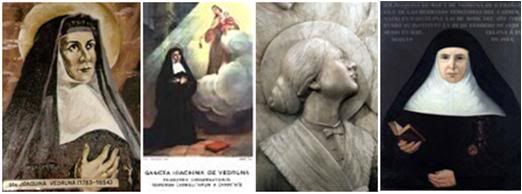 ST. JOACHIMA (JOAQUINA) VEDRUNA DE MAS (1783-1854), Lay Franciscan, Mother, Widow
ST. JOACHIMA (JOAQUINA) VEDRUNA DE MAS (1783-1854), Lay Franciscan, Mother, Widow
Founder, Carmelite Sisters of Charity
Born to an aristocratic family in Barcelona, she wanted to join the Carmelites when she was 12 but was turned down
because she was too young. At 16, her hand was sought in marriage by a wealthy landowner who was also a devout
Catholic. On her confessor's advice, she accepted. The couple became lay Franciscans and had nine children in 17
years of marriage. Her husband fought for Spain during the Napoleonic Wars but died shortly after he returned,
leaving her a widow at 33. She retired to her family's country estate to raise her children while maintaining her
personal discipline of prayer and penance. Three of her children died early, four would choose the consecrated life
themselves, and two would be married happily. At age 43, expressing a desire once again to join the Carmelites, her
spiritual confessor advised her to set up a Carmelite congregation of sisters who would help the sick and educate
poor children. Thus she founded the Carmelite Sisters of Charity, whose first convent was her country house in Vich,
outside Barcelona. Soon, the order had convents all over the Catalonia region, and eventually throughout Spain
and in Latin America. In 1849, she suffered the first of many strokes that left her paralyzed. She died during
a cholera epidemic. She was beatified in 1940 and canonized by John XXIII in 1959.
Readings for today's Mass:
www.usccb.org/nab/readings/061010.shtml
OR today.
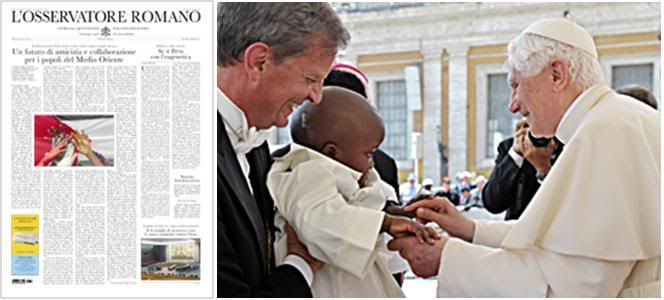
At the General Audience, the Pope reports on his visit to Cyprus
and renews his appeal for
'A future of friendship and collaboration for the peoples of the Middle East'
THE POPE'S DAY
The Holy Father met today with
- H.E. José Luis Rodríguez Zapatero, Prime Minister of Spain, and his delegation
- H.E. João Alberto Bacelar da Rocha Páris, Ambassador from Portugal, with his wife, on their farewell visit
- Rolf-Dieter Heuer, Director-General of the European Organization for Nuclear Research (CERN), with
Walter Friedemann Eder, Delegate for CERN Relations with Host Countries
- Three bishops of Brazil on ad-limina visit (Group 1. of 18 bishops making up East Sector 2)
PRAYER VIGIL WITH PRIESTS TONIGHT
Translated from

June 10, 2010
The prayer vigil on the occasion of the three-day International Meeting of Priests in Rome starts tonight at 8:30 in St. Peter's Square.
The first part of the vigil, sponsored by the Congregation for the Clergy, will feature testimonies by priests - live, through video clips, and by satellite link to some cities.
At 9:30 pm., the Holy Father will join the vigil, coming into St. Peter's Square on the Popemobile to allow him to greet the priests more closely as it goes through the various sectors.
After a greeting from Cardinal Claudio Hummes, prefect of the Congregation for the Clergy, and the reading of the Gospel, the Pope will answer selected questions sent to him by priests from all the continents.
This will be followed by the Lord's Prayer, then the solemn procession of the Eucharist which will be brought in from the Bronze Door of the Apostolic Palace.
After a moment of silence and private prayer, the Pope will read the Prayer for Priests and impart the Eucharistic Benediction.
[Some 14,000 priests, including 3500 from Italy alone, are in Rome to take in the closing ceremonies of the Year for Priests. This is the largest single gathering of priests ever, almost three times the number of priests who assembled in Rome for the Jubilee in 2000.]
[Modificato da TERESA BENEDETTA 10/06/2011 13:49] |
| |
 10/06/2010 17:51 10/06/2010 17:51 |
|
| | | OFFLINE | | Post: 20.368
Post: 3.008 | Registrato il: 28/08/2005
Registrato il: 20/01/2009 | Administratore | Utente Master | |
|
 Frankly, I am surprised not more Anglophone writers have reacted in the strognest terms possible to TIME's calculatedly-skirting-the-border-of-slander cover story... After all, even if it was for their June 7 issue, it was online as early as May 27!
Orthodox blogger defends Pope,
Frankly, I am surprised not more Anglophone writers have reacted in the strognest terms possible to TIME's calculatedly-skirting-the-border-of-slander cover story... After all, even if it was for their June 7 issue, it was online as early as May 27!
Orthodox blogger defends Pope,
questions Time magazine's 'critique'

Washington D.C., Jun 10, 2010 (CNA) - A recent spread in Time Magazine is continuing to draw criticism for its treatment of the Catholic Church, both from members of the Church and from those outside of it.

Time's 10-page cover story last week critiqued the way in which the Church, and particularity Pope Benedict XVI, have handled the sex-abuse scandal among the clergy.
In a National Review Online article on Friday, Catholic scholar and commentator George Weigel responded to the Time cover story by pointing out the errors he believed to be in it. [Weigel's article posted in full on the preceding page of this thread.]
These errors included misrepresentations of the Church's hierarchical structure and ignoring Benedict's efforts to root out abusive priests.
On June 9, blogger and writer Terry Mattingly defended Weigel's article and offered further support for his claim that the Time story provides incomplete and inaccurate information.
Mattingly, who attends an Orthodox Church in Linthicum, Maryland, writes the nationally syndicated “On Religion” column for the Scripps Howard News Service in Washington, D.C., which is sent to about 350 newspapers in North America. He has also worked as a reporter and religion columnist for the Rocky Mountain News, Charlotte Observer and Charlotte News.
In a blog post on GetReligion.org, Mattingly referenced Weigel's critique of Time's heavy use of anonymous sourcing. He agreed with Weigel's analysis, which he warned critics not to merely dismiss “as the whining of a pro-Vatican conservative.” He pointed out that “as even the Time cover notes, conservative Catholics have been some of the fiercest critics” of the bishops who have failed to respond adequately to the sex-abuse crisis.
In addition, Mattingly challenged Time's treatment of the Pope, saying that he was depicted in an inaccurate and unfair light.
“The Time article also gives a small amount of space to the voices that argue that Pope Benedict XVI has been a trailblazer in reform on this issue,” he observed.
He went on to question the title of the Time article, “Why Being Pope Means Never Having To Say You’re Sorry,” and pointed out all the ways that the Pope has responded with sorrow to the crisis.
“Obviously, the Pope has said that the sexual abuse crisis — including the episcopal cover ups — has been rooted in sin and immorality and that many leaders in the church have been guilty. He has expressed regrets. He has urged reforms. He has talked about the 'filth' that haunts the life of the Church. He has sought forgiveness from victims and has urged bishops to do the same,” Mattingly underscored.
Referring again to the title of the Times story as well as the general media coverage of the topic, Mattingly concluded by asking whether the real goal should be “actual reform in parishes and dioceses around the world” or “some form of media-friendly act of personal penance”.
[By the Pope, which is what the media demand, as though he had any personal responsibility for the scandal! Perhaps non-Catholics - and even many Catholics - do not realize that the life of a Pope, once he becomes Pope, is also and already a continuing penance for the sins of the world, insofar as he is Vicar of Christ on earth, and that he - as all Christians should be - is a 'prolongation in the world' of Christ's sacrifice of redemption.
By virtue of his office, and because of his own personal faith, the Holy Father must continually do penance in many ways, private and public - crucifixion by the media being the worst at this time. Which, for him, cannot be as extreme as the killing and persecution that Christians endure today in many places of the world.
But seculars in MSM and elsewhere demand that he beat his breast in public to assert his penitence, much like the sanctimonious Pharisee in Jesus's tale, because ostentatious sanctimony, as they themselves practice and manifest daily, is their shallow standard for penitence.
If Benedict XVI were not Catholic, probably nothing less than his ritual suicide - like a Shinto committing seppuku, or a samurai falling on his sword as the only way to 'save face' and 'redeem lost honor' - would satisfy their blood lust for 'penance'.
[Modificato da TERESA BENEDETTA 11/06/2010 04:30] |
| |
 10/06/2010 18:24 10/06/2010 18:24 |
|
| | | OFFLINE | | Post: 20.369
Post: 3.009 | Registrato il: 28/08/2005
Registrato il: 20/01/2009 | Administratore | Utente Master | |
|

 Thousands of priests rally
Thousands of priests rally
around the Pope in Rome
By NICOLE WINFIELD

ROME, June 10 (AP) - Thousands of priests from around the world have massed in Rome in one of the largest such gatherings ever in a major show of support for Pope Benedict XVI amid the clerical abuse scandal.
Benedict is expected to address them Thursday evening in an eagerly anticipated vigil service in St. Peter's Square. It's not known whether Benedict will refer to the crisis, but his No. 2 told the prelates Wednesday that the scandal had pained and damaged the Church and shown the need for a spiritual rebirth.
An estimated 9,000 priests are in Rome to celebrate the end of the church's year of the priest -- a year that has been marred by revelations of hundreds of new cases of clerical abuse and Vatican inaction to stop it. [AP's obligatory editorial slug, apparently, for this occasion!]
In addressing priests Wednesday, Cardinal Tarcisio Bertone said the revelations had harmed the credibility of the Church. But he said they had also provided a "providential realization" of the need for a "new season of spiritual renewal and rebirth." [I must look up the full text of Bertone's homily - because the way he is paraphrased here makes it appear he is saying the Church needed the scandal in order to realize the need for spiritual renewal!]
There is some speculation that Benedict may again refer to the scandal, following his recent comments en route to Portugal during which he acknowledged that it was born of the "sin within the church" and not from outside elements.
Previously Vatican officials, Vatican publications and cardinals had blamed the scandal on the media, the Masons and anti-Catholic lobbies, among others. [THE MEDIA'S OFT-REPEATED SELF-SERVING LIE! The scandal of abusive priests was never blamed on anyone but the offending priests themselves, and their superiors who mistakenly covered up for them while mostly ignorning the plight of their victims. Sensible Catholics do chastise the media and their fellow Catholic bashers for inflating the scandal beyond proportion, and resorting to distortion and misrepresentation of facts, as well as outright character assasination of the Pope, in order to advance their anti-Church liberal agendas.]
On Wednesday, during his weekly general audience, Benedict urged prayers for the priests gathered for the event, which has taken on something of the feel of a rally in support of the Pontiff amid the scandal.
Priests gathering in St. Peter's Square spoke openly about the scandal, saying it was painful to them.
"Well, I think it was really first a matter of pain, of sadness, then a bit of shame because in Belgium we had bishops, not priests who had to resign," said Belgian priest the Rev. Jean Pierre Herman.
"The Church isn't perfect. Priests are men. Among priests there are those who will become saints, there are good priests and there are criminals as well. So it happens," he said.
Said the Rev. Fernando Cerero from the diocese of Coatzacoalcos in Mexico, "We felt much shame and sadness, but this is an opportunity (for priests) to reflect on our ministry."
"It is an opportunity for holiness," he said.
God bless all the priests of the world, including those who strayed that they may do genuine penance for their sins.
I am almost shocked that AP did not find any dissident priests to quote - but then dissident priests would not have bothered to come to Rome for this event, nor for this Pope, would they?
AP, like other news agencies, dutifully filed reports yesterday on the news conferences called by the women-priest advocates and the US victims' group SNAP - but I suppose when the media saw that they, the press corps, far outnumbered the anti-Pope protestors who turned up at both events, they realized how foolish they would be to keep giving equal weight to them as to a gathering of more than 10,000 priests.
As for what the Holy Father will tell the assembled priests, he has always found the right words to say at the right place and at the right time - always somehow managing to spring a surprise - and I think it serves no purpose to speculate on it as Austin Ivereigh does... What new global policy does he need to announce anyway that has not already been spelled out in the Letter to the Irish Catholics and in many other papal statements before and since then????...
More and more, I find Mr. Ivereigh's cant insidiously malicious - and more typically 'feline' behavior (as in female cat', in his case) than anything written by Damian Thompson whom he called one recently. I'm posting his most recent blog entry to show in part why I think the membership of someone like him in the Catholic lay group supposed to promote the Church and the Pope before the papal visit to the UK is ultimately counter-productive.
Will the Pope use largest-ever meeting
of priests to announce A new global abuse policy?
by Austen Ivereigh

June 09, 2010
More than 10,000 priests from 91 countries will gather in Rome today through Friday in what is thought to be the largest ever meeting of Catholic clergy.
The three-day program of events -- mostly eucharistic, as you'd expect -- marks the close of the Year of Priests declared by Pope Benedict XVI with the object of fostering internal renewal.
It's not clear what the gathering is for, exactly,beyond the usual "deepening communion with the Holy See". [And what is wrong with that, any way? But as for why the priests are in Rome, perhaps Ivereigh would like to read the program for the International Convention of Priests, or everything that has been written about it in the past year on the site of the Congregation for the Clergy???]]
Nor is it as international as it may look: at least a third of the priests will be Italians (3,500 have confirmed their attendance). [Excuse me! How many priests can afford to come to Rome, after all? Of course, there will be more Italians since they are on home ground! And how international does it have to be? 91 countries are not enough? Should every member country of the United Nations be represented by at least one delegation?]
But given the way the image of the Catholic priest (at least in the eyes of the non-Catholic world) has plummeted this past year, it could turn out to be an immense opportunity for the successor of Peter to send out some new signals. [DUH!]
I recently gave an interview to the flagship BBC documentary program Panorama about Pope Benedict XVI's role in the clerical sex abuse crisis. They were rushing to get it finished in time to go out this week, because of the expectation that on Thursday Pope Benedict would be making a major announcement on the issue. (As it happens, the schedulers changed their mind, and the program, presented by Fergal Keane, will be broadcast later in the year).
If the Pope is going to be a major statement, it has hardly been trailed from the rooftops. But then, the Vatican communications office doesn't often go in for "curtain-raising". So watch this space.
[Everything that follows is exactly the sort of speculation that is gratuitous, pointless and condescending! But it's a way of 1) laying the writer's own expectations and mindset at the doorstep of the Pope - so that if none of what he speculates turns out to be, then he can always say HOW COULD HE HAVE FAILED TO SAY THIS??? ONLY A MORON COULD DO SO!; and 2) in the process, the writer is telling the world "Look! What a clever man I am!"]
It's impossible to imagine that the Pope will simply ignore the issue when the priests gather in St Peter's Square Thursday evening for what is described in the program as "testimonies and music, dialogue with Benedict XVI and Eucharistic adoration and benediction".
How can he address history's largest gathering of priests after a year in which the clerical sex abuse crisis has raged, and stay silent? It would be deeply disappointing - not least to priests on the frontline of public suspicion and hostility.
But if he does address it, will it be a groundbreaking statement that goes beyond his powerful Lenten letter to the Irish Church, or stay within its confines?
Will it be a largely spiritual speech, developing some of the thoughts that he has recently let slip -- that the sin is within the Church, that the "hostility" of the media is an opportunity for self-purification, and so on?
Or will he, dramatically, announce a new global policy on the Church's handling of clerical sex abuse, one which in effect extends the Anglo-Saxon model -- statutory handing-over of accusations to police and social services -- to the whole Church? I have heard that the Congregation for the Doctrine of the Faith has been working on such a new policy.
Universal guidelines are not easy to impose, because of the immense variety of juridical and political contexts in which the Church operates worldwide -- including totalitarian or failed states.
There was a case not long ago of a Kenyan woman complaining that the Church in her country had passed her allegations to the police, who had failed to act (or needed bribing to do so); the scandal, for her, was not that the bishop had covered up by failing to alert the police, but that he had shirked his responsibility precisely by handing the matter over to the police. What is seen as responsible action in one part of the world is seen as irresponsible buck-passing in another.
But Pope Benedict may have decided that the advantages of a universal "Anglo-Saxon" model for the handling of clerical sex abuse outweigh the disadvantages -- and that, in effect, he has no alternative.
He may also have decided that such a policy is the only way of putting an end to the clericalist culture of omertà exemplified recently by the views of the pre-2004 head of the Congregation for the Clergy, Cardinal Darío Castrillón Hoyos. (The Congregation's new head, the Brazilian Franciscan cardinal Claúdio Hummes, has signalled a very different approach).
The Pope must know that the "keep-it-in-the-family" response to clerical sex abuse is not an outmoded attitude in some parts of the Church -- not least Poland, which is the next place where the crisis is likely to erupt on a scale similar to Ireland; and that only by imposing statutory reporting to civil authorities can it be avoided.
Or perhaps the forces against a radical new policy are too strong and the canonical obstacles too great. Perhaps Pope Benedict will tell the priests some compelling and beautiful things about internal renewal and anchoring their lives in fidelity to Christ, while steering clear of new policies and guidelines.
Vediamo, as they say in Rome.

[Modificato da TERESA BENEDETTA 10/06/2010 19:13] |
| |
 10/06/2010 20:05 10/06/2010 20:05 |
|
| | | OFFLINE | | Post: 20.370
Post: 3.010 | Registrato il: 28/08/2005
Registrato il: 20/01/2009 | Administratore | Utente Master | |
|
 Pope and Spanish Premier discuss
Pope and Spanish Premier discuss
tensions and papal trips to Spain
By Cindy Wooden

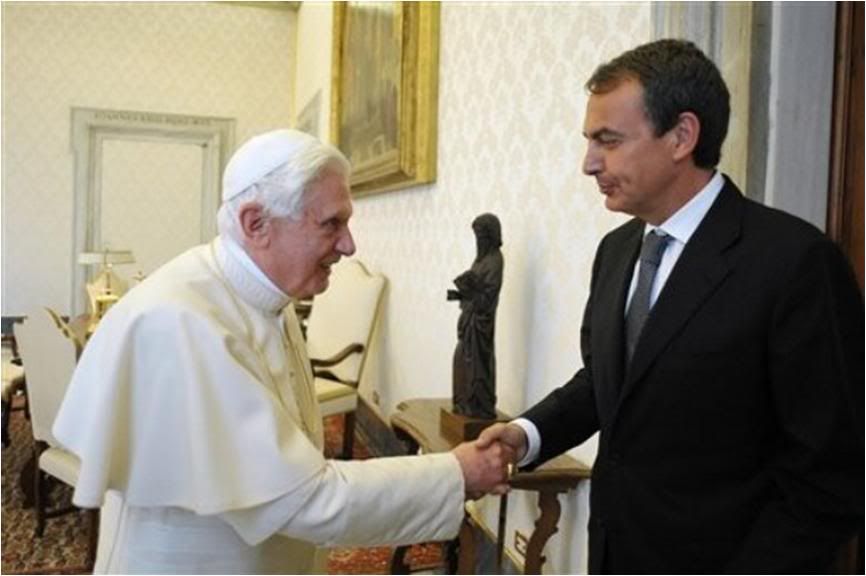
VATICAN CITY, June 10 (CNS) -- Despite his government's serious differences with the Catholic Church over abortion and other issues, Spanish Prime Minister Jose Luis Rodriguez Zapatero pledged his government's full support for Pope Benedict XVI's visits to Spain in November and again in 2011.
The Pope and Zapatero met privately for 30 minutes June 10 at the Vatican.
A Vatican statement issued after the meeting said they discussed "the current economic-financial crisis and the role of ethics," as well the situations in Central America and the Middle East.
On bilateral relations, it said, questions of concern for the Church in Spain include "the eventual presentation of a new law on religious freedom, the sacredness of human life from the moment of conception and the importance of education."
Zapatero's government has drafted a religious freedom law that would strengthen the secular character of the state, including by removing religious symbols from government-run buildings. Apparently, however, no action on the law is expected until after Pope Benedict visits the country in November.
The Pope is scheduled to visit Santiago de Compostela and Barcelona Nov. 6-7 and return to Spain in August 2011 for the celebration of World Youth Day.
The Vatican statement said that during the meeting with Zapatero, "the broadest willingness of the Spanish government to collaborate in their preparation and in the visits themselves was recognized."
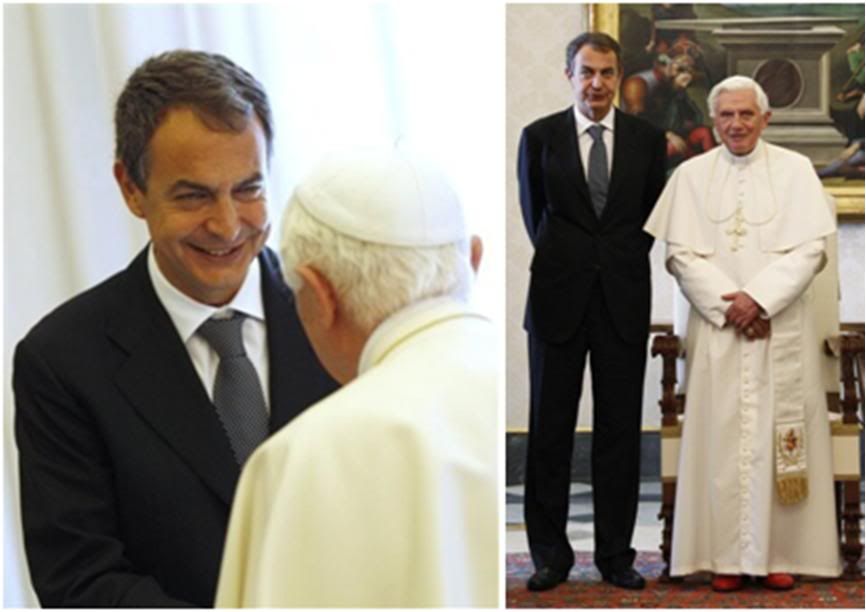
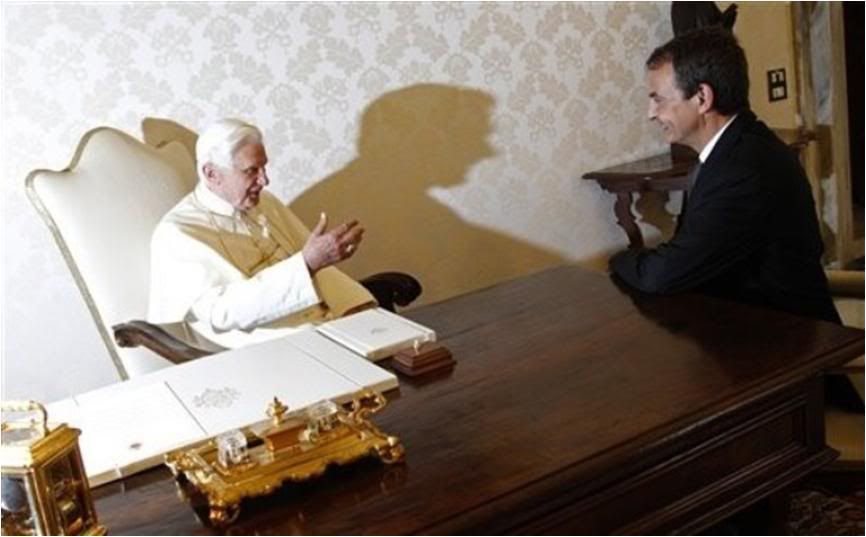 Benedict XVI speaks Spanish, but one imagines he asked for an interpreter to be present to make sure
Benedict XVI speaks Spanish, but one imagines he asked for an interpreter to be present to make sure
that he got his message across clearly and without equivocation to PM Zapatero!
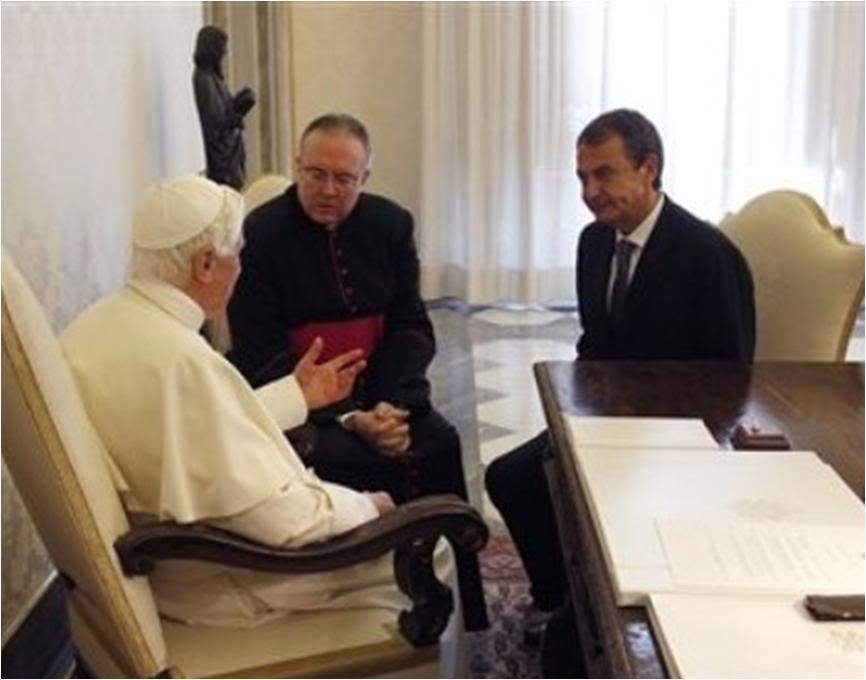
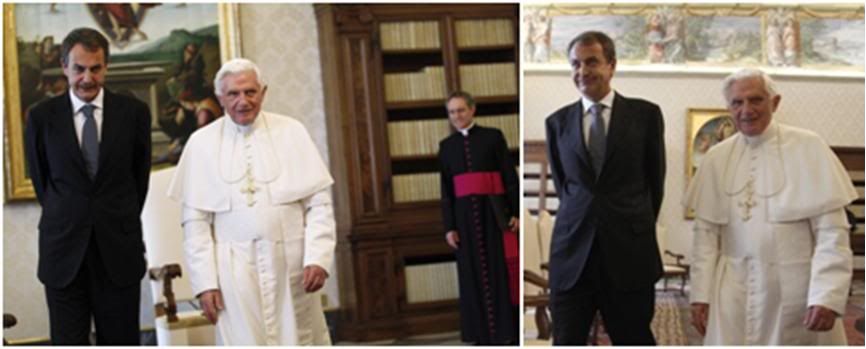
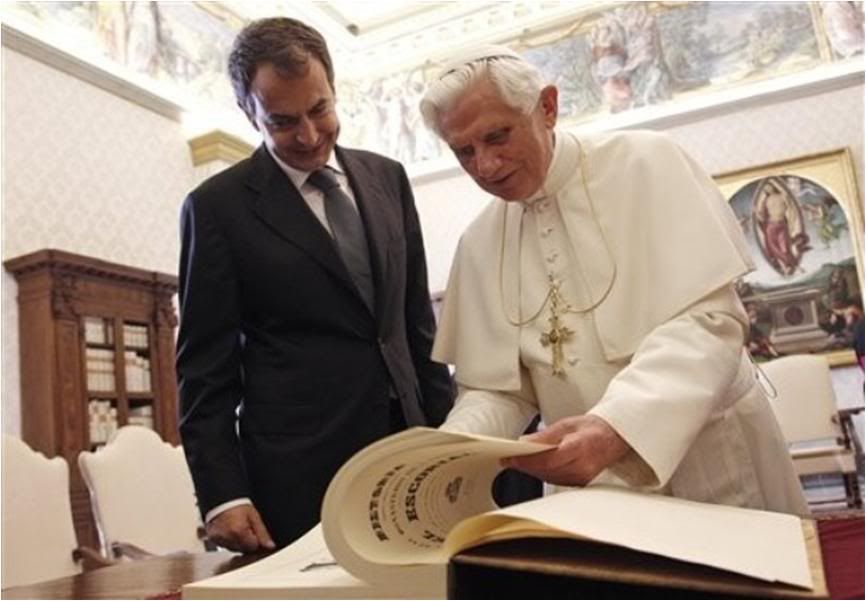
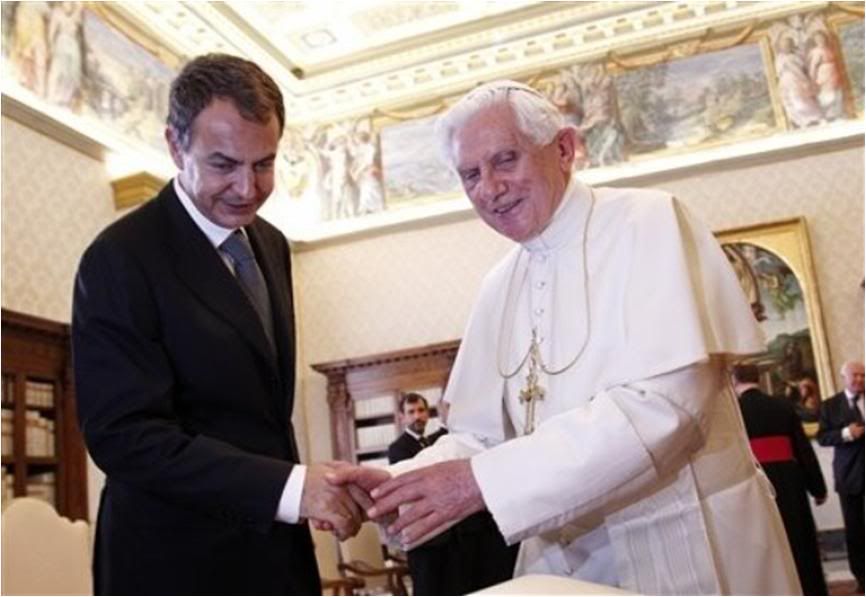 It was the second meeting between the Pope and Zapatero, who came to Valencia in July 2006 to meet with the Pope when Benedict XVI first came to Spain as Pope for the concluding ceremonies of the V World Encounter of Families.
It was the second meeting between the Pope and Zapatero, who came to Valencia in July 2006 to meet with the Pope when Benedict XVI first came to Spain as Pope for the concluding ceremonies of the V World Encounter of Families.
After the 2011 WYD, Spain will be the country most visited by Benedict XVI as Pope. As cardinal, he visited Spain at about 6 or 7 times..
Pope discusses economic crisis
and protecting the unborn
with Spanish Prime Minister

Vatican City, Jun 10, 2010 (CNA/EWTN News).- This morning Pope Benedict received the Prime Minister of Spain, Jose Luis Zapatero, at the Vatican. The two leaders discussed the role of ethics in addressing the current economic crisis in Europe as well as the need to protect the unborn after the government recently passed a law weakening restrictions on abortion.
According to the official Vatican communique on the meeting, their conversation ranged from their “opinions on Europe” to the “current economic-financial crisis and the role of ethics”. Reference was also made to countries of Central America and the Caribbean as well as to other situations, in particular the Middle East.
At the level of bilateral relations between the Holy See and Spain, they touched on “matters of current interest for the Church in Spain”, including “the possible presentation of a law on freedom of religion, the sacredness of life from conception, and the importance of education.”
In March of this year, the Socialist government under Zapatero passed a law weakening the restrictions on abortion in Spain. The new law allows women over the age of 16 to obtain the procedure up until the 14th week of pregnancy, and in some cases up until the 22nd week. The law is set to take effect on July 5.
Lastly, the upcoming papal visit to Santiago and Barcelona and next year's World Youth Day celebration, set to take place in Madrid, were mentioned.
The Vatican reported that the Pope “recognized that the Spanish government has shown great readiness to collaborate in the preparation and realization of these events.”
[Modificato da TERESA BENEDETTA 10/06/2010 20:13] |
| |
 10/06/2010 23:59 10/06/2010 23:59 |
|
| | | OFFLINE | | Post: 20.371
Post: 3.011 | Registrato il: 28/08/2005
Registrato il: 20/01/2009 | Administratore | Utente Master | |
|
 The Pope and his priests:
The Pope and his priests:
Prayer vigil and Eucharistic adoration
St. Peter's Square
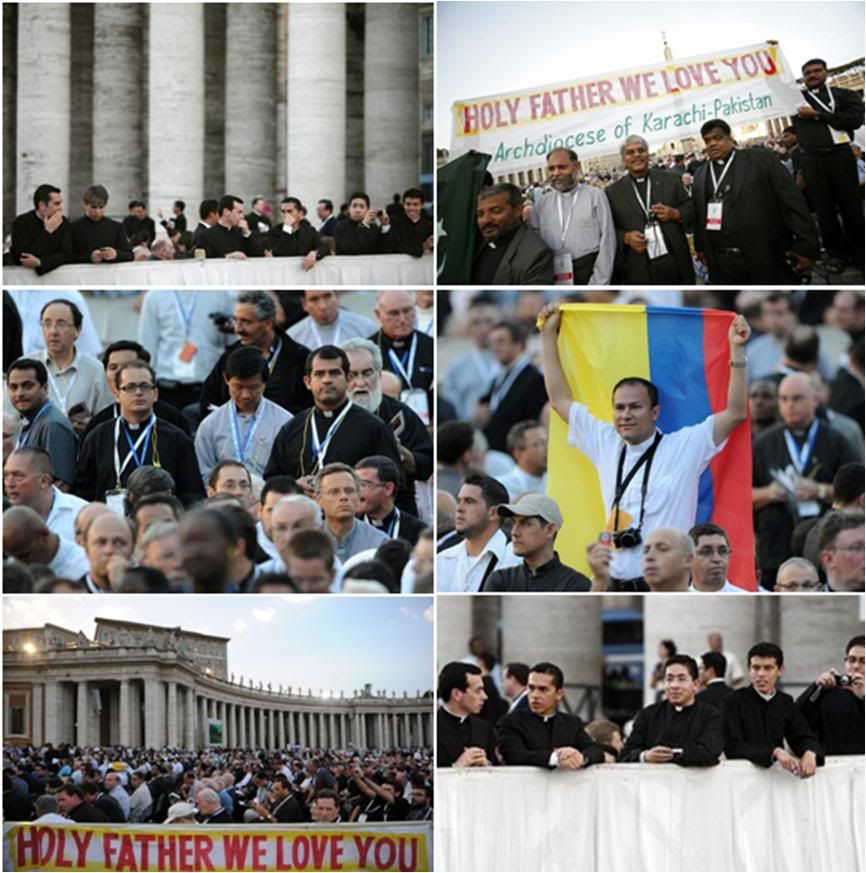 To set the scene, here's an adapted version in the past tense of the pre-event story this morning:
To set the scene, here's an adapted version in the past tense of the pre-event story this morning:
The prayer vigil on the occasion of the three-day International Meeting of Priests in Rome started at 8:30 tonight in St. Peter's Square.
The first part of the vigil, sponsored by the Congregation for the Clergy, featured testimonies by priests - live, through video clips, and by satellite link to some cities.
At 9:30 pm., the Holy Father joined the vigil, coming into St. Peter's Square on the Popemobile to allow him to greet the priests more closely as it goes through the various sectors.
After a greeting from Cardinal Claudio Hummes, prefect of the Congregation for the Clergy, and the reading of the Gospel, the Pope answered selected questions which came from priests representing each of the world's main geographical regions - Asia, Africa, Europe, the Americas and Australia-Oceania.
This was followed by the Lord's Prayer, then the solemn procession of the Eucharist which was brought in from the Bronze Door of the Apostolic Palace.
After an extended time of Adoration while a choir sang hymns, the Pope will read a Prayer for Priests and imparted the Eucharistic Benediction.
Some 14,000 priests, including 3500 from Italy alone, came to Rome to take part in the closing ceremonies of the Year for Priests. This is the largest single gathering of priests ever, almost three times the number of priests who assembled in Rome for the Jubilee in 2000.
P.S. The Congregation for the Clergy said later that at least 15,000 priests from 97 nations were present for the prayer vigil.
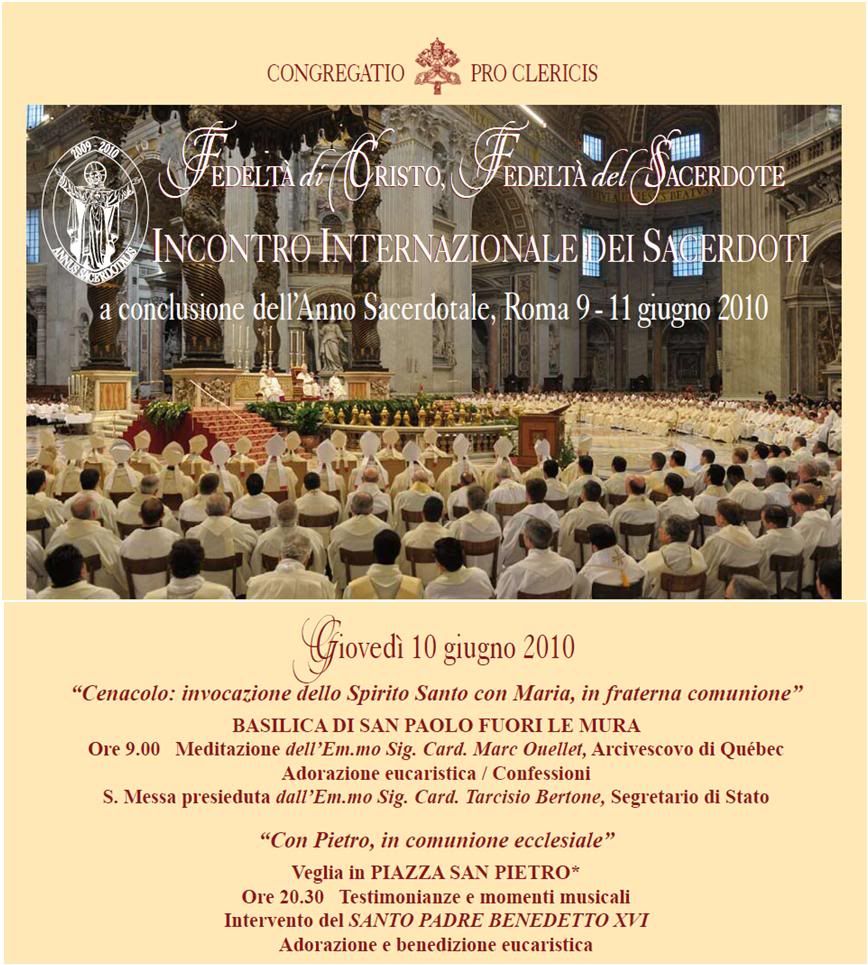
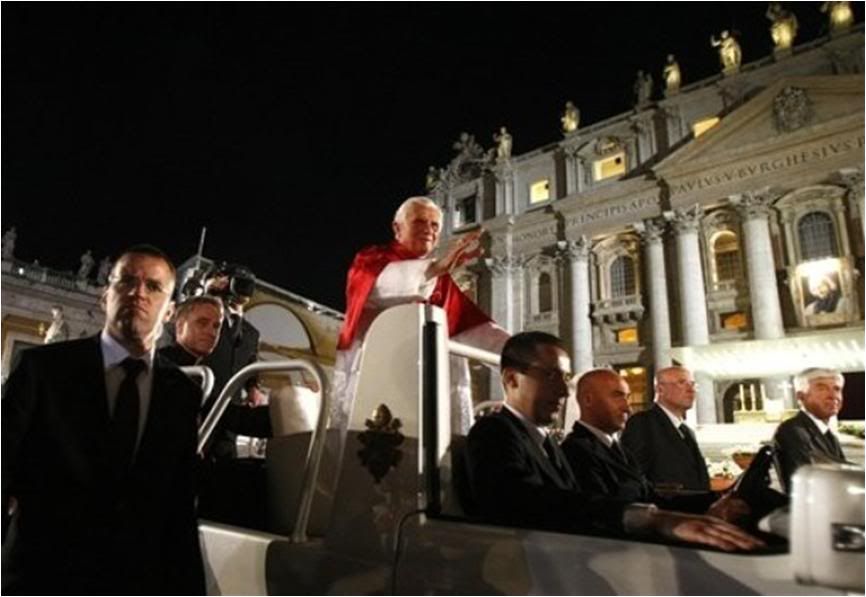
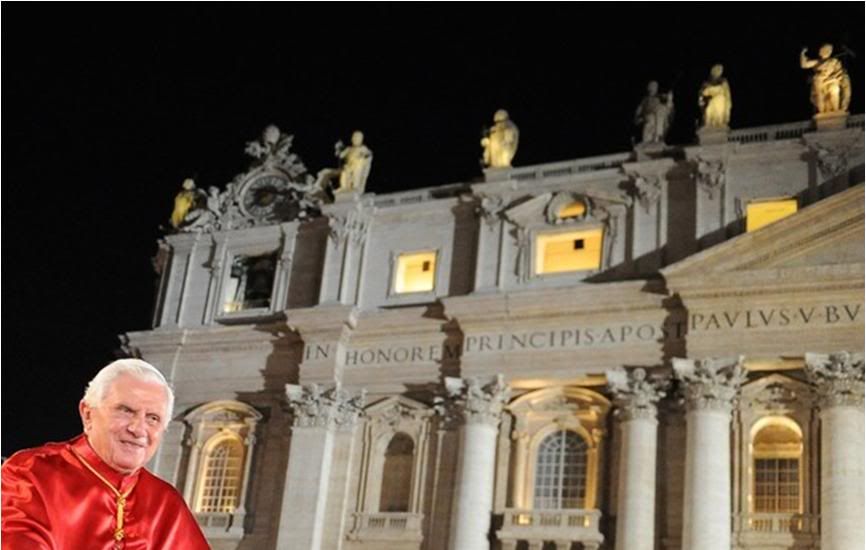
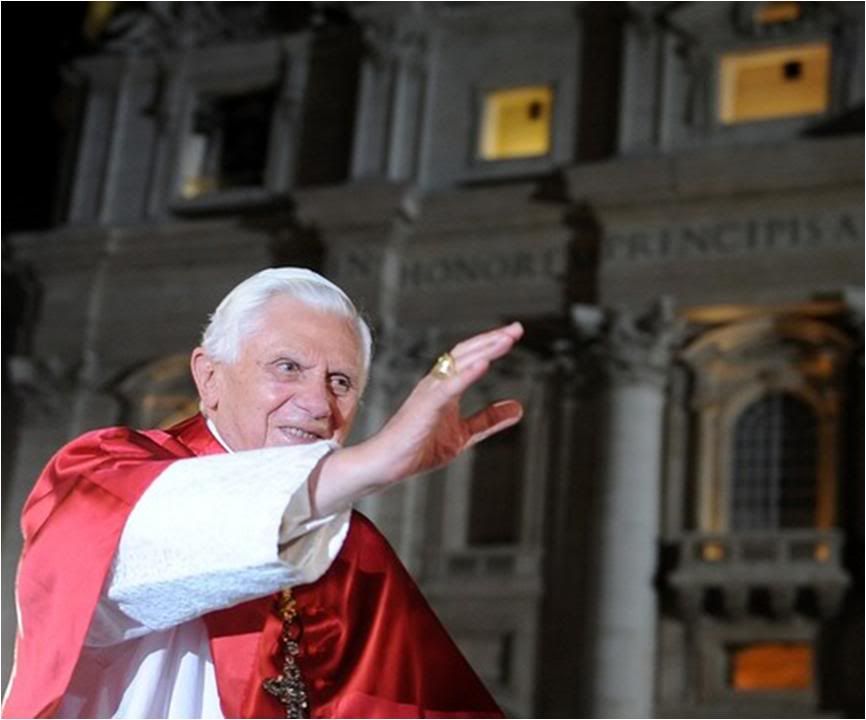
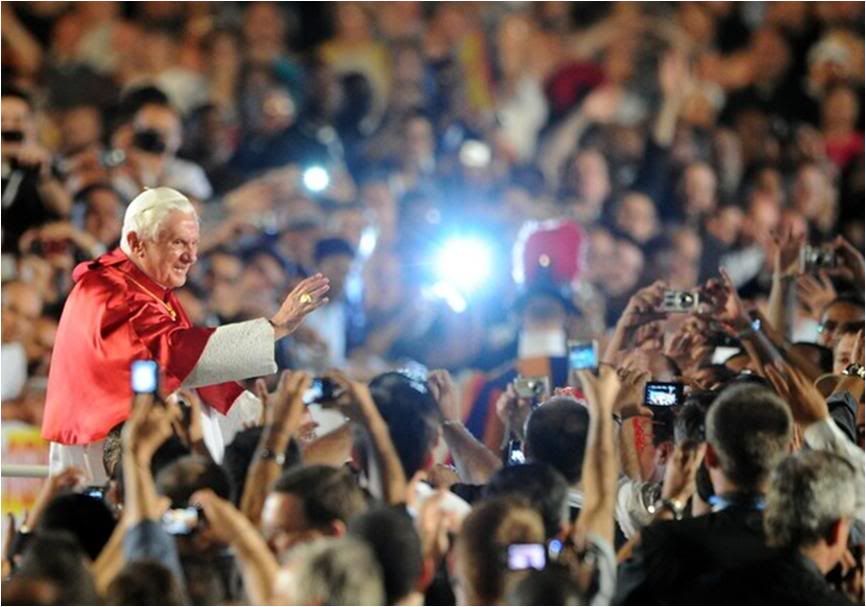
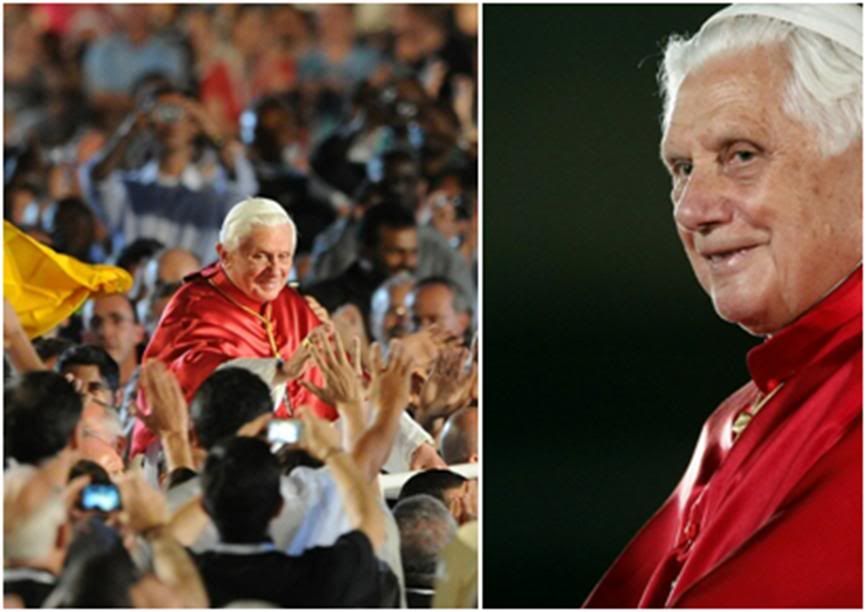
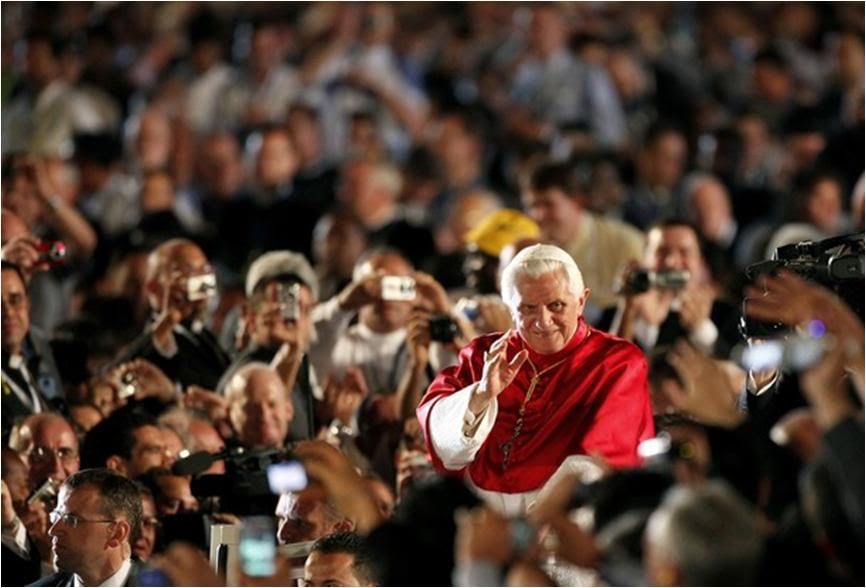
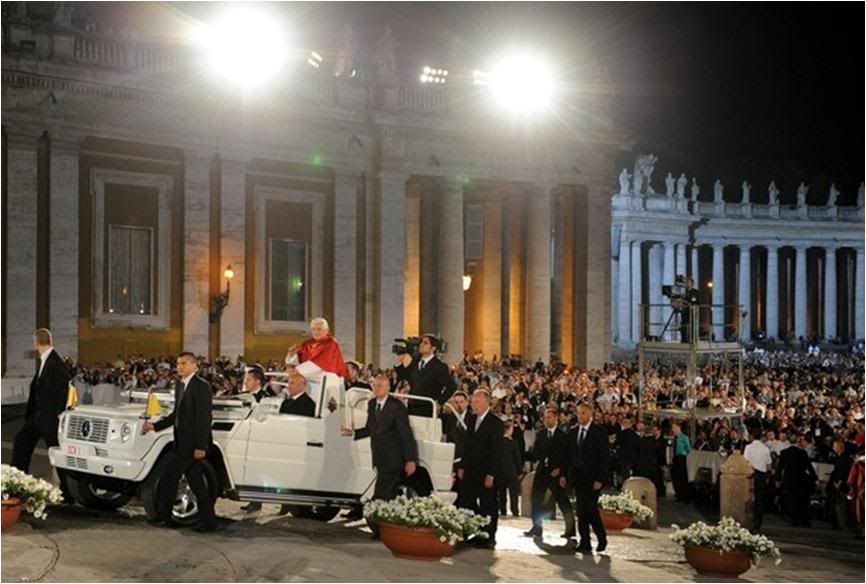
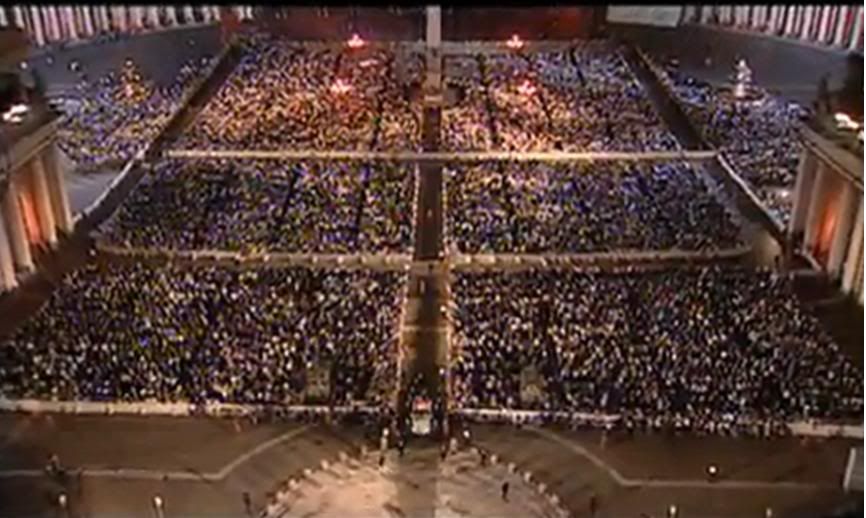 Pope defends celibacy rule
Pope defends celibacy rule
By MITCHELL LANDSBERG

June 10, 2010
VATICAN CITY - Standing before more than 10,000 Roman Catholic priests, Pope Benedict XVI on Thursday strongly reaffirmed the Vatican's commitment to priestly vows of celibacy, cutting off speculation that he might reconsider the issue in light of the church's sexual abuse scandal.
At an outdoor vigil in St. Peter's Square that veered between moments of deep reverence and outbursts of enthusiasm more characteristic of a soccer game, the pope told the gathering of priests, believed to be the largest in history, that celibacy "is made possible by the grace of God ... who asks us to transcend ourselves."
Celibacy would be a "scandal," he said, only in "a world in which God is not there."
Some critics have suggested the vow of celibacy may at least be partly responsible for the sex abuse scandal that has rocked the Catholic Church, either because it is so difficult to uphold, or because it may discourage men with normal sex drives from becoming priests.
In recent months, as the abuse scandal has widened in Europe, an Austrian bishop urged the Vatican to drop celibacy, which he said should be voluntary.
Benedict's remarks came in response to a question posed by a Slovakian priest, and he made it clear he supported continuing the practice of celibacy under his pontificate. He compared it to heterosexual marriage, which he called "the foundation of Christian culture."
The Pope did not directly address the subject of sexual abuse by priests during the ceremony, although it was raised obliquely by others, both times to loud reactions from the assembled priests.
In a salute to Benedict, Cardinal Claudio Hummes, prefect of the Congregation for the Clergy, drew loud applause when he said, "For those of us who are lost, we know Your Holiness has always forgiven and always forgives the pain that some have caused you."
Sister Maria Gloria Riva, a nun who addressed the gathering, prompted a similar response when she said, "We are the mothers of the priests, who sustain the priests at a time when they have been hit by scandal."
The vigil came during ceremonies marking the end of the Year of the Priest, which Benedict declared last year. He was scheduled to formally conclude the year with a Mass on Friday morning.
The crowd at St. Peter's consisted of 10,000 to 15,000 priests, along with several thousand others, including nuns and laypersons. Vatican spokesman Father Ciro Benedettini said he was fairly certain there had never been so many Catholic priests in one place at one time.
Benedict arrived in the late evening, making circles through the crowd in his popemobile as the priests cheered, chanted "Viva il papa!" and "Benedicto!" and waved an array of national flags reflecting their countries of origin, including Italy, Mexico, Brazil, Poland, Germany and El Salvador.
"We're preparing for the World Cup," joked Father Maurice Torres of Santiago, Chile, as he held a Chilean flag aloft.
The main event of the vigil involved Benedict answering questions from five priests, representing each of the five populated continents.
They covered issues such as the small numbers of young people joining the priesthood, the difficulty in balancing the duties of a parish priest, the potential clash of theology and doctrine, and the question of celibacy.
Several priests interviewed afterward said they were pleased with what they heard from Benedict, and that the vigil gave them a sense of renewal during a difficult period.
"The Pope was very wise in his comments, very generous to us priests," said Father David Kennedy, whose church is just outside the gates of Ft. Campbell, Ky., home of the 101st Airborne. He said the comments on celibacy were similar to what he was taught in a Benedictine monastery. "I agree with everything," he said.
His friend and traveling companion, Father Ken Mikolcik of Mayfield, Ky., agreed, adding, "We've been reminded constantly here that the Church is in need of reform and renewal."
Earlier in the evening, the crowd watched taped telecasts of priests in Buenos Aires and at Christ the King Roman Catholic Church in Hollywood. Msgr. Antonio Cacciapuoti of Christ the King described the size and diversity of the Catholic archdiocese of Los Angeles, and spoke about John Vianney, the patron saint of parish priests to whom Benedict dedicated the Year of the Priest.
In Los Angeles, an audience primarily of school students gathered at the church to watch a live feed of Cacciapuoti, who spoke on the taped message about his 100,000-strong parish, the Masses that are celebrated in 72 languages, and his efforts to bring new congregants to Christ "one person at a time."
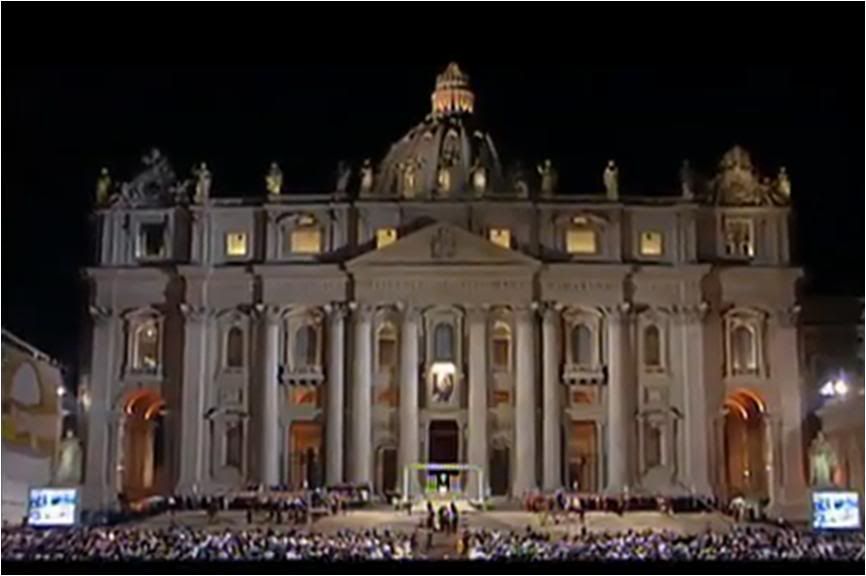
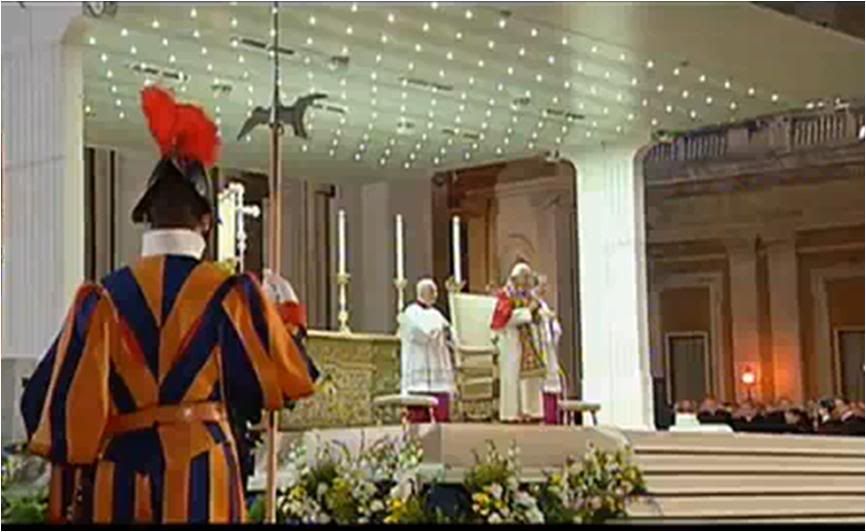
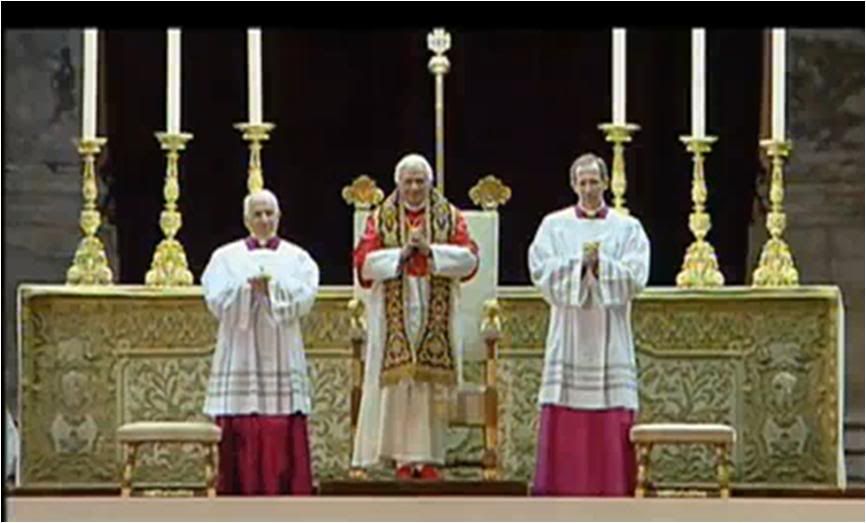
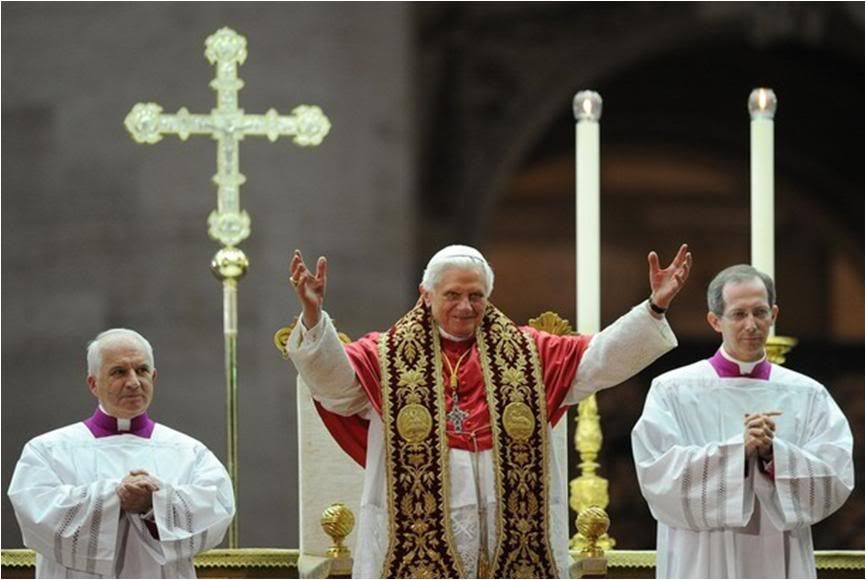
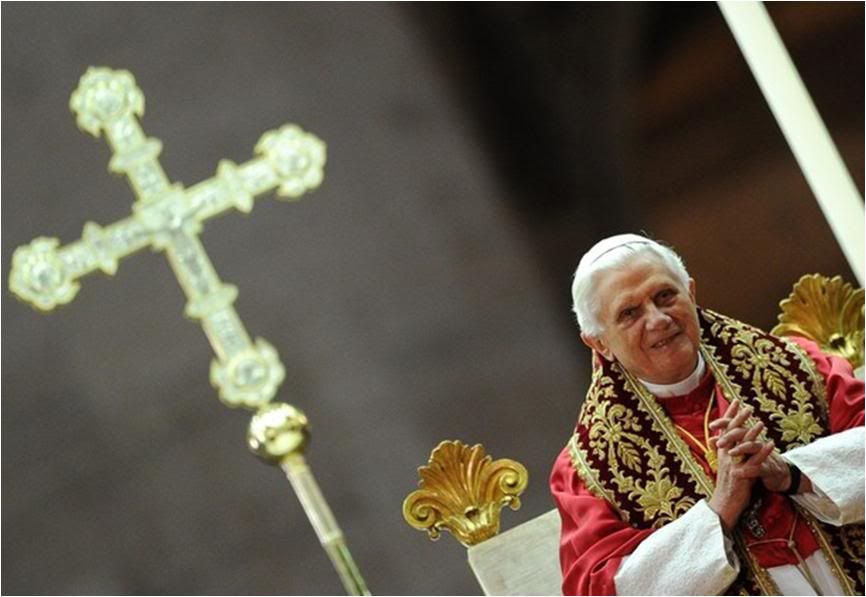
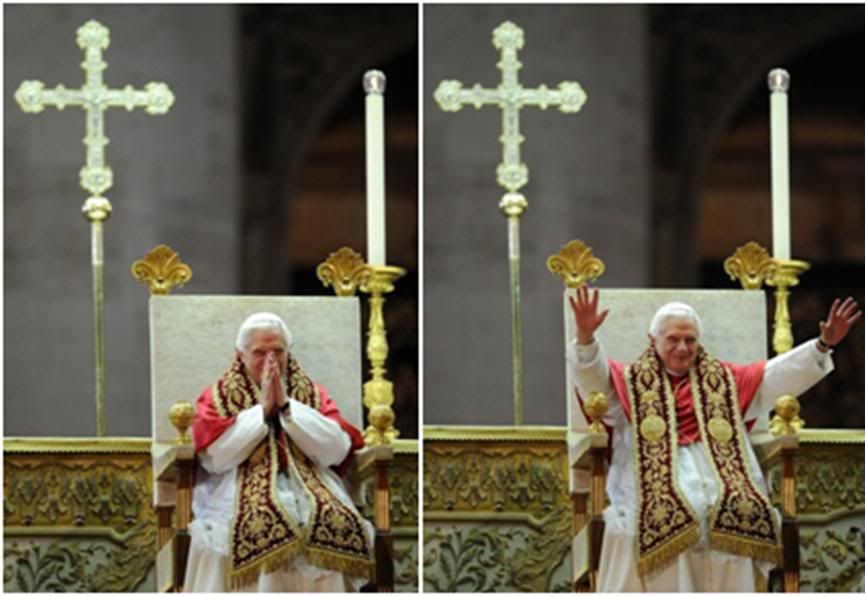
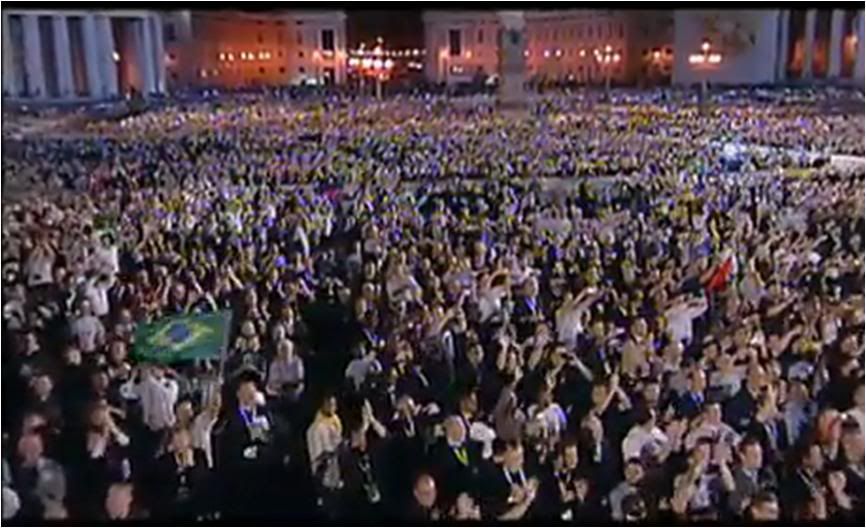
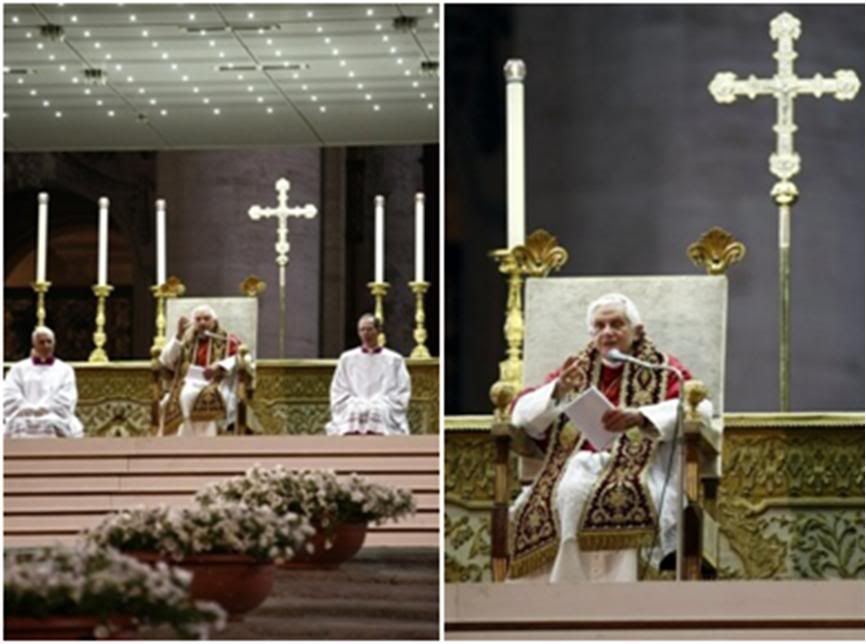
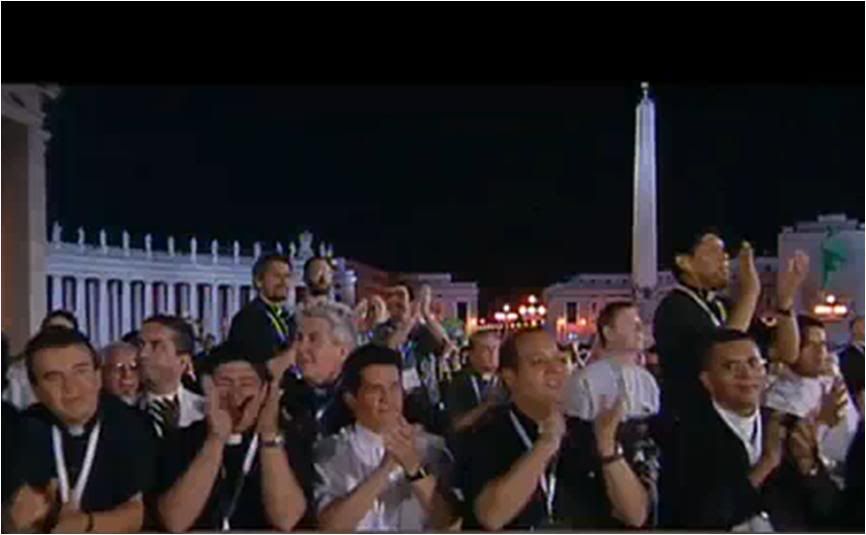
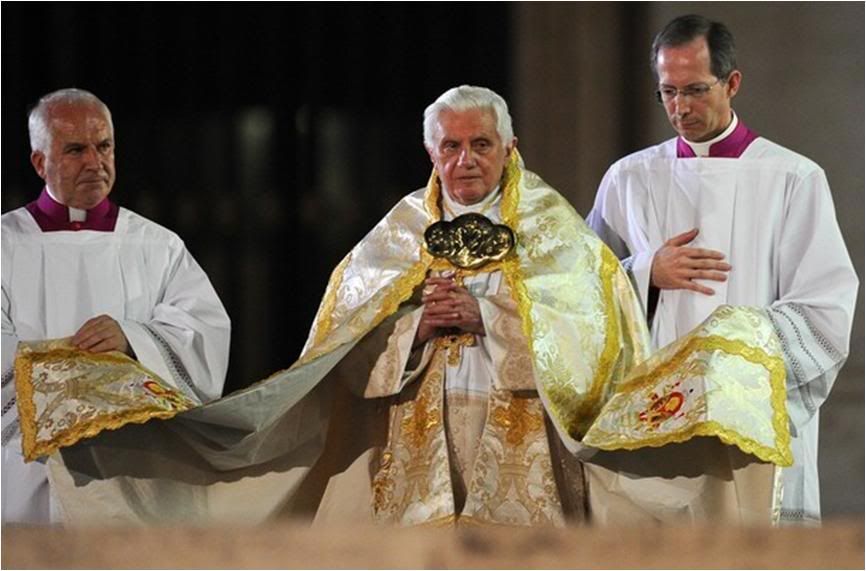
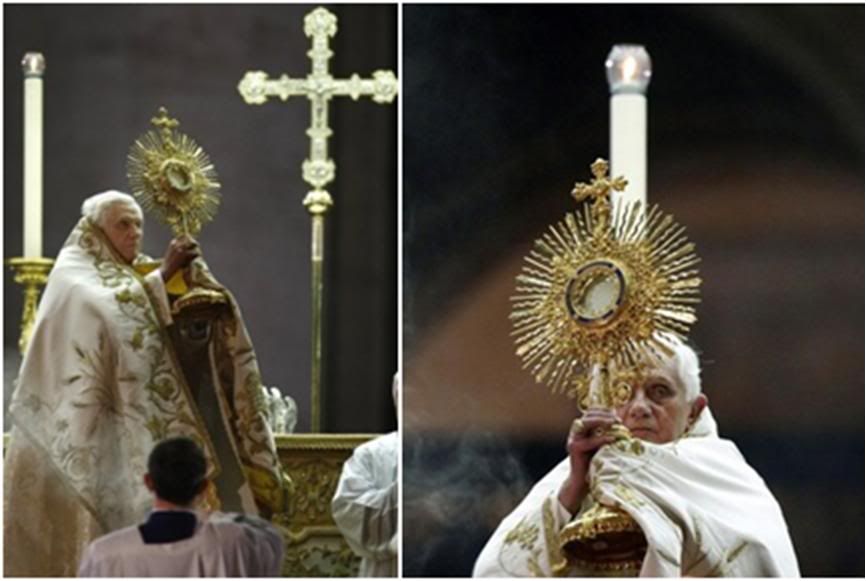
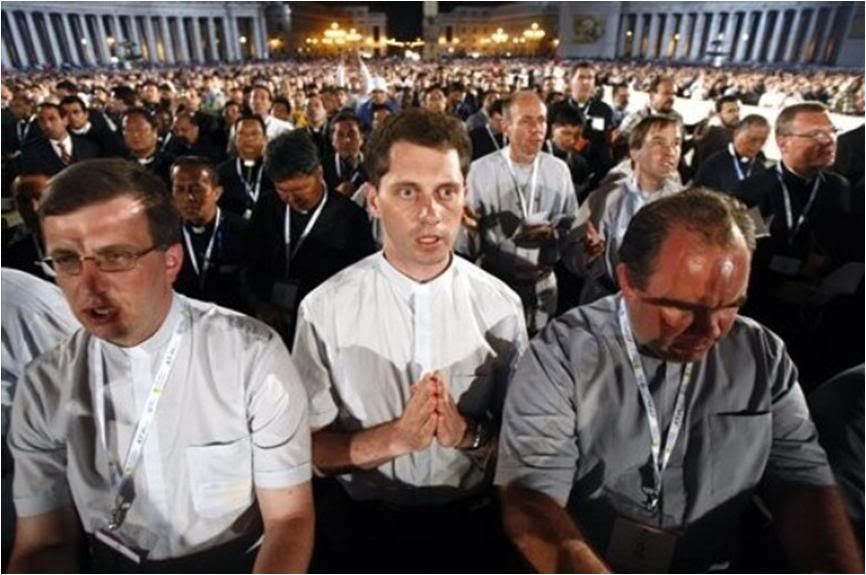
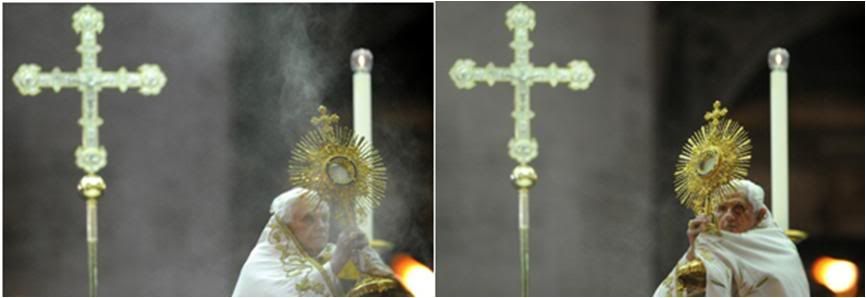
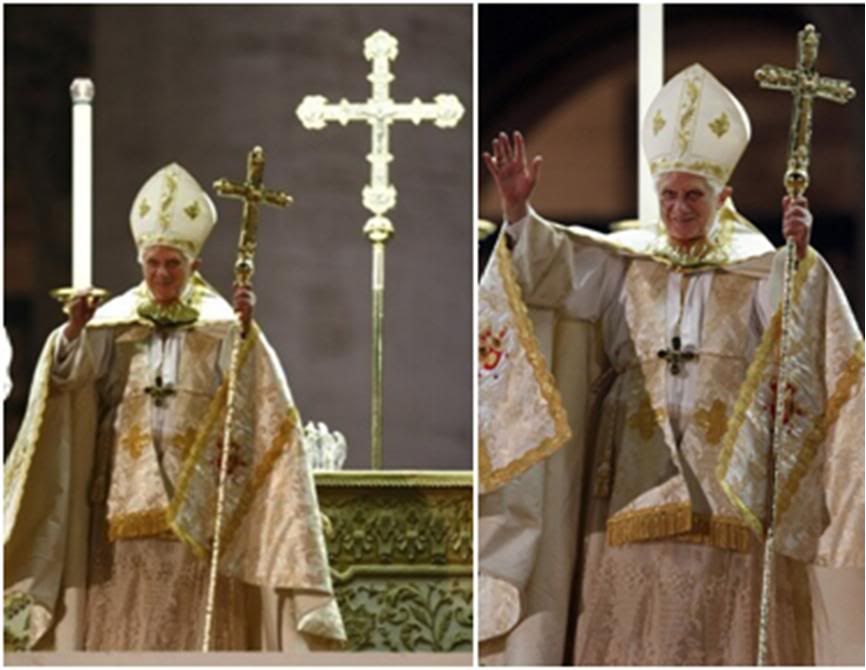 I have not seen a single photo showing the Adoration yet! The newsphoto agencies, as usual, skip important parts of liturgical rites. Not one photo of that procession of the Sacrament, and not one photo of the Adoration. Not to metnion hardly any photos of the assembly nor the setting. I had to capture some screen shots from ROME REPORTS video to get the establishing and crowd shots!
I hope many of you got to watch this event today.
I have not seen a single photo showing the Adoration yet! The newsphoto agencies, as usual, skip important parts of liturgical rites. Not one photo of that procession of the Sacrament, and not one photo of the Adoration. Not to metnion hardly any photos of the assembly nor the setting. I had to capture some screen shots from ROME REPORTS video to get the establishing and crowd shots!
I hope many of you got to watch this event today.
For most of the priests present, it must have been their first exposure to Benedict XVI speaking extemporaneously - fluidly, without any pause or hesitation, clearly, succinctly, precisely (and with great awareness of his time limit), in a way I have never heard any leader or public figure today or in recent memory speak out without a prepared text! [Fidel Castro and Hugo Chavez with their hours-long harangues are, like Hitler before them, indulging in mere rant and sheer demagoguery, babbling set pieces they can rattle off even while asleep!]
In a way we Benaddicts are now familiar with, the Holy Father freely and appositely cites St. Bonaventure, St. Augustine and St. Paul's hymn to love, as he did tonight, in these off-the-cuff responses. Tonight, I was struck by his allusion to Bonaventure's distinction between theologians of arrogance and theologians of humility, and his advice to the priests: "If you want to know what the right theology is, John Paul II gave us the Catechism of the Catholic Church. Read it, and let it be your guide for what is the right theology!"
It was nice to see that most of the priests had portable audio devices linked to a translation center so that the Pope's words in Italian could be understood by all.
The Eucharistic adoration was particularly beautiful tonight - beginning with a stately procession of the Eucharist under a baldachin carried by Swiss Guard in plain clothes - from the Bronze Door of the Apostolic Palace to the altar on the steps of St. Peter's Square. Nothing is more moving than a Eucharistic procession - no image or statue more powerful than the Eucharist - and this one moved me to tears.
The Holy Father knelt throughout the Adoration, through all the hymns sung by the choir, and in one of his most endearing habits, singing along with the hymns (you can see his lips saying the words)....
P.S. I bet the MSM will fault the Q&A for not touching on the sex-abuse issue at all... I personally think it would have been out of place for these 'normal' priests to discuss the criminal aberrations of a few, and that the repeated exhortations from the Pope that priests themselves must set the example of closeness to God, must strive constantly for holiness, fully encompass the issue of chastity. In fact, the Holy Father had a beautiful discourse on the true significance of priestly celibacy in response to one of the questions.
6/11/10
P.S. It's very frustrating not to find a single photo online - not even in the Brazilian newspapers today - of Cardinal Claudio Hummes when he delivered a greeting to the Holy Father at the prayer vigil. One Italian news agency at least reported some of what he said:
GREETING FROM CARDINAL HUMMES

VATICAN CITY, June 10 (Translated from SIR) - "We thank you from the heart, Holiness, for all that you have done, are doing, and will be doing for all priests, even those who have gone astray," Cardinal Claudio Hummmes said tonight at a prayer vigil in St. Peter's Square presided over by the Pope on the eve of the closing day of the Year for Priests.
The Prefect of the Congregation for Priests, which coordinated the worldwide events of the special jubilee year decreed by Benedict XVI in March last year, opened his greeting with these words:
"Welcome to our midst, Holy Father. All the priests present here, along with our brothers all over the world, wish to express to you their most filial devotion, their profound esteem, their sincere support and affection."
He said further:
"We wish, of course, that the Year for Priests would never end: namely, that the aspiration in every priest towards personal holiness will never end, and that in this path, which should begin in the seminary to last all our earthly life in one formative iter, we priests may always be comforted and sustained, as we were this year, by the uninterrupted prayers of the Church, by the warmth and spiritual support of all the faithful, who precisely because of their faith in the efficacy of the priestly ministry, are very often a source of profound comfort for each of us".
John Allen has a good summary of the Q&A...
As priests rally around him,
Benedict XVI defends celibacy

June 10, 2010
Though it wasn’t exactly drawn up this way, the closing ceremonies in Rome this week for the Vatican’s Year for Priests has the feel of a massive rally in support of Pope Benedict XVI, who has faced significant [and fully undeserved] criticism in recent months for his handling of the Catholic sexual abuse crisis.
A vigil service this evening in St. Peter’s Square drew an estimated 15,000 priests from 91 countries – which, assuming the count is accurate, would represent just under four percent of the total number of Catholic priests in the world.
According to Vatican Radio, this was the first time a Pope has invited priests from around the world to come to Rome for a celebration of the priesthood.
When Benedict XVI entered the square at roughly 9:30 pm Rome time, the crowd erupted into loud and sustained applause. Earlier, applause also greeted Brazilian Cardinal Claudio Hummes, prefect of the Congregation for Clergy, when he said that the priests wanted to express their “support and sincere affection” for the Pope.
The Pope returned the favor, telling the crowd that he wanted to offer “a great thank you” to the priests of the world.
“I know that so many priests give everything they have to evangelize the world and to make Christ present through the Eucharist and the other sacraments," he said.
Benedict XVI never directly addressed the sexual abuse crisis tonight – offering only one passing reference to the “insufficiencies and sins” of priests as a source of scandal. The Pontiff may speak on the crisis in a homily tomorrow morning as part of the closing Mass for the “Year of Priests.”
The centerpiece event tonight was a 45-minute question and answer session with Benedict XVI, as the Pope took five questions from priests from different parts of the world. None raised the sexual abuse crisis. Instead, topics included:
• Increasing demands on priests, especially in parts of the world where the number of priests is in decline
• A perceived split between academic theology and spirituality
• The logic for priestly celibacy in the face of mounting criticism
• The dangers of clericalism
• How to promote vocations to the priesthood
Benedict’s most interesting reflections may have come in defense of celibacy, where he didn’t invoke the customary Biblical argument (that Christ wasn’t married) or more practical considerations (that priests without families can be more available to their parishes) or even the usual spiritual explanation (that priests have a spousal relationship with the Church.)
Instead, Benedict offered an “eschatological” argument: That a priest is drawn into the life of Christ, including Christ’s condition after the resurrection, so celibacy is an “anticipation of this new world ... in which we are beyond matrimony.”
Through the priestly life of celibacy, Benedict argued, “the future breaks into today.”
Celibacy seems difficult to understand, Benedict argued, in “an agnostic world in which God doesn’t enter the picture... (when) we no longer think of a future with God, because the present of this world seems sufficient.”
Yet celibacy, the Pope said, keeps the door open to this “great truth of the faith,” by “living the future as if it already is the present.”
In a rare flash of sarcasm that drew smiles and laughter in St. Peter's Square, Benedict said that in some ways he finds post-modern criticism of celibacy surprising, since today “it’s becoming ever more fashionable not to marry.”
The Pope went on to argue, however, that the tendency to avoid marriage is at bottom a “no” to commitment, while priestly celibacy is the direct opposite – a definitive “yes” to “giving one’s life completely to God.”
On a more practical front, Benedict encouraged priests to realistically accept that none of them can do everything one might expect a priest to accomplish these days.
He advised priests to set clear priorities, including celebration of the sacraments, proclamation of the Word of God, and charity. He also counseled them not to “neglect your own soul,” saying that priests can’t encourage others to prayer and holiness if they don’t pursue those qualities themselves.
In a line that drew laughter and applause, Benedict also advised priests to have the “humility and courage” to take time for rest.
In response to the question about theology and spirituality, Benedict distinguished between two kinds of theology: A theology based on “the arrogance of reason,” which tries to “make God an object of study rather than a subject who speaks to us”; and a theology “stimulated by love, and a desire to know the beloved better.”
The latter, Benedict suggested, is the kind of theology the Church needs.
Striving to strike a positive note, the Pontiff said that while there are occasional abuses, he wanted to thank “so many theologians who help make the faith present to us today.”
A former theology professor himself, Benedict said he’s old enough to have seen three generations in the field. The “new theology” of several decades ago, he said, which saw the discipline in strictly scientific terms, today “is itself old... and frankly seems almost ridiculous.”
Warning theologians against being seduced by the fashions of their time or passing majorities of opinion, the Pope said: “The true majority in the Church are the saints, and they are the ones who should orient us.”
Benedict also recommended study of the Catechism of the Catholic Church and loyalty to the magisterium, meaning the teaching authority of the bishops in communion with the Pope. He counseled priests to be “critical” in their approach to various theological currents.
On the subject of promoting vocations, Benedict said the seeming urgency of addressing priest shortages can encourage a desire to “take the problem in hand ourselves,” with the risk of transforming the priesthood into “just another job, a profession.”
Instead, Benedict urged “insistent and determined” prayer for vocations, without compromising the “novelty and distinctiveness” of the identity of a Catholic priest.
On a more practical note, Benedict advised priests to offer “convincing” examples of priestly life, to speak openly with young people about vocations, and to create environments in parishes and elsewhere in which young people can be “surrounded by faith and the love of God.”
Prior to Benedict’s arrival in St. Peter’s Square, the crowd watched priests from different parts of the world tell their stories via satellite TV connections. One was from the United States: Monsignor Antonio Cacciapuoti, pastor of Christ the King Parish in Hollywood, California.
In keeping with the pep rally feel of the evening [Those priests didn't need pepping up for the Pope himself! And pep rally is hardly the term one can apply to a Eucharistic Adoration and Benedictiobn that followed!], Caccipuoti, speaking in English, set off cheers when he said: “We want to assure the Holy Father that we love him very much, we pray for him always, and we are very loyal to him.”
Benedict XVI chose the past twelve months as a Year for Priests in part because 2009 marked the 150th anniversary of the death of St. John Vianney. Known as the Curé d’Ars, Vianney was a 19th century French pastor and confessor who is today the patron saint of parish priests.
[Modificato da TERESA BENEDETTA 11/06/2010 23:00] |
| |
 11/06/2010 14:42 11/06/2010 14:42 |
|
| | | OFFLINE | | Post: 20.373
Post: 3.013 | Registrato il: 28/08/2005
Registrato il: 20/01/2009 | Administratore | Utente Master | |
|
 June 11, Friday, 10th Week in Ordinary Time
June 11, Friday, 10th Week in Ordinary Time
SOLEMNITY OF THE SACRED HEART OF JESUS
 Fourth from left: St. Margaret Mary Alacoque's vision of Jesus urging devotion to his Sacred Heart, 1650.
Today, the Church also remembers
ST. BARNABAS (d 61 AD), Companion of St. Paul, Missionary and Martyr, Patron of Cyprus
Fourth from left: St. Margaret Mary Alacoque's vision of Jesus urging devotion to his Sacred Heart, 1650.
Today, the Church also remembers
ST. BARNABAS (d 61 AD), Companion of St. Paul, Missionary and Martyr, Patron of Cyprus
 Third and fourth from left, from the Monastery of St. Barnabas, Famagusta: Image of the saint, and painting of the finding of his remains.
Born a Levite Jew in Cyprus, Joseph, his real name, settled in Jerusalem and and became one of the very first Christians. Barnabas, which means 'son of encouragement', was a name conferred on him by the Apostles. He sold his lands to raise money for the early Church. He vouched for Paul to Peter and the other Apostles, and later joined Paul who had retreated to Tarsus following his conversion on the road to Damascus, to convince him that his hour had come to preach Christ. In the catechesis of Benedict XVI on St. Barnabas on Jan. 31, 2007
Third and fourth from left, from the Monastery of St. Barnabas, Famagusta: Image of the saint, and painting of the finding of his remains.
Born a Levite Jew in Cyprus, Joseph, his real name, settled in Jerusalem and and became one of the very first Christians. Barnabas, which means 'son of encouragement', was a name conferred on him by the Apostles. He sold his lands to raise money for the early Church. He vouched for Paul to Peter and the other Apostles, and later joined Paul who had retreated to Tarsus following his conversion on the road to Damascus, to convince him that his hour had come to preach Christ. In the catechesis of Benedict XVI on St. Barnabas on Jan. 31, 2007
www.vatican.va/holy_father/benedict_xvi/audiences/2007/documents/hf_ben-xvi_aud_20070131...
he points out that what we call Paul's first missionary journey - which included the evangelization of Cyprus - was really Barnabas's missionary journey because it had been assigned to him by the Church of Antioch, and he took Paul as his assistant. Both attended the Council of Jerusalem in 50 AD, in which they advocated admission of Gentiles to Christianity without requiring circumcision. After their second missionary journey together. Barnabas returned to Cyprus, where he carried on evangelizing the island. According to tradition, he was preaching in Salamis when exasperated Jews dragged him from the temple and stoned him to death. He was buried in secret by his cousin and missionary companion, John Mark. The official Cyprus Church history says that in 478, he appeared in a dream to a Bishop of Salamis to reveal the spot where he was buried. It was in the nearby city of Famagusta, where the remains were found. His tomb is still venerated in the Monastery of St. Barnabas built over the burial site. Some scholars attribute to St. Barnabas the authorship of the Letter to the Hebrews.
Readings for today's Mass:
www.usccb.org/nab/readings/061110.shtml
In his catechesis on St. Barnabas, Benedict XVI made the following comment on the falling out between Paul and Barnabas after their second journey together and their subsequent reconciliation, which is very apropos today:
Holiness does not consist in never having erred or sinned. Holiness increases the capacity for conversion, for repentance, for willingness to start again and, especially, for reconciliation and forgiveness.
OR today.
 The only papal story in the issue is the Holy Father's meeting with the Prime Minister of Spain. There is a Page 1 editorial on priests as the seed for renewal of the Church, and in the inside pages, texts of discourses by Cardinal Bertone and Cardinal Marc Ouellet of Canada at the second day of the International Convention for Priests yesterday. Page 1 international news: A World Bank report that Africa needs international financial aid to guarantee its stability; and a wishful report that negotiations over its nuclear program are still possible with Iran despite new UN sanctions.
THE POPE'S DAY
Closing Mass of the Year for Priests at St. Peter's Basilica
The only papal story in the issue is the Holy Father's meeting with the Prime Minister of Spain. There is a Page 1 editorial on priests as the seed for renewal of the Church, and in the inside pages, texts of discourses by Cardinal Bertone and Cardinal Marc Ouellet of Canada at the second day of the International Convention for Priests yesterday. Page 1 international news: A World Bank report that Africa needs international financial aid to guarantee its stability; and a wishful report that negotiations over its nuclear program are still possible with Iran despite new UN sanctions.
THE POPE'S DAY
Closing Mass of the Year for Priests at St. Peter's Basilica
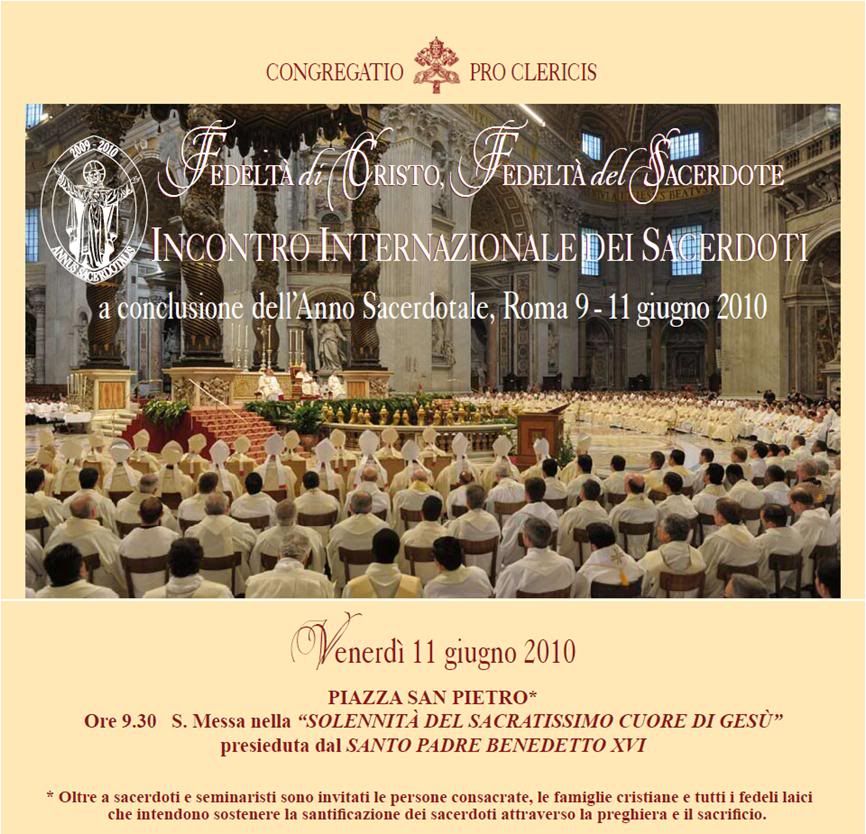

[Modificato da TERESA BENEDETTA 11/06/2010 23:54] |
| |
 11/06/2010 15:39 11/06/2010 15:39 |
|
| | | OFFLINE | | Post: 20.374
Post: 3.014 | Registrato il: 28/08/2005
Registrato il: 20/01/2009 | Administratore | Utente Master | |
|

 CONCLUDING MASS
CONCLUDING MASS
2009-2010 YEAR FOR PRIESTS
Solemnity of the Most Sacred Heart of Jesus
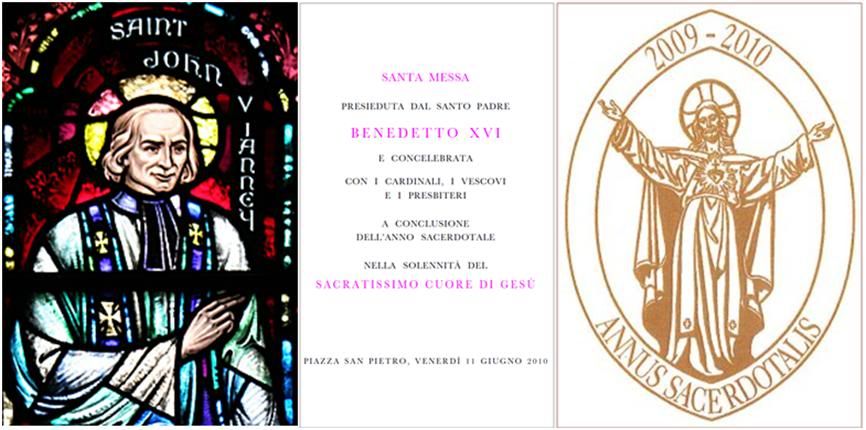
 Libretto illustrations from VITA CHRISTI, Ludolphe Le Chartreux, 1506. Bibliotheque Communale, Lyons.
Libretto illustrations from VITA CHRISTI, Ludolphe Le Chartreux, 1506. Bibliotheque Communale, Lyons.
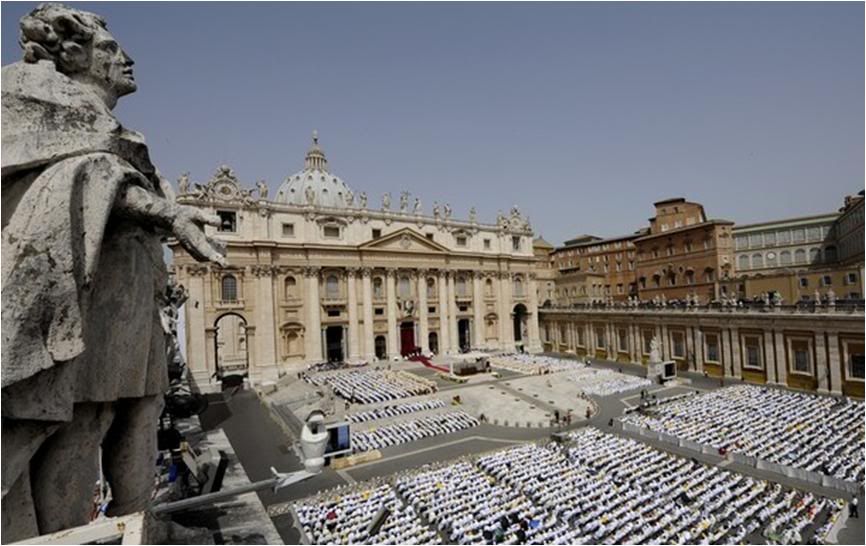
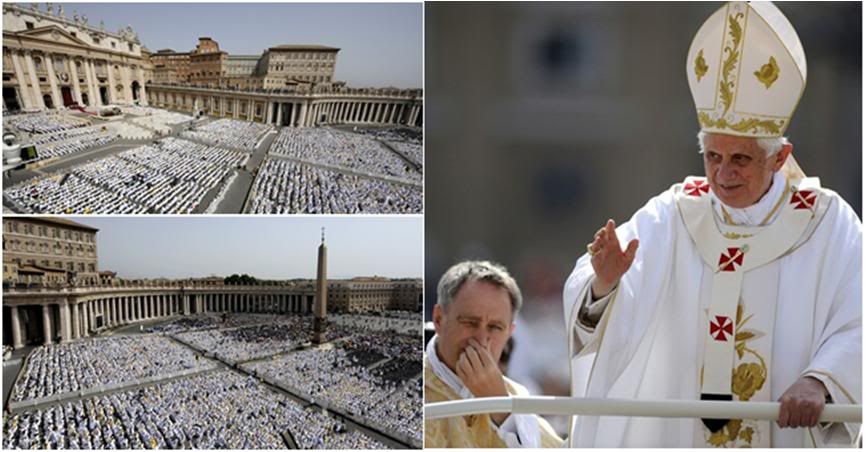
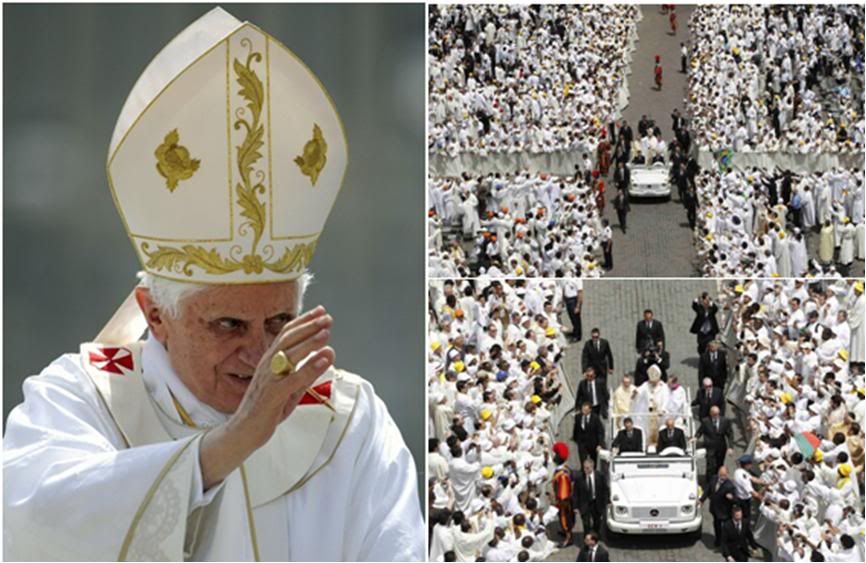
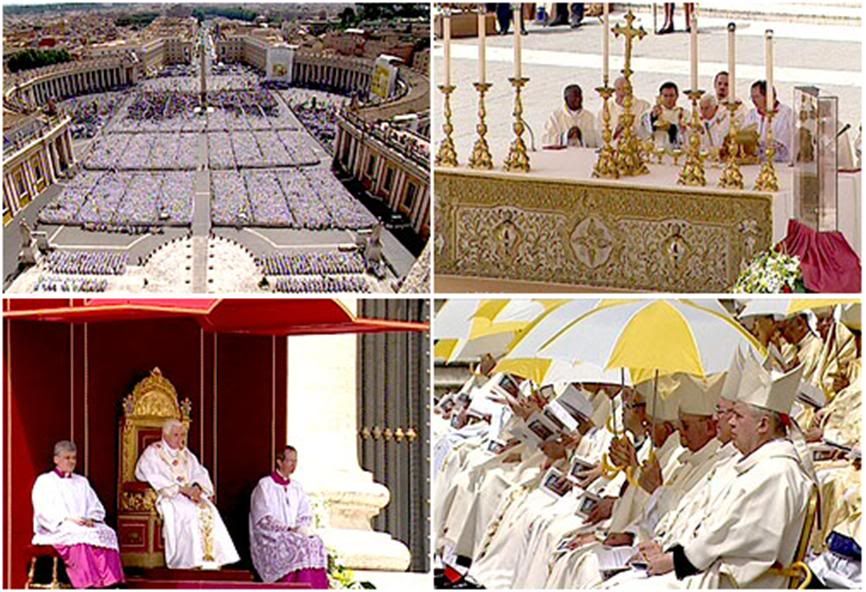 The Holy Father's homily today was a model in every way of what a homily should be: Reflections from the readings of the day's liturgy, reflections that seamlessly flowed into prayer at times. It was a most fitting illustration to the 15,000 priests from around the world who were his primarcy audience at the Mass.
The Holy Father's homily today was a model in every way of what a homily should be: Reflections from the readings of the day's liturgy, reflections that seamlessly flowed into prayer at times. It was a most fitting illustration to the 15,000 priests from around the world who were his primarcy audience at the Mass.
And yet the instant media reports about it that have raced around the globe are centered on the few lines he said about the sex-abuse scandal, accompanied by the criticism that he himself has not made a personal apology for his own sins, etc. Fortunately, the Vatican released the text of the homily in all the official Vatican languages, so it's best to read it first, and rejoice in the beauty and wisdom of the Holy Father's reflections:
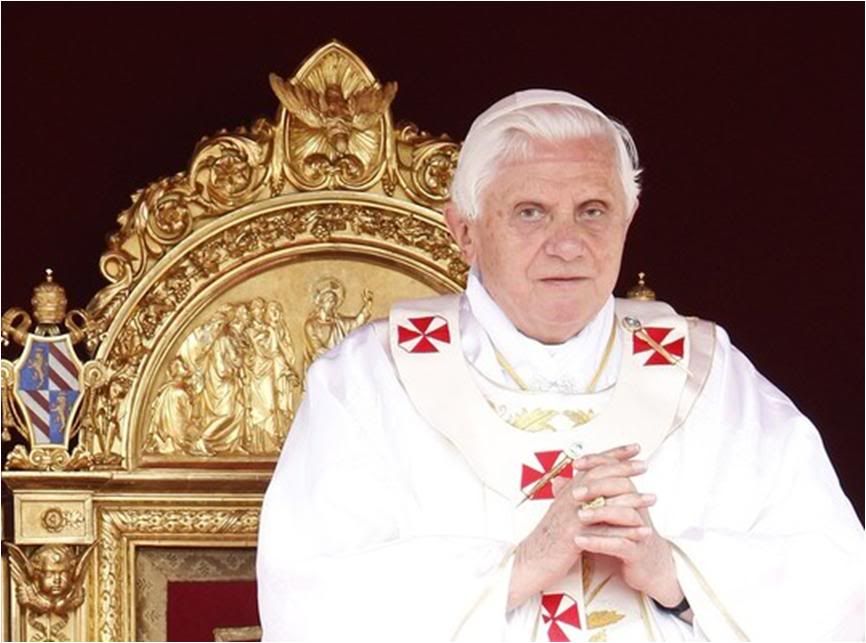
THE HOLY FATHER'S HOMILY
Dear Brothers in the Priestly Ministry,
Dear Brothers and Sisters,
The Year for Priests which we have celebrated on the one hundred and fiftieth anniversary of the death of the holy Curè of Ars, the model of priestly ministry in our world, is now coming to an end. We have let the Curé of Ars guide us to a renewed appreciation of the grandeur and beauty of the priestly ministry.
The priest is not a mere office-holder, like those which every society needs in order to carry out certain functions. Instead, he does something which no human being can do of his own power: in Christ’s name he speaks the words which absolve us of our sins and in this way he changes, starting with God, our entire life.
Over the offerings of bread and wine he speaks Christ’s words of thanksgiving, which are words of transubstantiation – words which make Christ himself present, the Risen One, his Body and Blood – words which thus transform the elements of the world, which open the world to God and unite it to him.
The priesthood, then, is not simply "office" but sacrament: God makes use of us poor men in order to be, through us, present to all men and women, and to act on their behalf. This audacity of God who entrusts himself to human beings – who, conscious of our weaknesses, nonetheless considers men capable of acting and being present in his stead – this audacity of God is the true grandeur concealed in the word "priesthood".
That God thinks that we are capable of this; that in this way he calls men to his service and thus from within binds himself to them: this is what we wanted to reflect upon and appreciate anew over the course of the past year.
We wanted to reawaken our joy at how close God is to us, and our gratitude for the fact that he entrusts himself to our infirmities; that he guides and sustains us daily.
In this way we also wanted to demonstrate once again to young people that this vocation, this fellowship of service for God and with God, does exist – and that God is indeed waiting for us to say "yes".
Together with the whole Church we wanted to make clear once again that we have to ask God for this vocation. We have to beg for workers for God’s harvest, and this petition to God is, at the same time, his own way of knocking on the hearts of young people who consider themselves able to do what God considers them able to do.
It was to be expected that this new radiance of the priesthood would not be pleasing to the "enemy"; he would have rather preferred to see it disappear, so that God would ultimately be driven out of the world.
And so it happened that, in this very year of joy for the sacrament of the priesthood, the sins of priests came to light – particularly the abuse of the little ones, in which the priesthood, whose task is to manifest God’s concern for our good, turns into its very opposite.
We too insistently beg forgiveness from God and from the persons involved, while promising to do everything possible to ensure that such abuse will never occur again; and that in admitting men to priestly ministry and in their formation we will do everything we can to weigh the authenticity of their vocation and make every effort to accompany priests along their journey, so that the Lord will protect them and watch over them in troubled situations and amid life’s dangers.
Had the Year for Priests been a glorification of our individual human performance, it would have been ruined by these events. But for us what happened was precisely the opposite: we grew in gratitude for God’s gift, a gift concealed in "earthen vessels" which ever anew, even amid human weakness, makes his love concretely present in this world.
So let us look upon all that happened as a summons to purification, as a task which we bring to the future and which makes us acknowledge and love all the more the great gift we have received from God. In this way, his gift becomes a commitment to respond to God’s courage and humility by our own courage and our own humility.
The word of God, which we have sung in the Entrance Antiphon of today’s liturgy, can speak to us, at this hour, of what it means to become and to be a priest: "Take my yoke upon you, and learn from me; for I am gentle and humble of heart" (Mt 11:29).
We are celebrating the feast of the Sacred Heart of Jesus, and in the liturgy we peer, as it were, into the heart of Jesus, opened in death by the spear of the Roman soldier. Jesus’s heart was indeed opened for us and before us – and thus God’s own heart was opened.
The liturgy interprets for us the language of Jesus’s heart, which tells us above all that God is the shepherd of mankind, and so it reveals to us Jesus’s priesthood, which is rooted deep within his heart; so too it shows us the perennial foundation and the effective criterion of all priestly ministry, which must always be anchored in the heart of Jesus and lived out from that starting-point.
Today I would like to meditate especially on those texts with which the Church in prayer responds to the word of God presented in the readings. In those chants, word (Wort) and response (Antwort) interpenetrate.
On the one hand, the chants are themselves drawn from the word of God, yet on the other, they are already our human response to that word, a response in which the word itself is communicated and enters into our lives.
The most important of those texts in today’s liturgy is Psalm 23(22) – "The Lord is my shepherd" – in which Israel at prayer received God’s self-revelation as shepherd, and made this the guide of its own life.
"The Lord is my shepherd, I shall not want": this first verse expresses joy and gratitude for the fact that God is present to and concerned for humanity. The reading from the Book of Ezechiel begins with the same theme: "I myself will look after and tend my sheep" (Ez 34:11).
God personally looks after me, after us, after all mankind. I am not abandoned, adrift in the universe and in a society which leaves me ever more lost and bewildered. God looks after me. He is not a distant God, for whom my life is worthless.
The world’s religions, as far as we can see, have always known that in the end there is only one God. But this God was distant. Evidently he had abandoned the world to other powers and forces, to other divinities. It was with these that one had to deal.
The one God was good, yet aloof. He was not dangerous, nor was he very helpful. Consequently one didn’t need to worry about him. He did not lord it over us. Oddly, this kind of thinking re-emerged during the Enlightenment.
There was still a recognition that the world presupposes a Creator. Yet this God, after making the world, had evidently withdrawn from it. The world itself had a certain set of laws by which it ran, and God did not, could not, intervene in them. God was only a remote cause.
Many perhaps did not even want God to look after them. They did not want God to get in the way. But wherever God’s loving concern is perceived as getting in the way, human beings go awry. It is fine and consoling to know that there is someone who loves me and looks after me. But it is far more important that there is a God who knows me, loves me and is concerned about me.
"I know my own and my own know me" (Jn 10:14), the Church says before the Gospel with the Lord’s words. God knows me, he is concerned about me. This thought should make us truly joyful. Let us allow it to penetrate the depths of our being.
Then let us also realize what it means: God wants us, as priests, in one tiny moment of history, to share his concern about people. As priests, we want to be persons who share his concern for men and women, who take care of them and provide them with a concrete experience of God’s concern.
Whatever the field of activity entrusted to him, the priest, with the Lord, ought to be able to say: "I know my sheep and mine know me". "
To know", in the idiom of sacred Scripture, never refers to merely exterior knowledge, like the knowledge of someone’s telephone number. "Knowing" means being inwardly close to another person. It means loving him or her.
We should strive to "know" men and women as God does and for God’s sake; we should strive to walk with them along the path of friendship with God.
Let us return to our Psalm. There we read: "He leads me in right paths for his name’s sake. Even though I walk through the darkest valley, I fear no evil; for you are with me; your rod and your staff – they comfort me" (23[22]:3ff.).
The shepherd points out the right path to those entrusted to him. He goes before them and leads them. Let us put it differently: the Lord shows us the right way to be human. He teaches us the art of being a person.
What must I do in order not to fall, not to squander my life in meaninglessness? This is precisely the question which every man and woman must ask and one which remains valid at every moment of one’s life.
How much darkness surrounds this question in our own day! We are constantly reminded of the words of Jesus, who felt compassion for the crowds because they were like a flock without a shepherd.
Lord, have mercy on us too! Show us the way! From the Gospel we know this much: he is himself the way. Living with Christ, following him – this means finding the right way, so that our lives can be meaningful and so that one day we might say: "Yes, it was good to have lived".
The people of Israel continue to be grateful to God because in the Commandments he pointed out the way of life. The great Psalm 119(118) is a unique expression of joy for this fact: we are not fumbling in the dark. God has shown us the way and how to walk aright.
The message of the Commandments was synthesized in the life of Jesus and became a living model. Thus we understand that these rules from God are not chains, but the way which he is pointing out to us. We can be glad for them and rejoice that in Christ they stand before us as a lived reality. He himself has made us glad.
By walking with Christ, we experience the joy of Revelation, and as priests we need to communicate to others our own joy at the fact that we have been shown the right way.
Then there is the phrase about the "darkest valley" through which the Lord leads us. Our path as individuals will one day lead us into the valley of the shadow of death, where no one can accompany us. Yet he will be there.
Christ himself descended into the dark night of death. Even there he will not abandon us. Even there he will lead us. "If I sink to the nether world, you are present there", says Psalm 139(138). Truly you are there, even in the throes of death, and hence our Responsorial Psalm can say: even there, in the darkest valley, I fear no evil.
When speaking of the darkest valley, we can also think of the dark valleys of temptation, discouragement and trial through which everyone has to pass. Even in these dark valleys of life he is there.
Lord, in the darkness of temptation, at the hour of dusk when all light seems to have died away, show me that you are there. Help us priests, so that we can remain beside the persons entrusted to us in these dark nights. So that we can show them your own light.
"Your rod and your staff – they comfort me": the shepherd needs the rod as protection against savage beasts ready to pounce on the flock; against robbers looking for prey. Along with the rod there is the staff which gives support and helps to make difficult crossings. Both of these are likewise part of the Church’s ministry, of the priest’s ministry.
The Church too must use the shepherd’s rod, the rod with which he protects the faith against those who falsify it, against currents which lead the flock astray. The use of the rod can actually be a service of love.
Today we can see that it has nothing to do with love when conduct unworthy of the priestly life is tolerated. Nor does it have to do with love if heresy is allowed to spread and the faith twisted and chipped away, as if it were something that we ourselves had invented. As if it were no longer God’s gift, the precious pearl which we cannot let be taken from us.
Even so, the rod must always become once again the shepherd’s staff – a staff which helps men and women to tread difficult paths and to follow the Lord.
At the end of the Psalm we read of the table which is set, the oil which anoints the head, the cup which overflows, and dwelling in the house of the Lord. In the Psalm this is an expression first and foremost of the prospect of the festal joy of being in God’s presence in the temple, of being his guest, whom he himself serves, of dwelling with him.
For us, who pray this Psalm with Christ and his Body which is the Church, this prospect of hope takes on even greater breadth and depth. We see in these words a kind of prophetic foreshadowing of the mystery of the Eucharist, in which God himself makes us his guests and offers himself to us as food – as that bread and fine wine which alone can definitively sate man’s hunger and thirst.
How can we not rejoice that one day we will be guests at the very table of God and live in his dwelling-place?
How can we not rejoice at the fact that he has commanded us: "Do this in memory of me"?
How can we not rejoice that he has enabled us to set God’s table for men and women, to give them his Body and his Blood, to offer them the precious gift of his very presence.
Truly we can pray together, with all our heart, the words of the Psalm: "Goodness and mercy shall follow me all the days of my life" (Ps 23[22]:6).
Finally, let us take a brief look at the two communion antiphons which the Church offers us in her liturgy today.
First there are the words with which Saint John concludes the account of Jesus’ crucifixion: "One of the soldiers pierced his side with a spear, and at once blood and water came out" (Jn 19:34).
The heart of Jesus is pierced by the spear. Once opened, it becomes a fountain: the water and the blood which stream forth recall the two fundamental sacraments by which the Church lives: Baptism and the Eucharist.
From the Lord’s pierced side, from his open heart, there springs the living fountain which continues to well up over the centuries and which makes the Church.
The open heart is the source of a new stream of life; here John was certainly also thinking of the prophecy of Ezechiel who saw flowing forth from the new temple a torrent bestowing fruitfulness and life (Ez 47): Jesus himself is the new temple, and his open heart is the source of a stream of new life which is communicated to us in Baptism and the Eucharist.
The liturgy of the Solemnity of the Sacred Heart of Jesus also permits another phrase, similar to this, to be used as the communion antiphon. It is taken from the Gospel of John: Whoever is thirsty, let him come to me. And let the one who believes in me drink. As the Scripture has said: "Out of his heart shall flow rivers of living water" (cf. Jn 7:37ff.)
In faith we drink, so to speak, of the living water of God’s Word. In this way the believer himself becomes a wellspring which gives living water to the parched earth of history.
We see this in the saints. We see this in Mary, that great woman of faith and love who has become in every generation a wellspring of faith, love and life.
Every Christian and every priest should become, starting from Christ, a wellspring which gives life to others. We ought to be offering life-giving water to a parched and thirst world.
Lord, we thank you because for our sake you opened your heart; because in your death and in your resurrection you became the source of life.
Give us life, make us live from you as our source, and grant that we too may be sources, wellsprings capable of bestowing the water of life in our time.
We thank you for the grace of the priestly ministry. Lord bless us, and bless all those who in our time are thirsty and continue to seek. Amen.

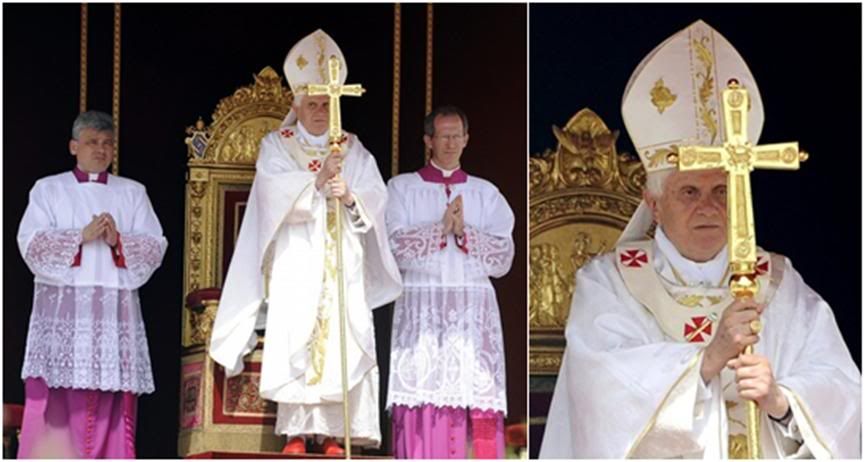
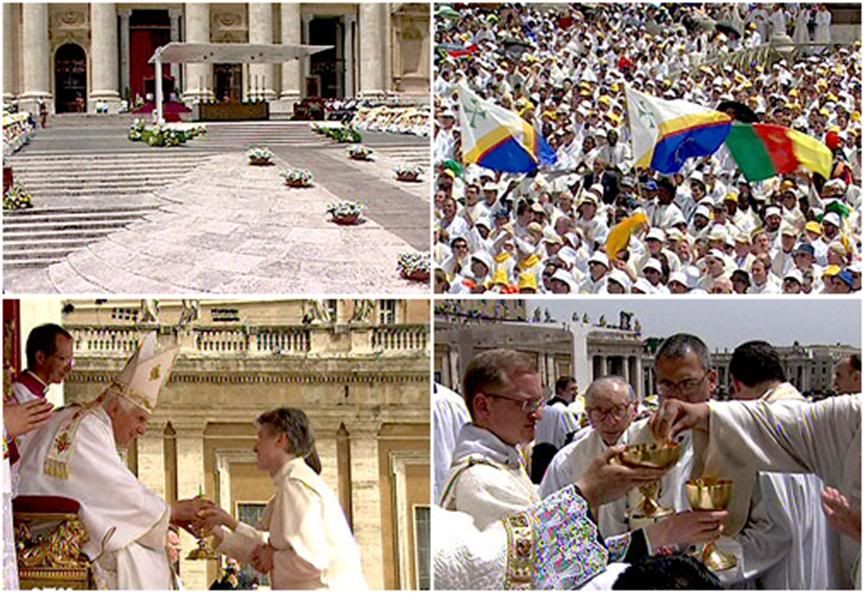 Incredibly, of all the stories I've read about the Pope's homily today - and the unanimous tone of near-gloating combined by remonstrations that he still has not gone 'far enough' - it's the New York Times story which is the 'least malicious', if you will - but still resolutely tendentious - so it's the one I am posting.
Incredibly, of all the stories I've read about the Pope's homily today - and the unanimous tone of near-gloating combined by remonstrations that he still has not gone 'far enough' - it's the New York Times story which is the 'least malicious', if you will - but still resolutely tendentious - so it's the one I am posting.
An index of the malice the other MSM stories is - not so incredibly - the outrageous claim that it is the first time the Pope has asked forgiveness from the victims!
Pope pleads for forgiveness
over abuse scandal
By RACHEL DONADIO

June 11, 2010
VATICAN CITY — Addressing the sex abuse crisis for the first time from the seat of the Roman Catholic Church
[Funny, the Pope wrote the Letter to the Irish Catholics from the Vatican! - Isn't that the seat of the Catholic Church?] , Pope Benedict XVI begged forgiveness on Friday, saying the church would do “everything possible” to prevent priests from abusing children.
“We, too, insistently beg forgiveness from God and from the persons involved, while promising to do everything possible to ensure that such abuse will never occur again,” Benedict told thousands of priests and faithful gathered in Saint Peter’s Square for celebrations marking the end of the Vatican’s Year of the Priest.
The Pope’s remarks did not substantively go beyond what he had already said in a letter to Irish Catholics in March and in a private meeting with victims of sex abuse on Malta in April, but it was the first time Benedict had mentioned the crisis from Saint Peter’s Basilica, the heart of the church itself, and on an occasion focused on priests. [I have to check back on that statement. The Holy Father has spoken about this problem so many times and on so many occasions, but the MSM somehow always report each statement as if it was the first time he was saying it, give or take some piddling qualification like Donadio makes!]
“In this very year of joy for the sacrament of the priesthood, the sins of priests came to light — particularly the abuse of the little ones,” the pope said.
He added, “In admitting men to priestly ministry and in their formation we will do everything we can to weigh the authenticity of their vocation and make every effort to accompany priests along their journey, so that the Lord will protect them and watch over them in troubled situations and amid life’s dangers.”
The Pope did not mention any specific actions the Church was planning to take to combat abuse, as some had hoped, and victims’ groups said Benedict’s remarks did not go far enough. [Grow up already, everyone! He was preaching a homily, not issuing a papal instruction or a policy paper! Donadio should know that well enough, but she chooses to echo the Pavlov-dog reaction of the victims' advocate (not a victim) who must be basking in the glow of having every statement she makes given the same weight by the media as a statement by the Pope!]
“The root cause of this horrific and ongoing clergy sex abuse and cover up crisis remains the nearly limitless power of bishops,” said Barbara Blaine, the president of the Survivors Network of those Abused by Priests, in a statement.
“There must be a worldwide Catholic policy against clergy sex crimes and cover-ups that is widely enforced. And we still don’t have it,” she added.
[The following two paragraphs constitute MSM's current herd line, implying that the Pope has said what he has sadi and that the Vatican has 'changed its tone' because of relentless media pressure. BAH, HUMBUG! Or, as they call it today, SHEER SPIN, in an attempt to justify themselves even as they have boxed themselves into a corner over the Pope's personal 'guilt'!]
Yet the Pope’s remarks on Friday seemed to signal a growing awareness of the extent of the crisis. They came weeks after the pope had said in Portugal that the greatest threat to the church came from “the sin inside the church” rather than outside and added that “forgiveness is not a substitute for justice.”
The Vatican hierarchy has also begun to shift its tone. Earlier this spring, the Vatican newspaper, L’Osservatore Romano, dismissed news reports questioning the pope’s role handling abuse as archbishop of Munich in 1980 and as prefect for the Vatican’s doctrinal office as a calumnious “attack.” [But they were calumnious attacks! If they weren't, would the New York Times have dropped the issue like a hot potato, after they had tried to mine it for maximum harm against the Pope for at least two weeks? It was, in retrospect, a virtual nine-day wonder that had no legs, although it did manage to sow speculation as slander all around!]
On Thursday, it said in a front-page editorial that “the infidelity, even profound, of some priests in some parts of the world has in fact cast a shadow over the credibility of the church in the eyes of many people.”
“The wound will take time to heal and nothing will be as if nothing had happened,” it added.
“Some have called it an ‘annus horribilis,’ but in reality it has been a year of grace,” the paper wrote, because “the seed of the priests’ inner renewal that has been planted and their more incisive witness of the Gospel will bear fruit.”
In Saint Peter’s Square on Friday, the Rev. Innocent Jooji, a priest from Abuja, Nigeria, said he welcomed the Pope’s remarks on the sex abuse crisis, and wished he would say more. “This is not only the problem of the west, it is a global problem,” Father Jooji said.
“He should go around to a few continents to talk about sex abuse, and the impact would be more,” he added of Benedict. “It’s a problem to face. We need more conversation.”
[Typical MSM trick. Out of 15,000 priests present, the writer chooses to quote someone who is critical, and cannot find anyone who is less equivocal!]
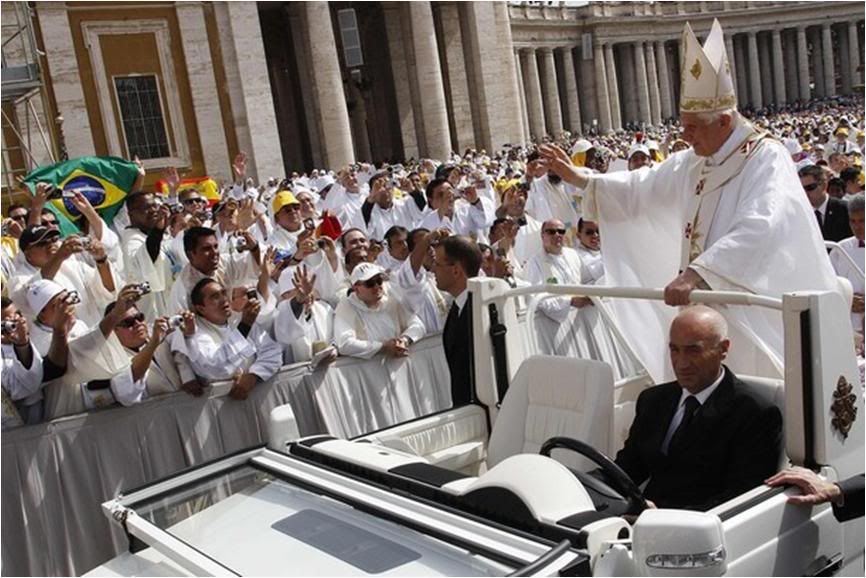
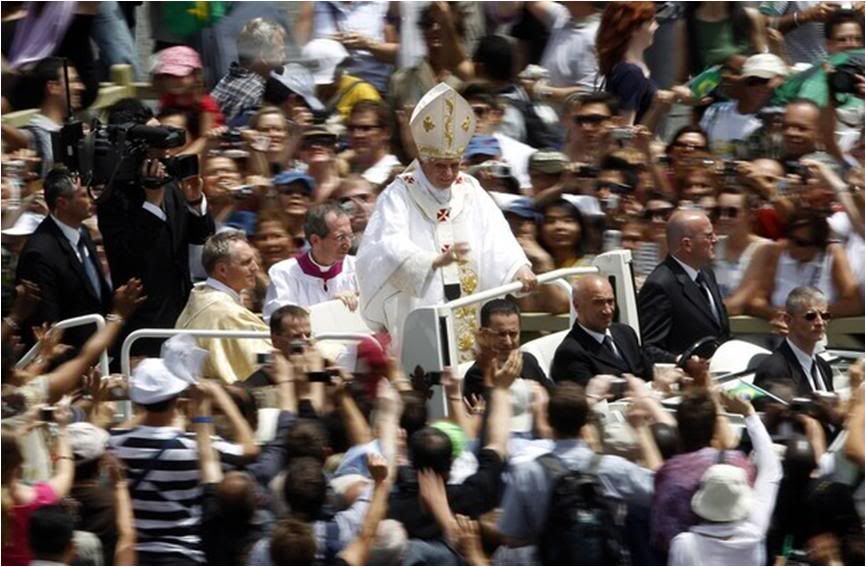
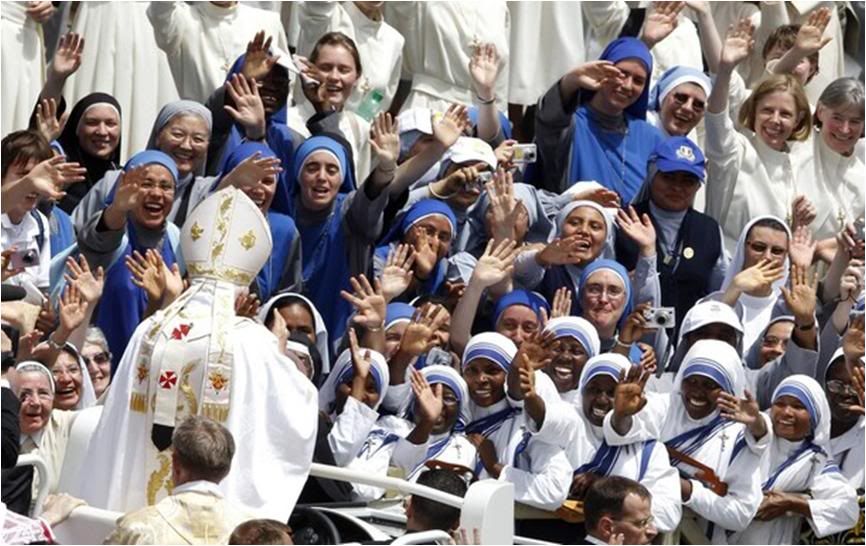
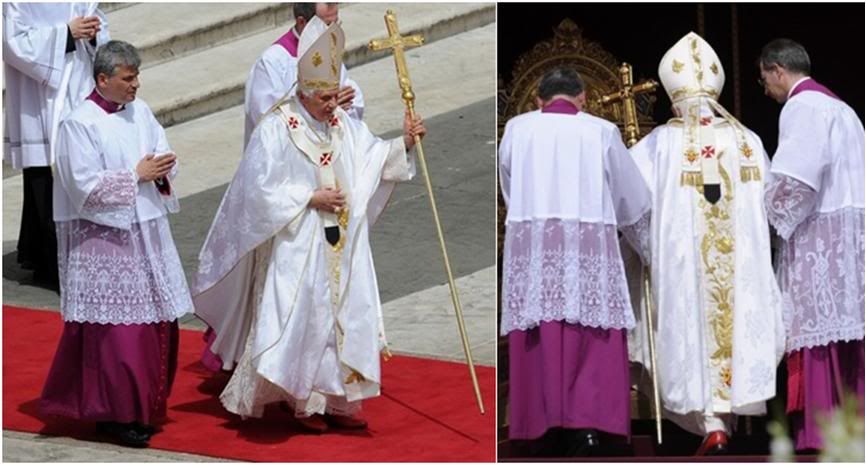 Newsphoto agencies never fail to include a couple of shots showing the Pope being helped up and down steps (an attention one normally gives older people, after all) - which, I suppose, is their way of saying 'He's old so he needs help'. Belied, of course, by photographs like the one on the left, where he strides vigorously as he normally does!
Newsphoto agencies never fail to include a couple of shots showing the Pope being helped up and down steps (an attention one normally gives older people, after all) - which, I suppose, is their way of saying 'He's old so he needs help'. Belied, of course, by photographs like the one on the left, where he strides vigorously as he normally does!
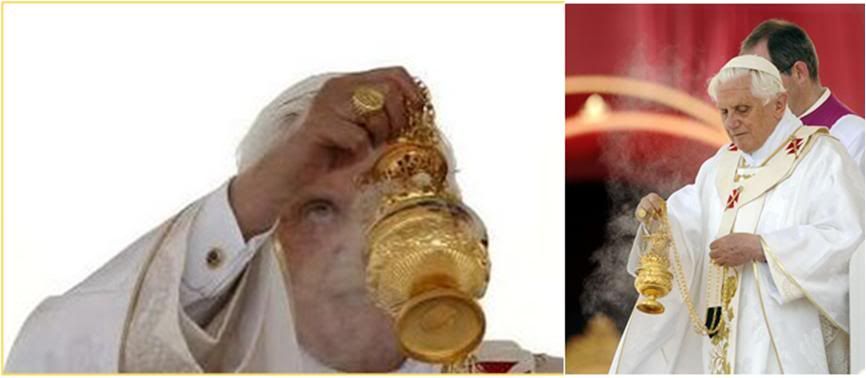 No other photos of the Mass itself other than the two above.
No other photos of the Mass itself other than the two above.
Before the Mass ended, the Pope read a prayer consecrating the priests of the world to Mary, as he had done in Fatima earlier. For the occasion, the venerated image of Mary 'Salus Populi Romani' (Salvation of the Roman People) was brought to St. Peter's from its shrine in Santa Maria Maggiore.
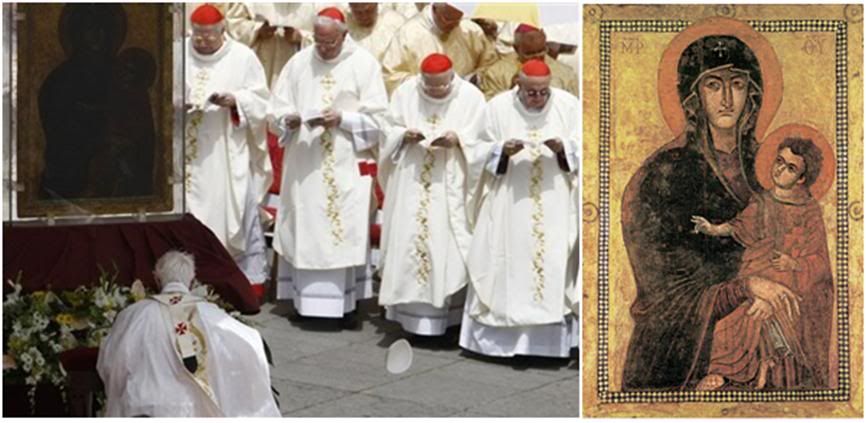
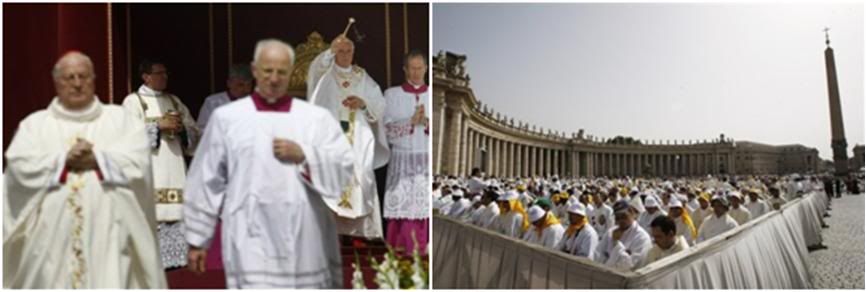
PRAYER OF CONSECRATION
Immaculate Mother,
in this place of grace,
called together by the love of your Son Jesus
the Eternal High Priest, we,
sons in the Son and his priests,
consecrate ourselves to your maternal Heart,
in order to carry out faithfully the Father’s Will.
We are mindful that, without Jesus,
we can do nothing good (cf. Jn 15:5)
and that only through him, with him and in him,
will we be instruments of salvation
for the world.
Bride of the Holy Spirit,
obtain for us the inestimable gift
of transformation in Christ.
Through the same power of the Spirit that
overshadowed you,
making you the Mother of the Saviour,
help us to bring Christ your Son
to birth in ourselves too.
May the Church
be thus renewed by priests who are holy,
priests transfigured by the grace of him
who makes all things new.
Mother of Mercy,
it was your Son Jesus who called us
to become like him:
light of the world and salt of the earth
(cf. Mt 5:13-14).
Help us,
through your powerful intercession,
never to fall short of this sublime vocation,
nor to give way to our selfishness,
to the allurements of the world
and to the wiles of the Evil One.
Preserve us with your purity,
guard us with your humility
and enfold us with your maternal love
that is reflected in so many souls
consecrated to you,
who have become for us
true spiritual mothers.
Mother of the Church,
we priests want to be pastors
who do not feed themselves
but rather give themselves to God for their brethren,
finding their happiness in this.
Not only with words, but with our lives,
we want to repeat humbly,
day after day,
Our “here I am”.
Guided by you,
we want to be Apostles
of Divine Mercy,
glad to celebrate every day
the Holy Sacrifice of the Altar
and to offer to those who request it
the sacrament of Reconciliation.
Advocate and Mediatrix of grace,
you who are fully immersed
in the one universal mediation of Christ,
invoke upon us, from God,
a heart completely renewed
that loves God with all its strength
and serves mankind as you did.
Repeat to the Lord
your efficacious word:
“They have no wine” (Jn 2:3),
so that the Father and the Son will send upon us
a new outpouring of
the Holy Spirit.
Full of wonder and gratitude
at your continuing presence in our midst,
in the name of all priests
I too want to cry out:
“Why is this granted me,
that the mother of my Lord should come to me?” (Lk 1:43).
Our Mother for all time,
do not tire of “visiting us”,
consoling us, sustaining us.
Come to our aid
and deliver us from every danger
that threatens us.
With this act of entrustment and consecration,
we wish to welcome you
more deeply, more radically,
for ever and totally
into our human and priestly lives.
Let your presence cause new blooms to burst forth
in the desert of our loneliness,
let it cause the sun to shine on our darkness,
let it restore calm after the tempest,
so that all mankind shall see the salvation
of the Lord,
who has the name and the face of Jesus,
who is reflected in our hearts,
for ever united to yours!
Amen!
Before the Holy Father left St. Peter's Square, he toured the audience sectors once more in the Popemobile.
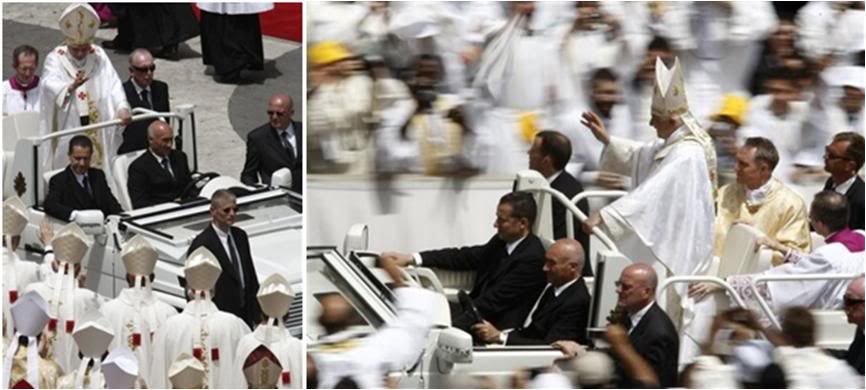
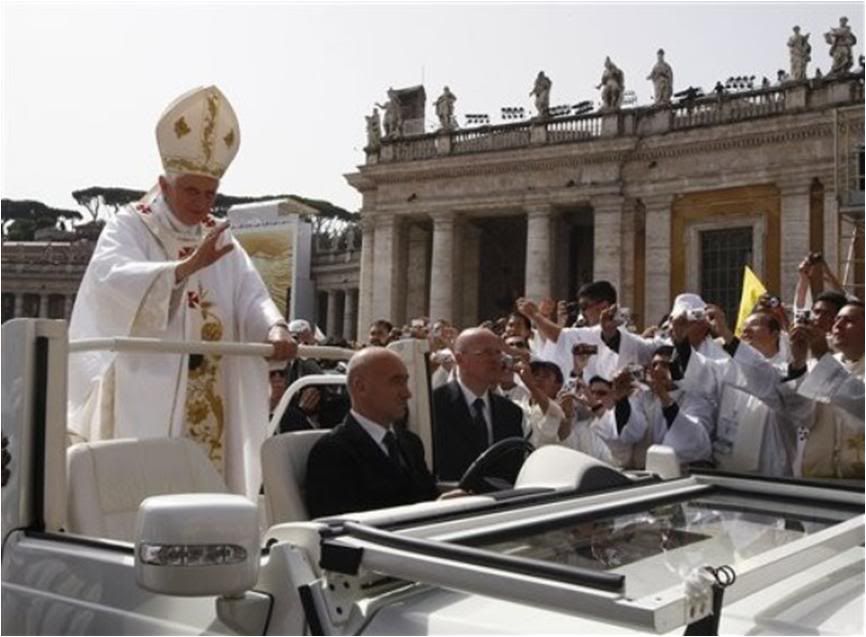 HISTORICAL NOTE: With 15,000 priests concelebrating, this was not just the largest assembly of priests ever, but also the largest concelebrated Mass since concelebrations came to be practised by the Church.
HISTORICAL NOTE: With 15,000 priests concelebrating, this was not just the largest assembly of priests ever, but also the largest concelebrated Mass since concelebrations came to be practised by the Church.
[Modificato da TERESA BENEDETTA 12/06/2010 17:32] |
| |
 11/06/2010 21:57 11/06/2010 21:57 |
|
| | | OFFLINE | | Post: 20.375
Post: 3.015 | Registrato il: 28/08/2005
Registrato il: 20/01/2009 | Administratore | Utente Master | |
|
 I don't know just how to classify this news report, othert than as a 'Roman curio'! It's unimportant in substance, but the idea that the Pope's telephone calls can be tapped is disconcerting, to say the least.
Italian police tape phone calls from
I don't know just how to classify this news report, othert than as a 'Roman curio'! It's unimportant in substance, but the idea that the Pope's telephone calls can be tapped is disconcerting, to say the least.
Italian police tape phone calls from
the Pope and Hillary Clinton while
tapping a corruption suspect's lines
Calls were made during the earthquake relief
efforts in L'Aquila last year
By Nick Pisa

June 11, 2010
Pope Benedict XVI has become the first Pope to be recorded during a corruption investigation by Italian police, it emerged yesterday.
The leader of the world's two billion Roman Catholics was unwittingly recorded by officers who were listening in on a suspect's mobile phone conversations.
The Pontiff made four telephone calls to Italy's civil protection chief Guido Bertolaso following last year's devastating earthquake in the centre of the country which left 300 people dead.
Bertolaso is at the centre of a corruption probe involving sexual favours and back handers for reconstruction projects in the L'Aquila region which was hit by the earthquake 14 months ago.
Pope Benedict is not suspected of any wrongdoing [It goes withgout saying!] - although Vatican officials are said to be furious that he was secretly taped - while it has also emerged that US Secretary of State Hillary Clinton was also recorded speaking to Bertolaso.
Both had called Bertolaso to offer support and thanks for the efforts of his civil protection team who were providing rapid reaction relief in the devastated area.
Officers monitoring Bertolaso's mobile telephone were stunned when they heard the Pope's private secretary Georg Ganswein call and say: 'Hello. I have His Holiness the Pope on the line for you.'
The details of Pope Benedict's intercepted calls emerged in several Italian newspapers but the content was not reported although it is believed to have been fairly mundane and complimentary.
However a Vatican insider said: 'To think that someone recorded Pope Benedict without him knowing is outrageous even if it is part of a police investigation.'
A police source said: 'The tapes containing the recordings of Pope Benedict and Mrs Clinton have been destroyed as they had no significance in the investigation of Bertolaso.'
Italians have gotten used to reading wiretaps during police investigations, which have cauught out several big names including controversial Italian Prime Minister Silvio Berlusconi.
It is estimated that during the last ten years 30 million telephone calls have been secretly recorded by police and intelligence agencies across the country as part of various investigations.
Three years ago Berlusconi was famously recorded calling a TV chief and asking him to give parts to his favourite actresses who he described as 'my little butterflies'.
Yesterday the Italian Senate (Upper House) passed a confidence vote on the telephone interception bill by 164 to 25 and it will now go to the Lower House for final approval.
Berlusconi's centre right majority won handsomely after the centre left opposition walked out in protest as they were called to vote describing the the bill as a 'gagging law'.
The bill would drastically reduce the justification for wire taps and also make publishing their contents in newspapers a crime.
Opposition MPs and newspapers have criticised the bill which they say is merely an attempt by Berlusconi to protect himself from future investigations - he is currently facing two corruption probes.
If passed the law will mean that special permission is needed to tap a member of the clergy or MP.
Today/yesterday, oe one from the American Embassy in Rome was immediately available to comment on Mrs Clinton's intercepted telephone call while a Vatican spokesman declined to comment officially.
[Modificato da TERESA BENEDETTA 11/06/2010 22:00] |
| |
|
|
|
|